














I spent the first week of March break in Germany and England visiting with many wonderful Westminster alumni, spanning multiple decades. A highlight of the trip was an enlightening and inspiring visit to Uppingham School, which was a critical source for William Cushing’s conception of Westminster.
Uppingham, founded in 1584, remained a small, parochial school until Reverend Edward Thring took leadership in 1853 and evolved the one-room schoolhouse into a highly successful, well-known British public school. Thring, a prolific writer of educational philosophy, imbued Uppingham with an innovative pedagogical approach that focused on the education of all students; an expanded curriculum that included history, science, languages, art and music; and the importance of daily physical activity. An educational pioneer in his day, Thring believed that education must include the moral and spiritual well-being of students. It is on Thring’s pedagogical approach that William Lee Cushing built Westminster. Notably, both Thring and Cushing evolved the educational experience of their students in response to the world in which they were living, and both men continued to improve those practices throughout their storied careers.
In many ways we find ourselves in a similar position to that of Thring and Cushing: How do we best educate students for the
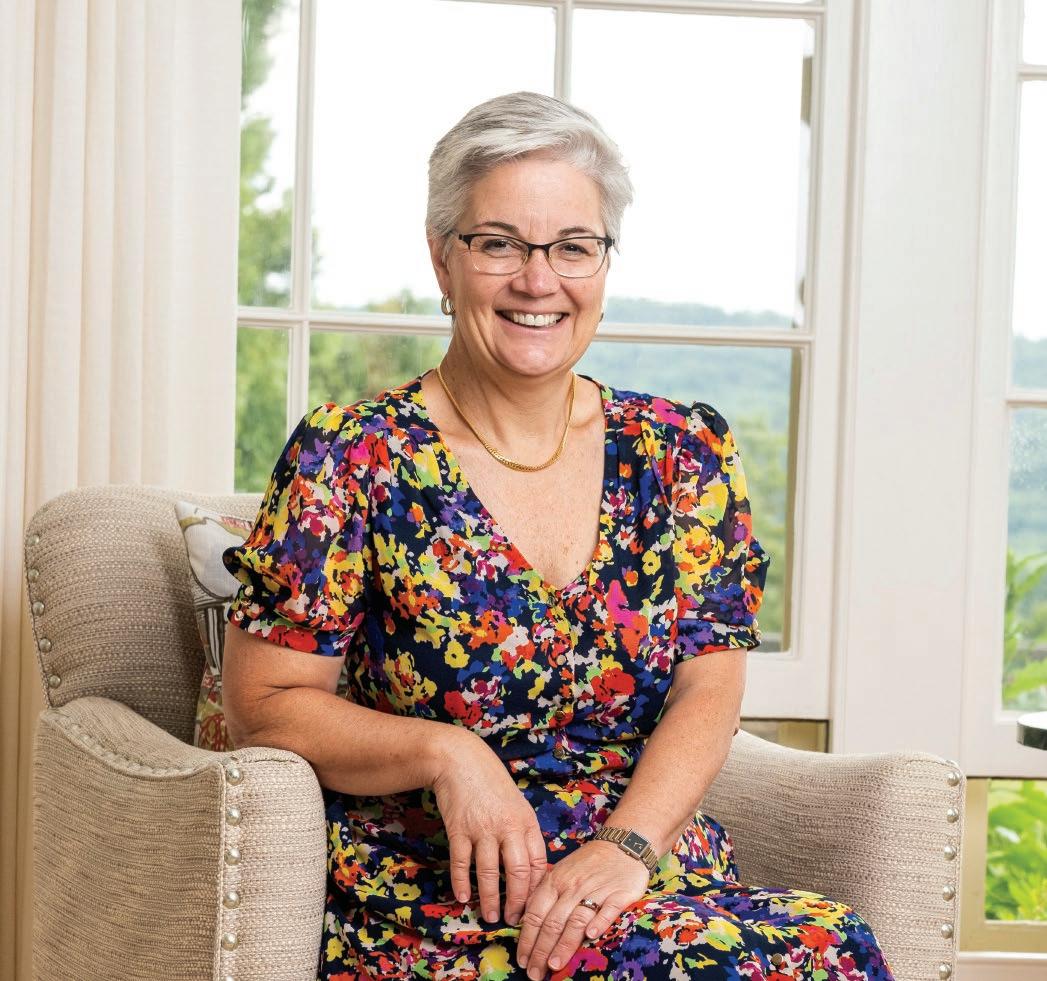
world in which they will be living? How do we create a student experience that meets the needs of where they currently are in their lives and prepares them for what the world will ask of them and what the world will need from them? Those questions
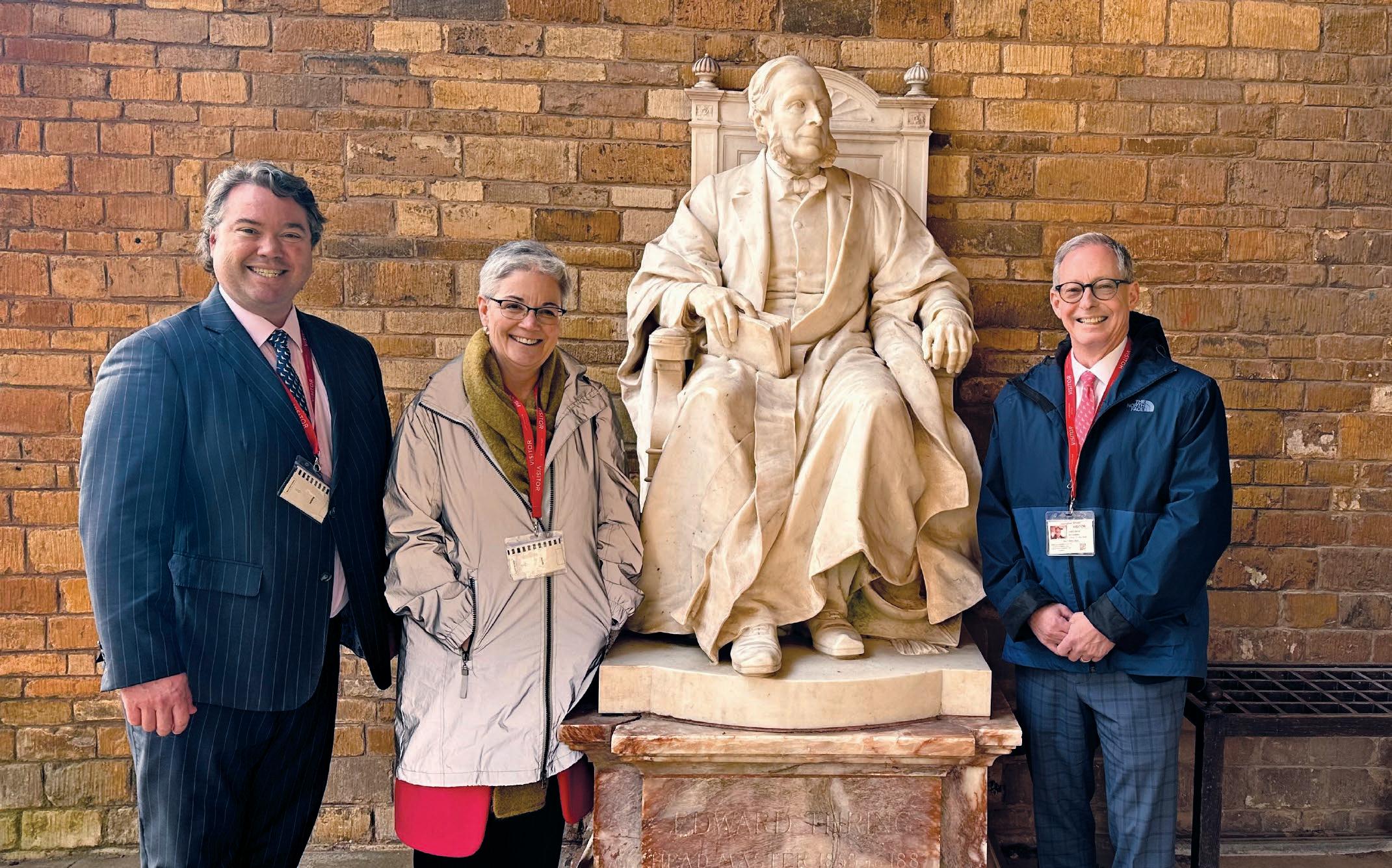
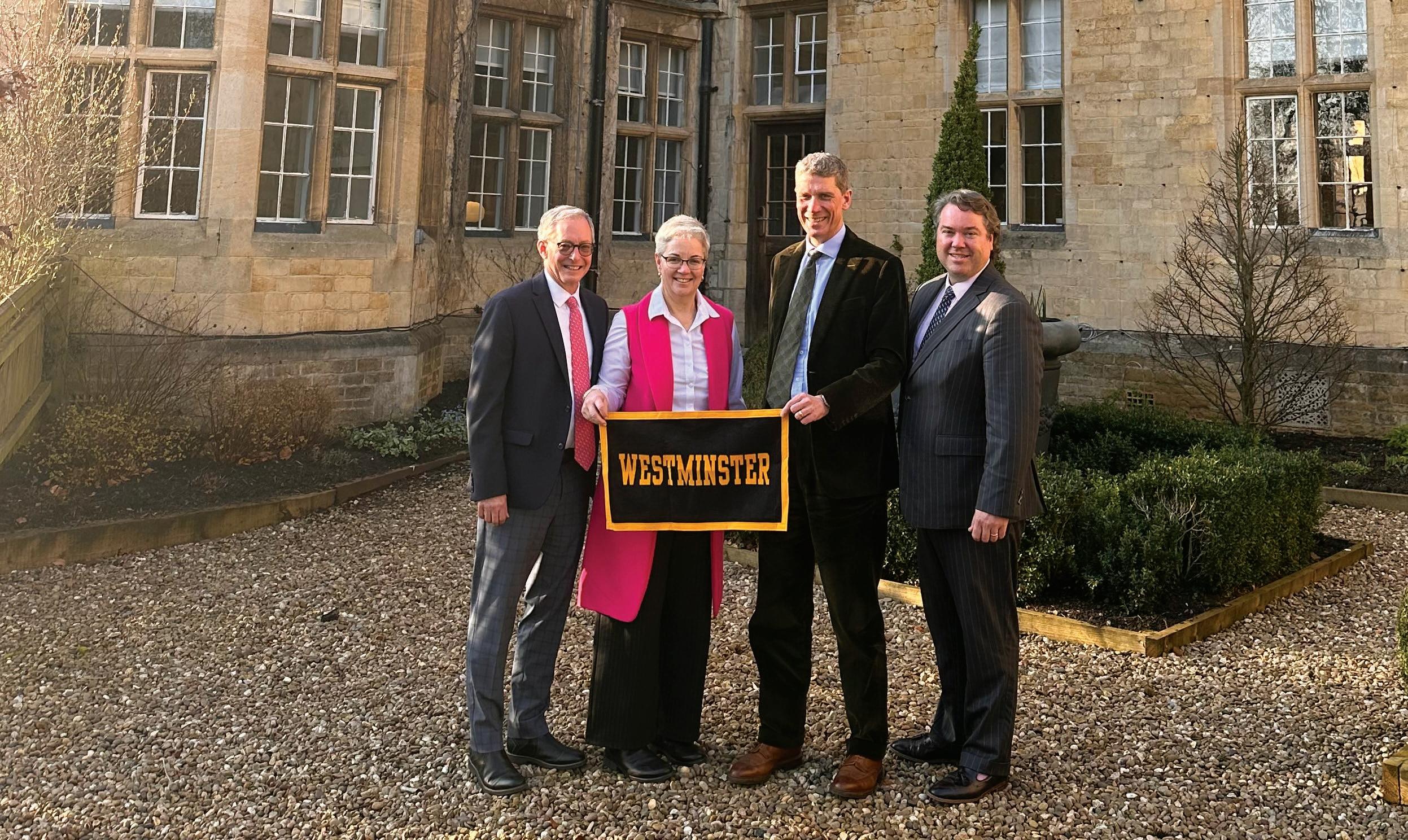
provided the groundwork for the most recent iteration of strategic school planning, a process that we began in the late spring of 2022.
Co-chaired by Board Chair Renée Lynch Carrel ’84, P’19, ’21 and Associate Dean of Faculty Charlie Griffith P’11,’14, ’17, the strategic planning process engaged with a wide spectrum of our school community to solicit input and perspective and to identify broad themes around Westminster’s strengths and its opportunities for growth.
How do we create a student experience that meets the needs of where they currently are in their lives and prepares them for what the world will ask of them and what the world will need from them?”
Those themes became the foundation for the five strategic initiatives that emerged from the process: Invest in Faculty and Staff; Advance Academics; Cultivate Community and Culture; Elevate the Co-Curricular Experience; and Secure the Future. The Board of Trustees endorsed the initiatives in the fall of 2023, and we are in the early stages of prioritizing key action steps and formulating an intentional implementation plan.
The visit to Uppingham School reinforced what our 20222023 strategic planning process had affirmed: Our focus for the immediate future rests on people and programs, which is a key part of the foundation upon which William Cushing built this school. The strengths of Westminster are grounded in the
relationships between faculty and students, a holistic approach to education and a commitment to grit and grace. We are incredibly fortunate to approach the future from a position of considerable strength, as we explore new ways to evolve and advance our program to ensure that we remain competitive in the independent school marketplace — and continue to meet our mission in an educational landscape and world driven by unprecedented change. It is not a coincidence that Reverend Edward Thring and our own William Lee Cushing faced similar challenges, and it is inspiring to realize that our success, as theirs did, will come from staying focused on that which is most important –– the experience of our students. What an exciting and inspiring time for Westminster!
With grit, grace and gratitude,
 Elaine White Head of School
Elaine White Head of School
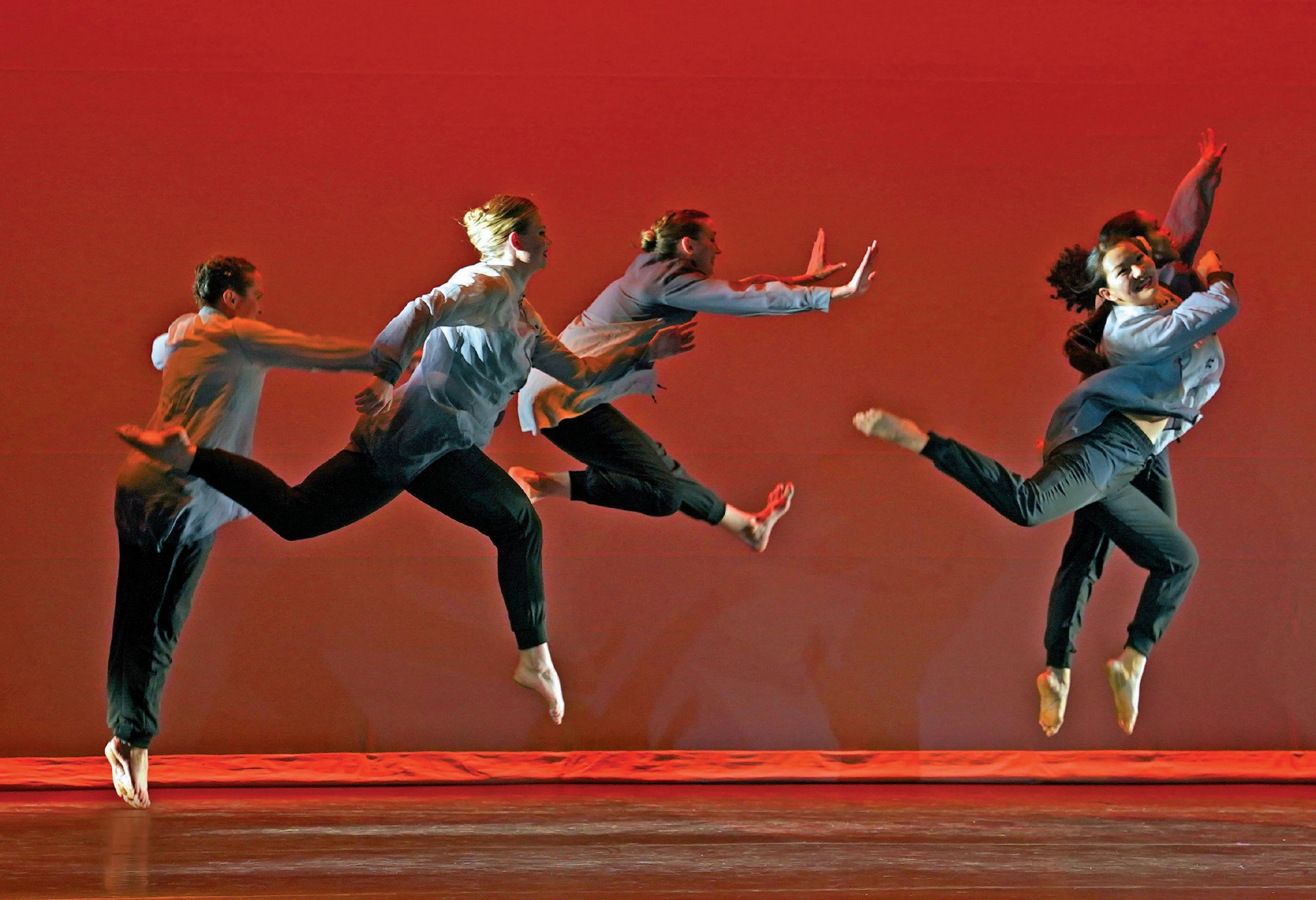
On Dec. 7, SYREN Modern Dance, a New York City dance company that explores the intersection of science and art, performed for the Westminster community on the Booker T. Bradshaw Jr. Stage in the Werner Centennial Center. Kate Sutter, an artistic director with SYREN and a dance instructor at Westminster, choreographed “Ticktock,” a nonstop 50-minute performance, using constant movement as a study of time and space. Dr. Paul Sutter, an astrophysicist, collaborated on the piece, appearing onstage and narrating sequences that explored physics theories, including Einstein’s theory of relativity.
Following the performance, physics students participated in a Science in Motion workshop with the company, creating dance movements related to physics concepts.
The enrichment program and the interactive exercise acted like a “bridge for students who love the arts and dance and those who love physics, allowing each group to step into the other’s space,” said science instructor Susie Bailey, whose class participated in the workshop.
The special program was part of the Graham Gund ’59 Visiting Artists Series, sponsored by the Gund family in honor of Graham Gund ’59
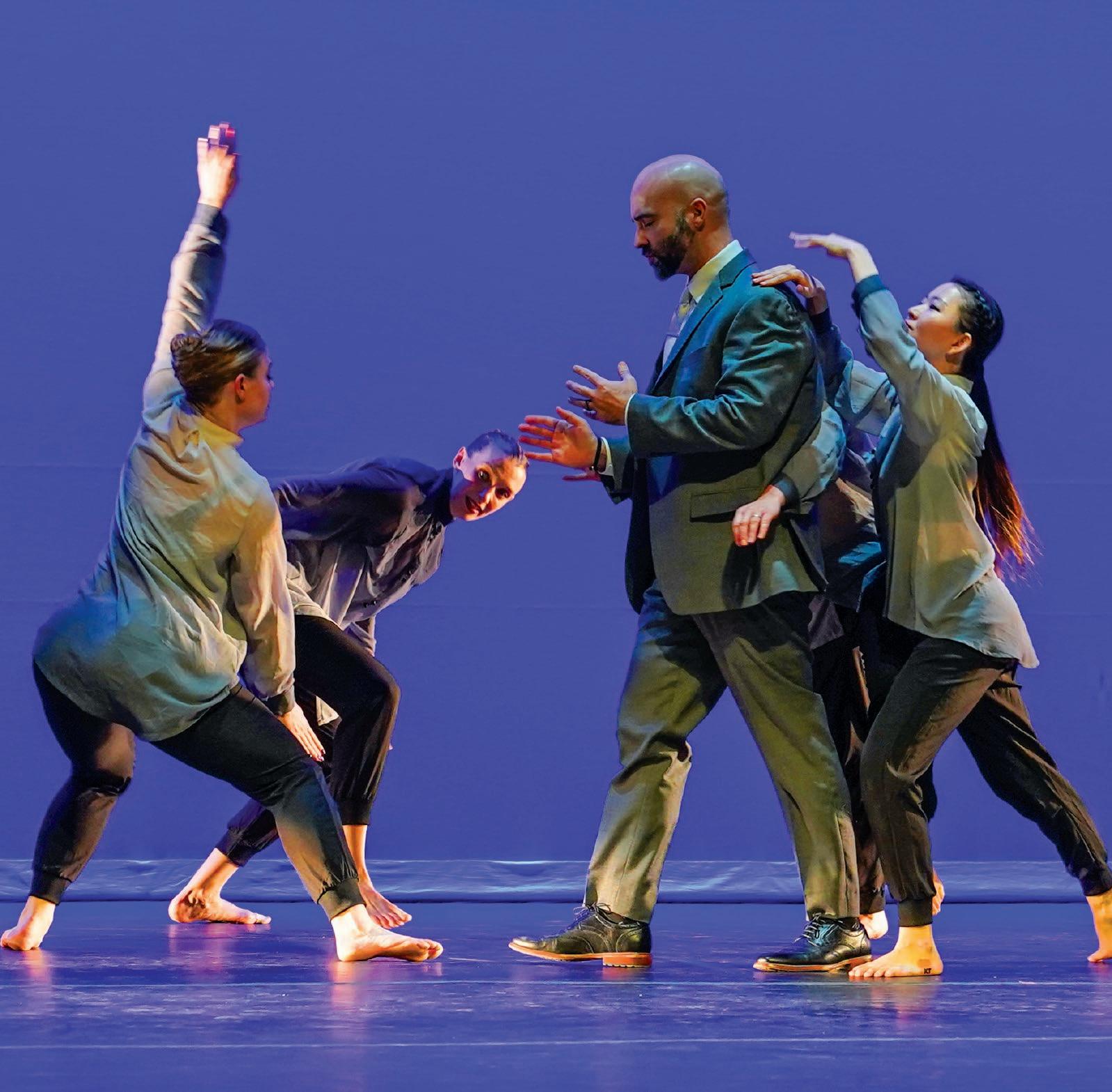
On Jan. 3, Dr. Matthew Biel, vice chair and chief of the division of child and adolescent psychiatry at Georgetown University Hospital and professor in clinical psychiatry and pediatrics at Georgetown University School of Medicine, addressed faculty and parents on the mental health challenges facing youth. He is involved nationally in psychiatric education and advocacy for children’s mental health.
Biel fielded questions from Associate Head of School Jessica Keough and Mental Health Program Coordinator Amy Raskind P’25 during a panel discussion in Werner Centennial Center. He provided a perspective on the mental health crisis currently facing adolescents and offered recommendations for how the school and parents can better prepare students for challenges they might face.
The rise in mental health issues isn’t new and isn’t restricted to youth, according to Biel. He noted that expressions of anxiety, loneliness and isolation among adolescents predate COVID, particularly for girls. “There are trends aligning to influence this; the digital lives of our kids increasingly looks to be causing it. But people, in general, are feeling more overwhelmed by social pressures, financial fears and aspects of the future,” he said.
Some of what we are seeing today has always been here; we just didn’t see it, or know what to call it, said Biel. “But we are now recognizing it, and kids are getting better about recognizing it themselves and coming forward and asking for help.”
The onslaught of social media is here to stay, but Biel advocates for intentional programming, like phone-free time, which is valuable for adolescents and adults.
“We also need to educate kids to be better consumers of the extraordinarily and deeply designed ways that [social media] hijacks kids’ brains,” he said.
He also addressed the college application process and the competing pressures on students to accumulate achievements for their college resume while being mindful of their wellness and mental health.
Much of the anxiety of the college process comes from parents, Biel noted. “We set a trap for kids. We have extraordinary expectations for our kids, and I think a lot of that comes from parents’ own fears,” he said.
The school can play a role in counterbalancing the pressure.
“You have a unique atmosphere here,” he said, noting that the best way to prepare students for the future is by promoting engagement and connectedness within the community.
“Community and relationships,” he said, “are what creates strong foundations for adolescents entering adulthood.”
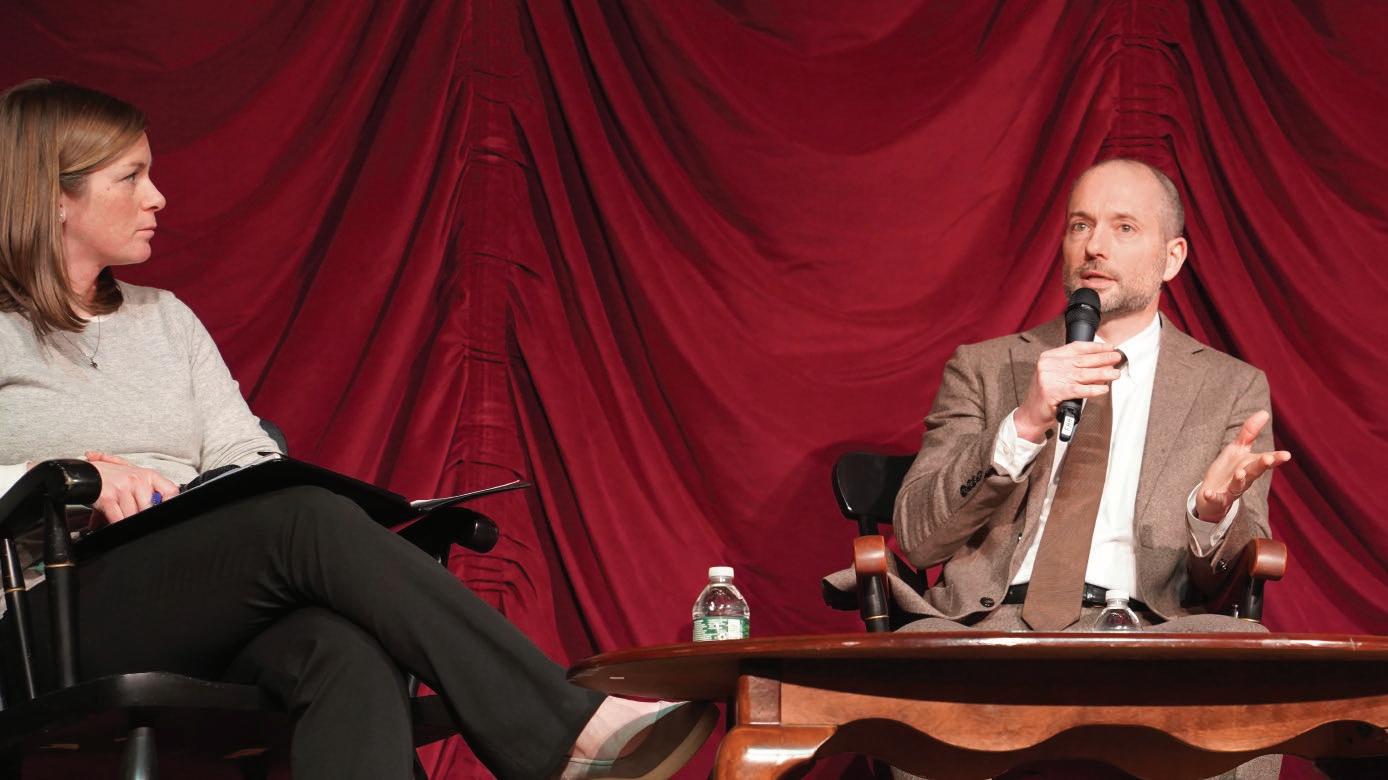
From an invigorating cold plunge to soothing sound therapy, students chose from a wide range of wellness activities during the second Wellness Day, held Jan. 24.
“This year, we added some new activities, so there were some 40 workshops scattered throughout campus. Students were able to experience different self-care activities to support their mental health,” said Amy Raskind, Westminster’s mental health program coordinator.
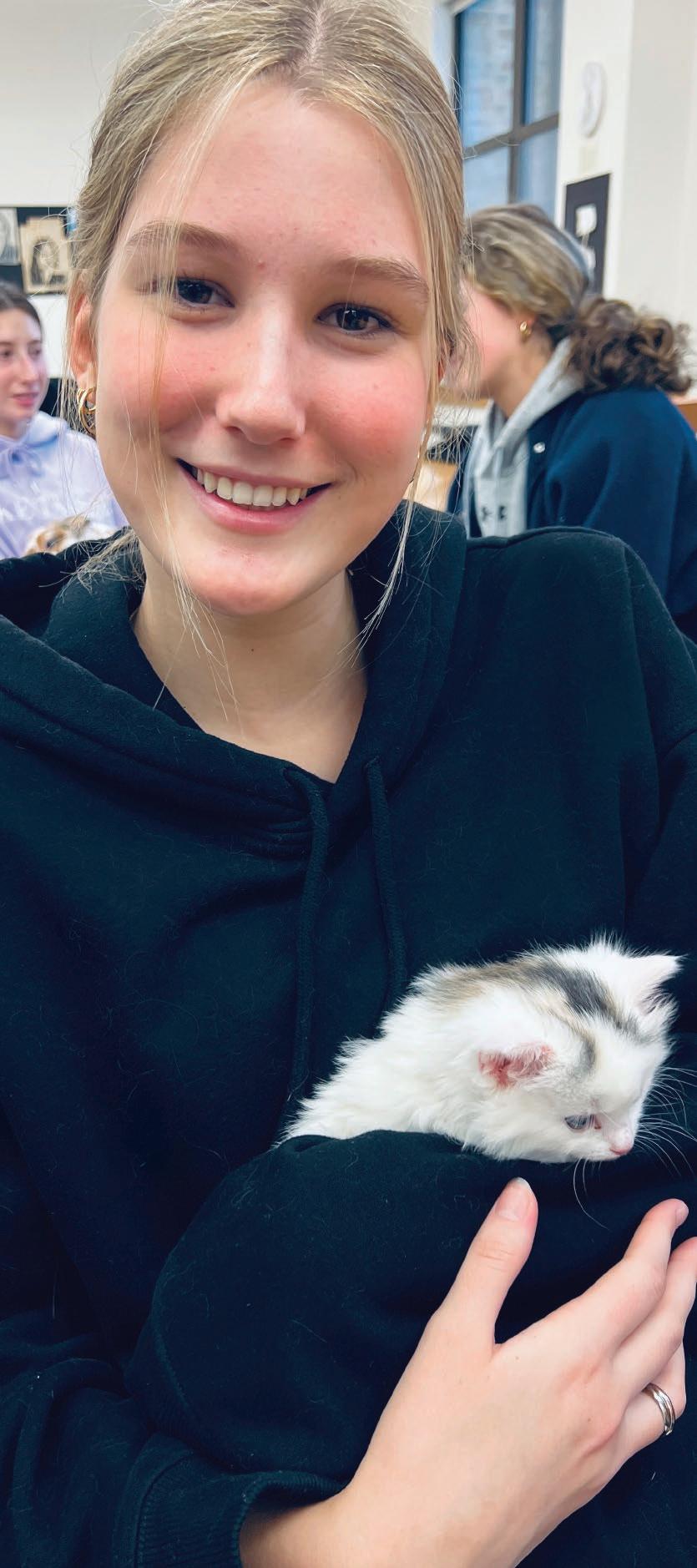
The Westminster community celebrated the life and legacy of Martin Luther King Jr. with a full day of workshops, punctuated by a keynote address by Deacon Art Miller and an a cappella performance by Shades of Yale.
Miller, an author, radio host, revivalist, retired businessman and former director of the Office for Black Catholic Ministries for the Archdiocese of Hartford, grew up on the South Side of Chicago. He was a classmate of Emmett Till, who, in 1955, at the age of 14, was savagely beaten, murdered and dumped in a river by two white men in rural Mississippi, who accused him of whistling at a white woman. At the murder trial, the all-white jury found the two men innocent, which sparked the Civil Rights movement by bringing national attention to the racial violence and injustice in Mississippi.
“Till wasn’t killed because he whistled at a white woman. He was killed because
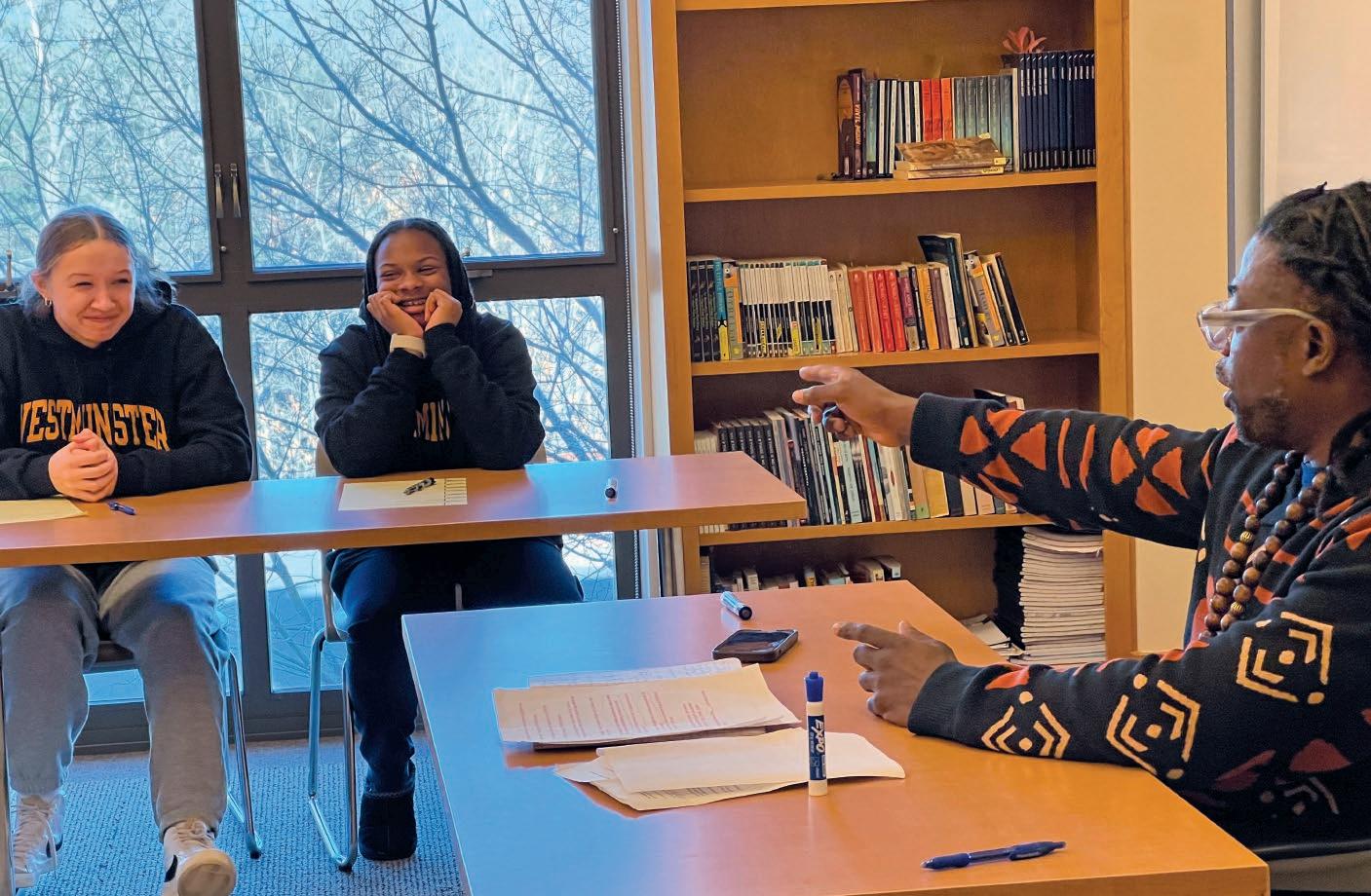
he was in a place of hatred,” Miller said.
At 17, Miller attended a protest organized by King in Chicago, where he was arrested. “I was afraid, but I had to do what was right,” Miller said of the experience.
In his view, to remain silent perpetuates pain. King’s message is about transformation — the ability to change from what we are to what we can be, Miller said.
He called on students to love themselves, seek to be the best version of themselves and to lift each other up.

After the keynote address, students participated in some of the nearly 40 workshops offered in the morning and afternoon that covered a wide range of topics. These included group discussions on individual and cultural identities, social and environmental justice, allyship, and Black scientific achievements and contributions to the field of visual and performing arts.
Special guest Malik Work, a writer, actor, musician and founding member of The Real Live Show, a groundbreaking jazz and hip-hop ensemble, led a workshop on King as a storyteller, poet and performer.
Students also had the opportunity to take part in several off-campus events, including a tour of the tobacco fields in Simsbury where King worked in the summers during his college years. They traveled to Springfield, Mass., to the nonprofit Hope for Youth and Families, where they worked with children in the organization’s youth program.
Dean of Admissions Miles Bailey hosted a special culinary event in his home.
Students prepared a traditional Southern New Year’s Day meal of smoked chicken and pork, black-eyed peas, collard greens and cornbread. After sharing the meal, they discussed the Netflix series “High on the Hog: How African American Cuisine Transformed America.”
Shades of Yale, one of Yale’s premiere a cappella groups, capped off the afternoon with a performance in Andrews Memorial Chapel celebrating the music of the African diaspora and African American tradition.
Racial tension, class conflict and intimacy are recurring themes in the poetry of Tim Seibles. The visiting poet read a selection of his work in an allschool assembly and participated in class discussions Feb. 26-27.
This year marks the 25th that the school has welcomed an acclaimed poet for a two-day visit as part of the Westminster Poet Series, which began in 1999.
Seibles is “a wizard of words, ideas and images,” said former English teacher Michael Cervas, who initiated the Westminster Poet Series and the Friday Nights at Westminster reading series.
Born and raised in Philadelphia, Seibles earned a bachelor’s degree from Southern Methodist University. He is the author of several collections of poetry, including “Voodoo Libretto” (2022). He has written that “poetry, if it’s going to be really engaging, has to be able to come at the issues of our lives from all kinds of angles and all kinds of ways: loudly and quietly, angrily and soothingly, with comedy and with dead seriousness.”

Seibles’ poems sometimes include cartoon imagery, such as “What Bugs Bunny Said to Little Red Riding Hood,” a parody on the children’s story in which the cartoon character warns Little Red Riding Hood about the dangers of standing out in wild places. It’s a cautionary tale in which Bugs is, in fact, as much a villain as the wolf:
I mean, what’s up, doc? Didn’t anybody ever tell you it ain’t smart to stick out in wild places? Friendly? You want friendly you better try Detroit. I mean you’re safe wit me, sweetcakes, but I ain’t a meat-eater.
In life, Seibles reminds us, moments of clarity can arrive at any time, even during a peaceful interlude. In his poem “From Darkness,” the concept of violence strikes like a lightning bolt as his description of daybreak gently unfurls.
Sunrise runs a fresh wind through the leaves, and night turns back into shadows. Waking up, the songbirds tell first light everything they know. Why do we keep killing each other?
In an excerpt from “First Kiss,” Seibles allows the poem to softly unwind and linger, exploring the concept of intimacy through a wondrous, luscious first kiss.
Her mouth fell into my mouth like a summer snow, like a 5th season, like a fresh Eden, like Eden when Eve made God whimper with the liquid tilt of her hips— her kiss hurt like that— I mean, it was as if she’d mixed the sweat of an angel with the taste of a tangerine, I swear.
Seibles’ honors include fellowships from the National Endowment for the Arts and the Provincetown Fine Arts Work Center, as well as an Open Voice Award from the National Writers Voice Project. In 2013, he received the PEN Oakland/ Josephine Miles Award for poetry. He has taught at Old Dominion University, the University of Southern Maine’s Stonecoast MFA program and at Cave Canem in New York City. Seibles lives in Norfolk, Va. From 2016 to 2018, he was Virginia’s state poet laureate.
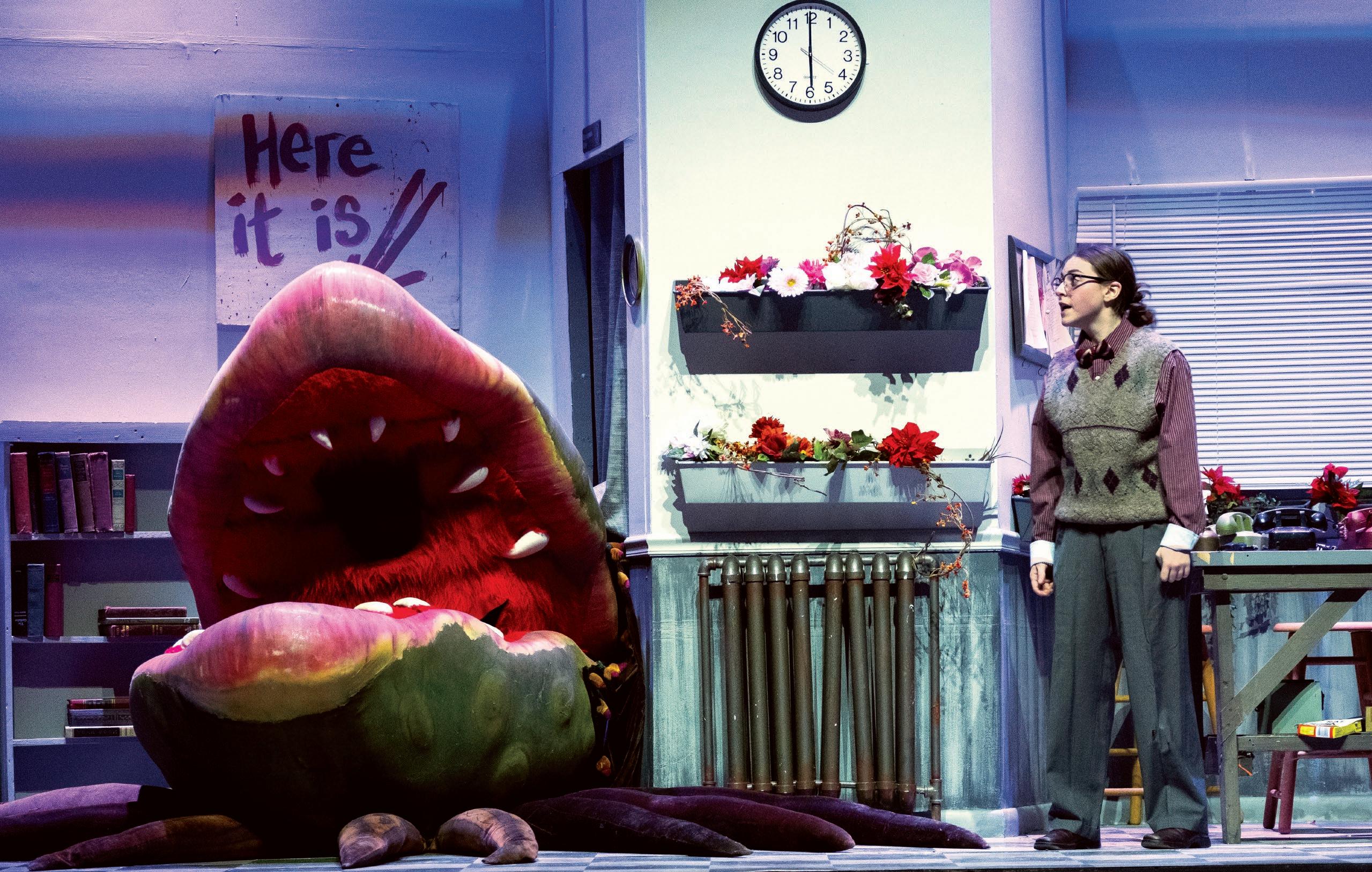
The Westminster Dramat Association performed the wacky comedy musical “Little Shop of Horrors” Feb. 16-18 in the Werner Centennial Center. Not your typical off-Broadway show, the offbeat comedy, set to a toe-tapping musical score, is about a lowly clerk in a flower shop who raises a monstrous, blood-thirsty, rhythm and blues-singing Venus flytrap that gets totally out of control and ends up devouring humans.
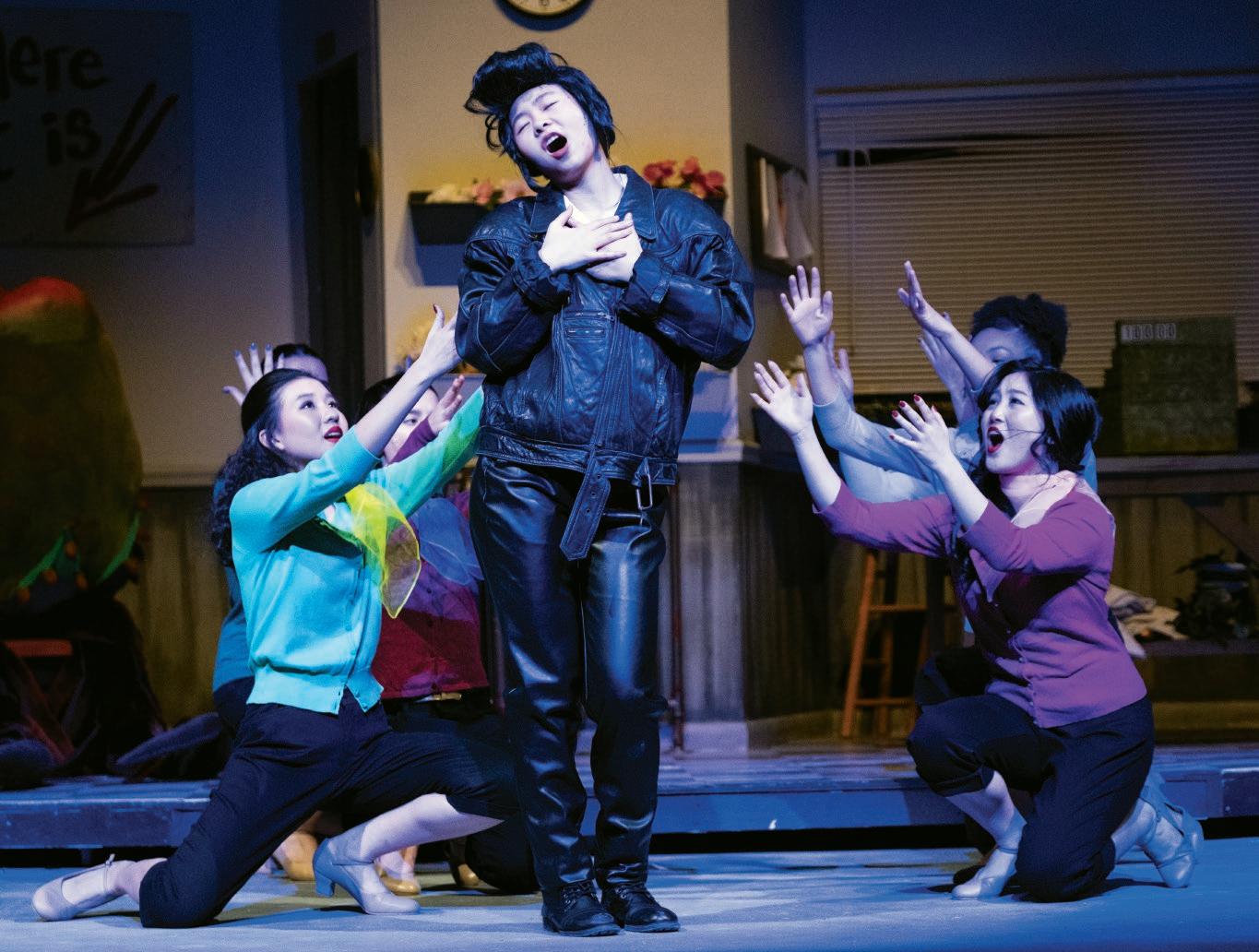

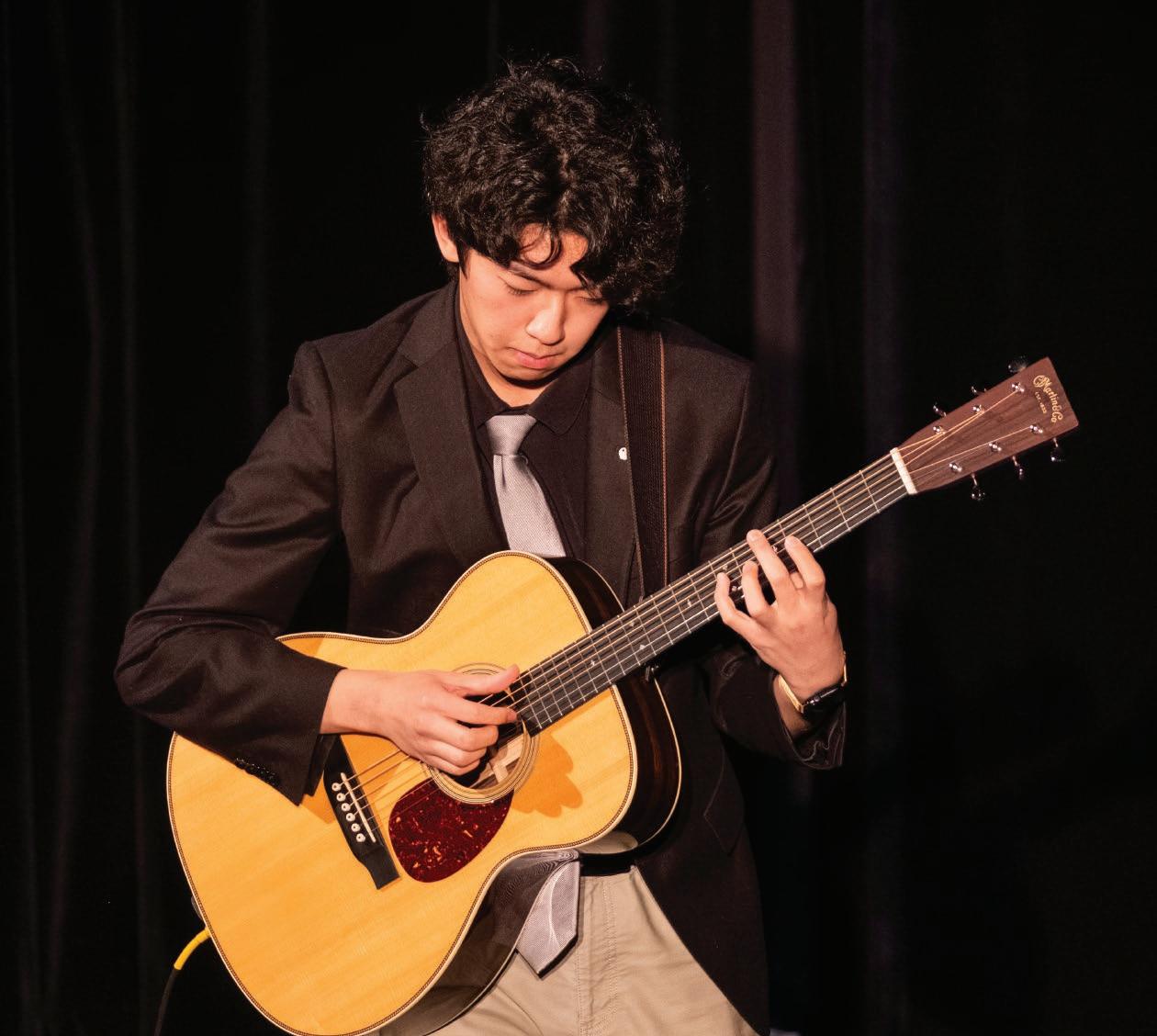
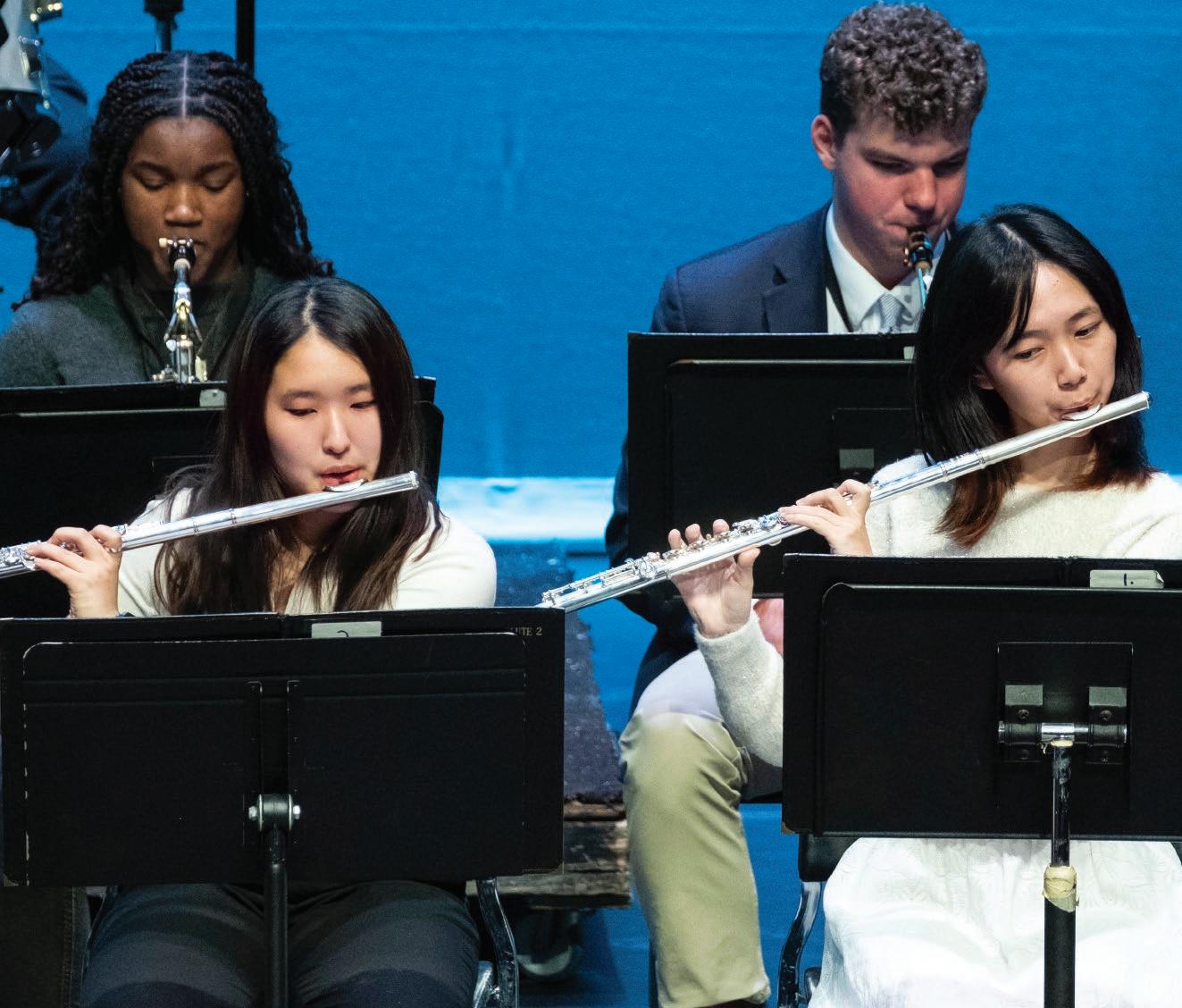

On Feb. 29, members of the Concert Band, Jazz Band, String Ensemble, Westminster Belles, Chamber Choir and Chorale performed in the annual Winter Performing Arts Concert.
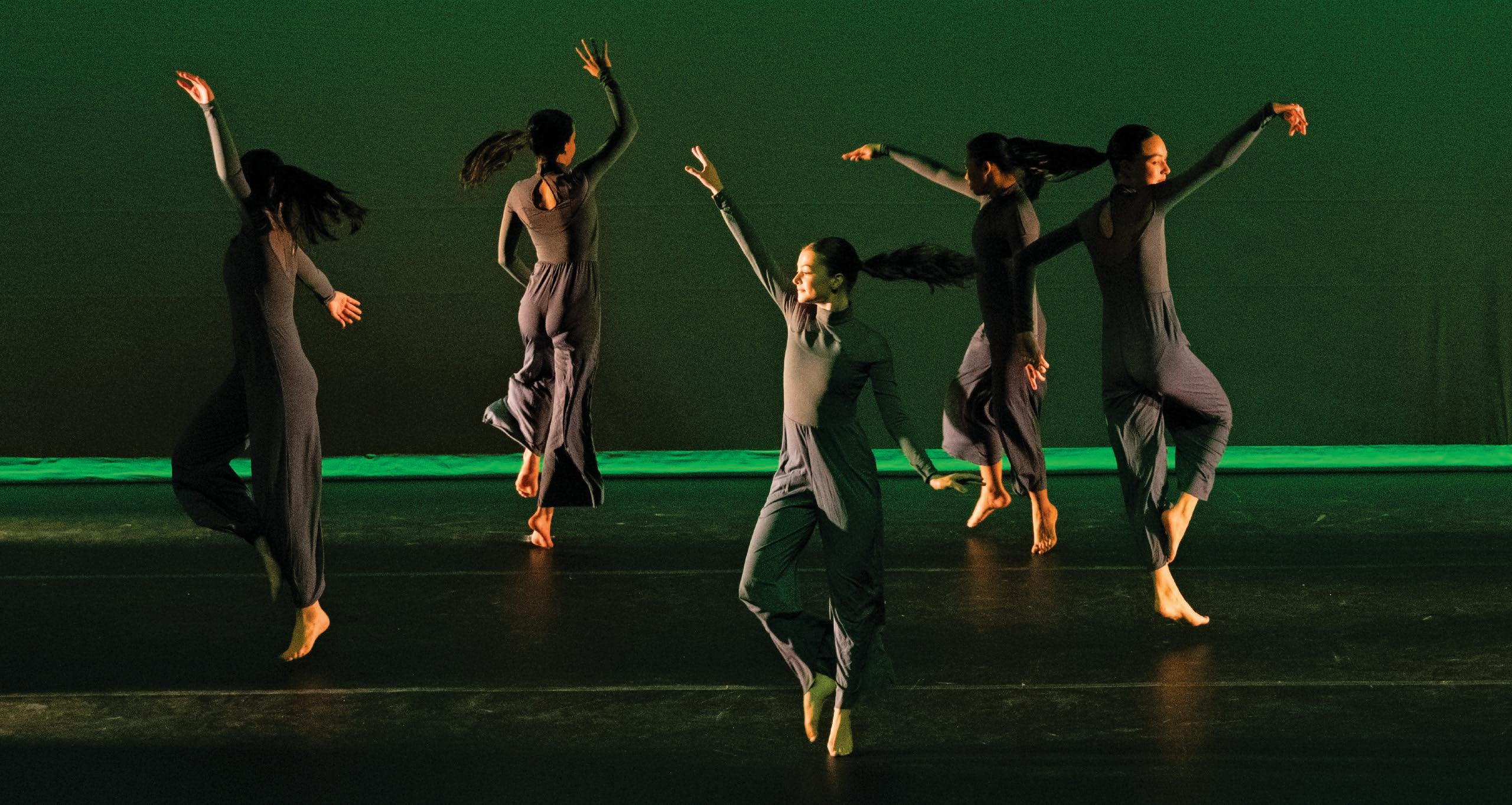
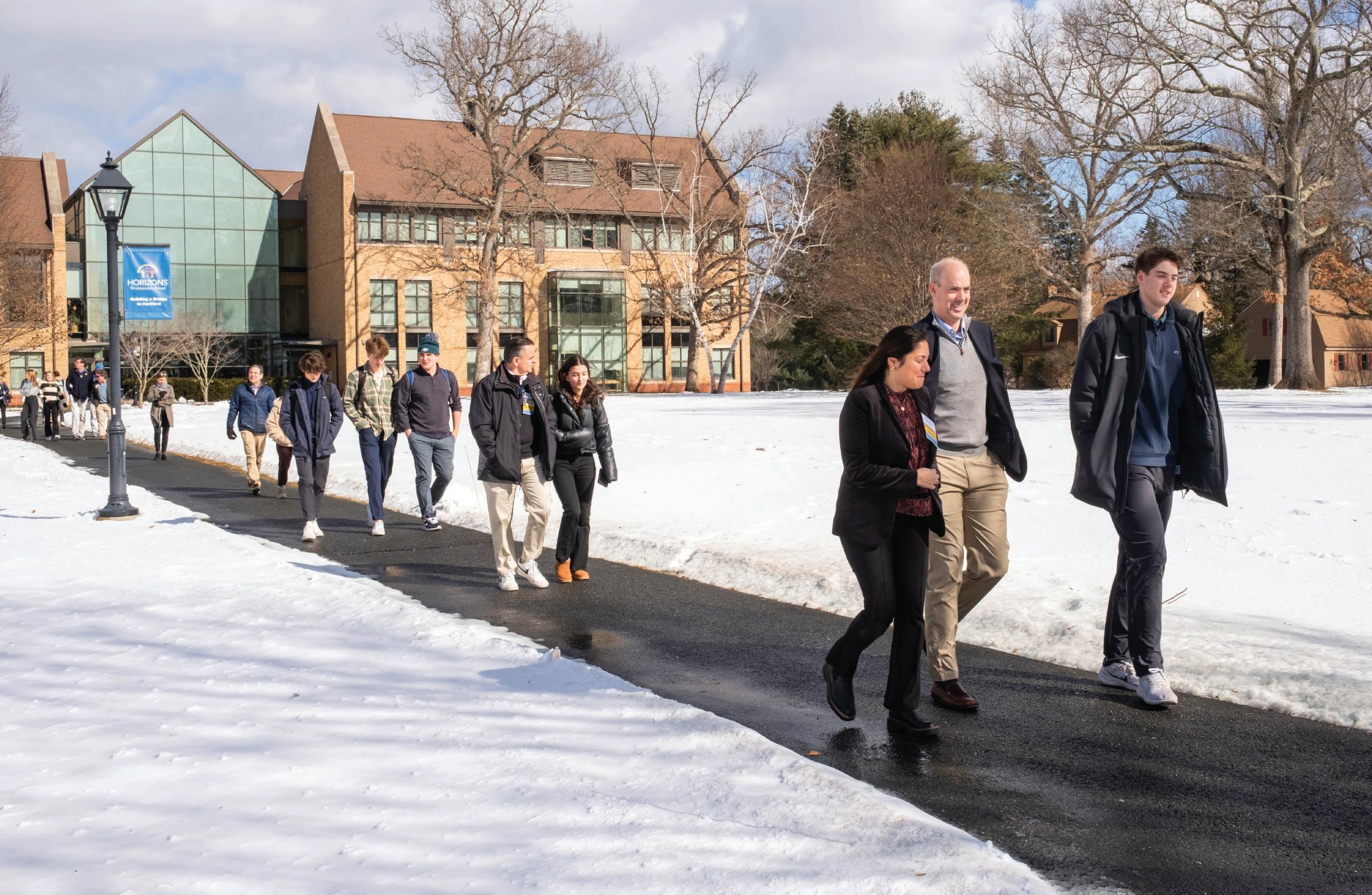
It was a blustery winter wonderland on Williams Hill for Winter Parents and Family Weekend, which took place Feb. 16–17. About 200 parents and family members arrived on campus throughout the day Friday to visit classes, attend form-specific programs, attend the winter musical “Little Shop of Horrors” and cheer on the Black & Gold in athletic contests.
Derrick Logan ’93, his wife, Takia, and their daughter, also named Takia, drove three hours and barreled through a snow squall from their home in New Jersey to visit their son Derrick ’27. It was well worth it, Takia said, not only to see her son, but also to spend time with his friends, speak with teachers and to fully immerse herself in the community.
“Westminster still allows you to parent, and they work very closely with you to keep you a part of the community. [Head of School] Elaine White was very straightforward and up front about how well she is going to get to know your student and how she is going to work with you to keep your child in line with what your vision is for their future. And that
really resonated with me as a mom,” Takia said.
For Derrick Sr., who attended his son’s physics class, the visit to campus was a bit of a walk down memory lane. In physics, he admitted, “I had to dust myself off because it’s been a while, but I work with data, so the math wasn’t so foreign.”
Other parents also expressed appreciation for the opportunity to attend classes and get a picture of what and how their children are learning.
Megan Silliman, who was visiting her daughter, MacKenzie ’26, attended four classes. Afterward, she watched her daughter at hockey practice. For her part, MacKenzie loved having her mom visit classes. “It made the day much more relaxed,” she said.
In between classes and lunch, parents had a chance to admire the student artwork in Baxter Gallery and in Fearn Hall.
Following class visits Friday, parents attended the Chapel program before

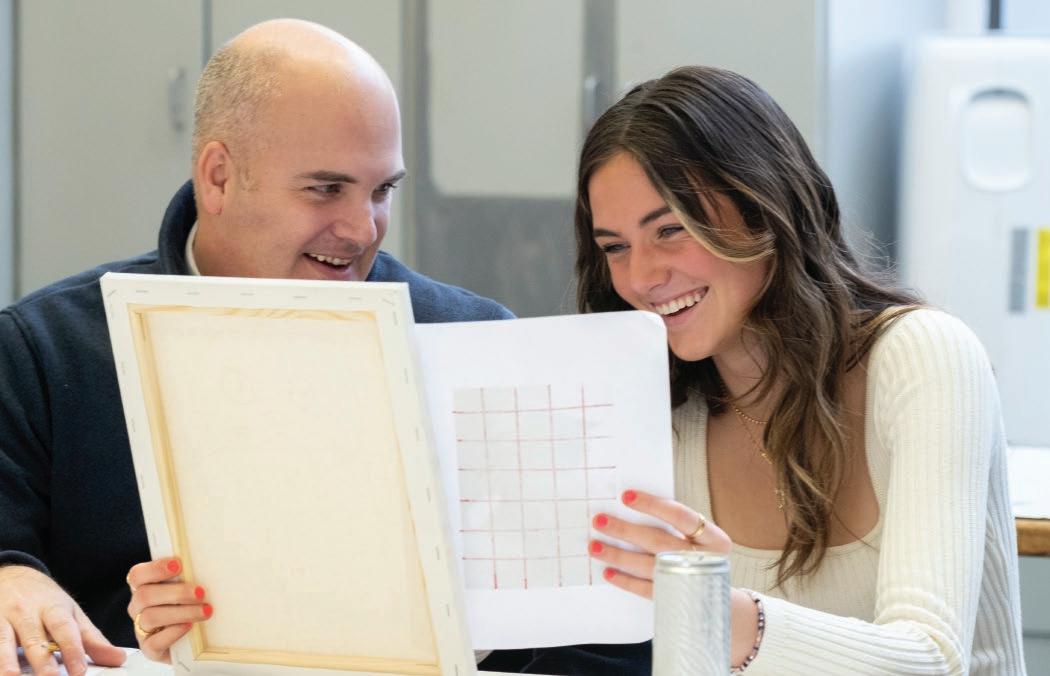
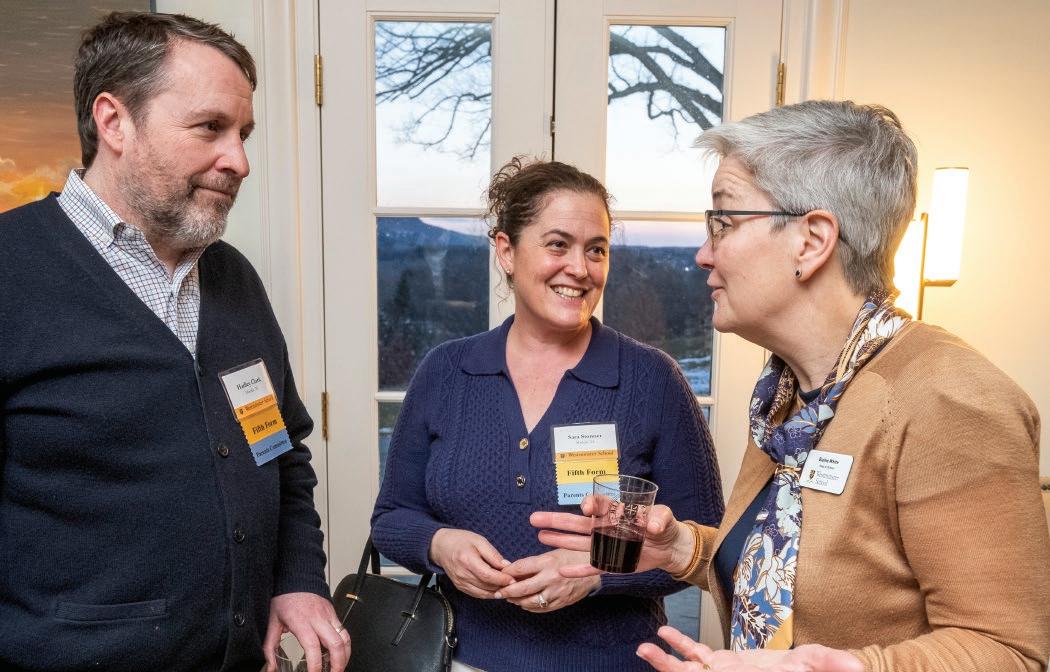

enjoying a buffet lunch in the Gund Dining Room in Armstrong Dining Hall. In the afternoon, Third and Fourth Form parents had the opportunity to attend “Mapping Your Child’s Journey at Westminster,” a panel discussion on how to set your child up for personal success in academics, athletics and extracurriculars while pursuing their unique interests. Fifth Form parents could partake in a “Mock College Admissions Committee,” an interactive exercise for them to learn about the many factors that go into the college admissions process. Sixth Form parents had an introduction to how Westminster engages young alumni after graduation, from college visits to career networking, during a presentation titled “Life Beyond Williams Hill.”
Later in the afternoon, a Parents Reception and Class Gift Kickoff took place at Pratt House. Before the class gift announcement, White told parents that they play a vital role in not only the day-to-day life of the school but also in the rich traditions at Westminster such as the class gift.
Fifth Form Dean Kelly Wosleger said the Class of 2025 has a special bond and enjoys spending time together, which inspired their class gift of a multi-purpose deck, to be located between the paddle courts and hockey rink, that will be a social gathering place.
Kara Lynch P’23, ’25, a member of the Parents Class Gift Committee, noted: “There are two beautiful paddle courts there, but the rest of the area needs some love. And I think this class gift could
really do that and really bring the whole Westminster community there to enjoy it.”
Following the receptions, the community enjoyed dinner before Dramat’s evening performance of “Little Shop of Horrors.”
On Saturday, parents had more opportunities to attend classes, enjoy coffee and conversation with the College Counseling Office and watch more athletic matches before bundling up for the ride home.

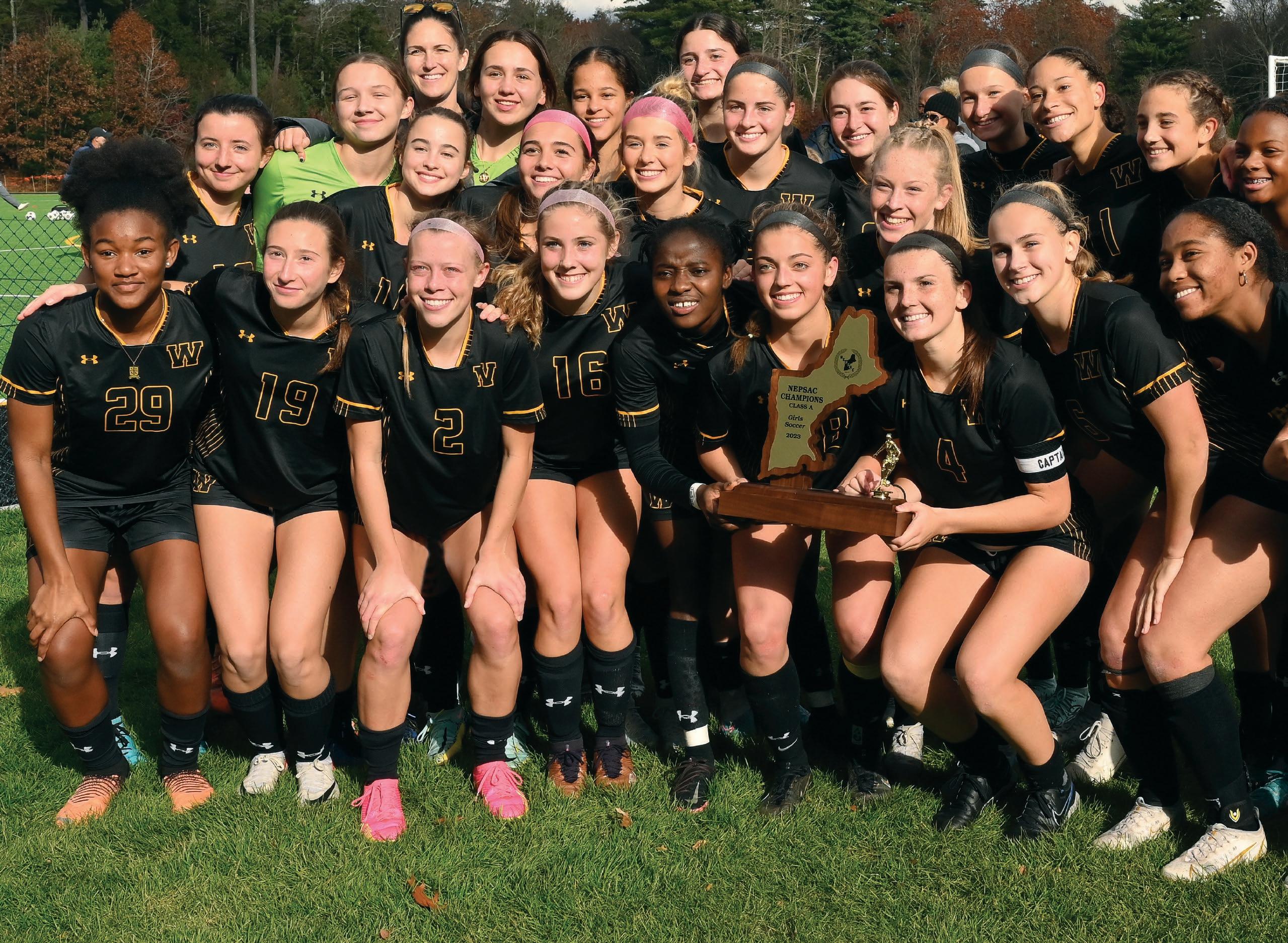
Relentless: the word that epitomized the Westminster girls’ varsity soccer team last fall. The Martlets never stopped their pursuit of a championship, and all their hard work paid off when the team clinched the Class A New England Championship for the first time in the school’s history.
“It was a storybook ending for a group that changed the Westminster girls’ soccer program forever,” said Coach Kelly Wosleger, who was named the 2023 Connecticut Prep Coach of the Year by The New England Soccer Journal this past December.
With a season finish of 17-1-1, the team will go down as one of the best so far in Westminster School athletics. The Sixth Form players went 46-6-2 in their careers, all the more remarkable considering the team did not play freshman year due to COVID.
“To win 46 games and cap it with a New England Class A Championship is really special, but what I am most proud of is the
By Tyler Woslegerwonderful young women I’ve watched them grow into over the last four years,” said Wosleger.
So, what was in the secret sauce that led to the team’s stellar season?
When asked what made the team different, co-captain Jillian Gregorski ’24 said, “Our motivation. Our discipline. Our consistency. We knew what we wanted to do, and we executed it. Every day we were all in.” Gregorski, a midfielder from Wethersfield, Conn., was a powerhouse on the field, earning her a long list of awards during her varsity career, including twotime All-American, 2023 Boston Globe Girls’ Soccer MVP and the 2023 NEPSAC Player of the Year.
Kudos also go to coach Wosleger, who arrived on Williams Hill in the fall of 2017, after coaching collegiate soccer at Princeton University and at Fairfield University. That fall, the Martlets finished with five wins, and 2018 brought only two wins. Teaming up with assistant coach Kelly
Lucas, the coaching duo set forth to make the Martlets one of the best teams in New England. From there, the turnaround was drastic. Through a commitment to recruiting year round, Coach Wosleger turned the Martlets into a contender. While many of the players are from Connecticut, the team has recently included players from Liberia (Blessing Kieh ’24) and Ghana (Priscilla Ameway ’22).
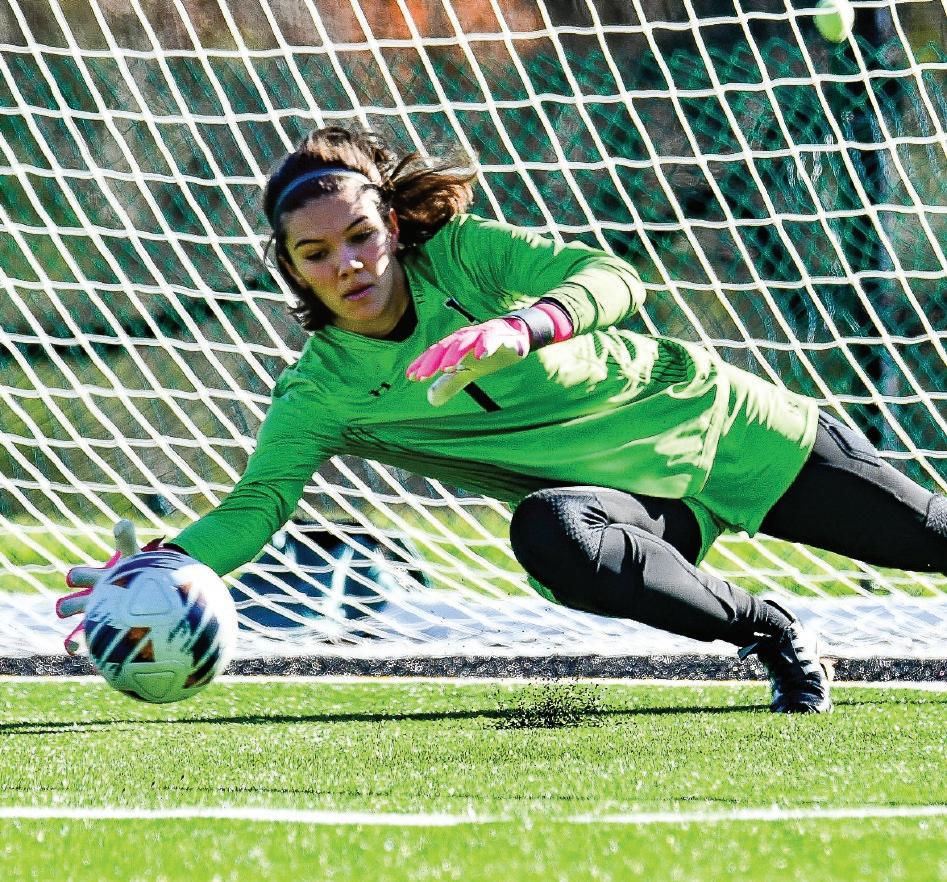
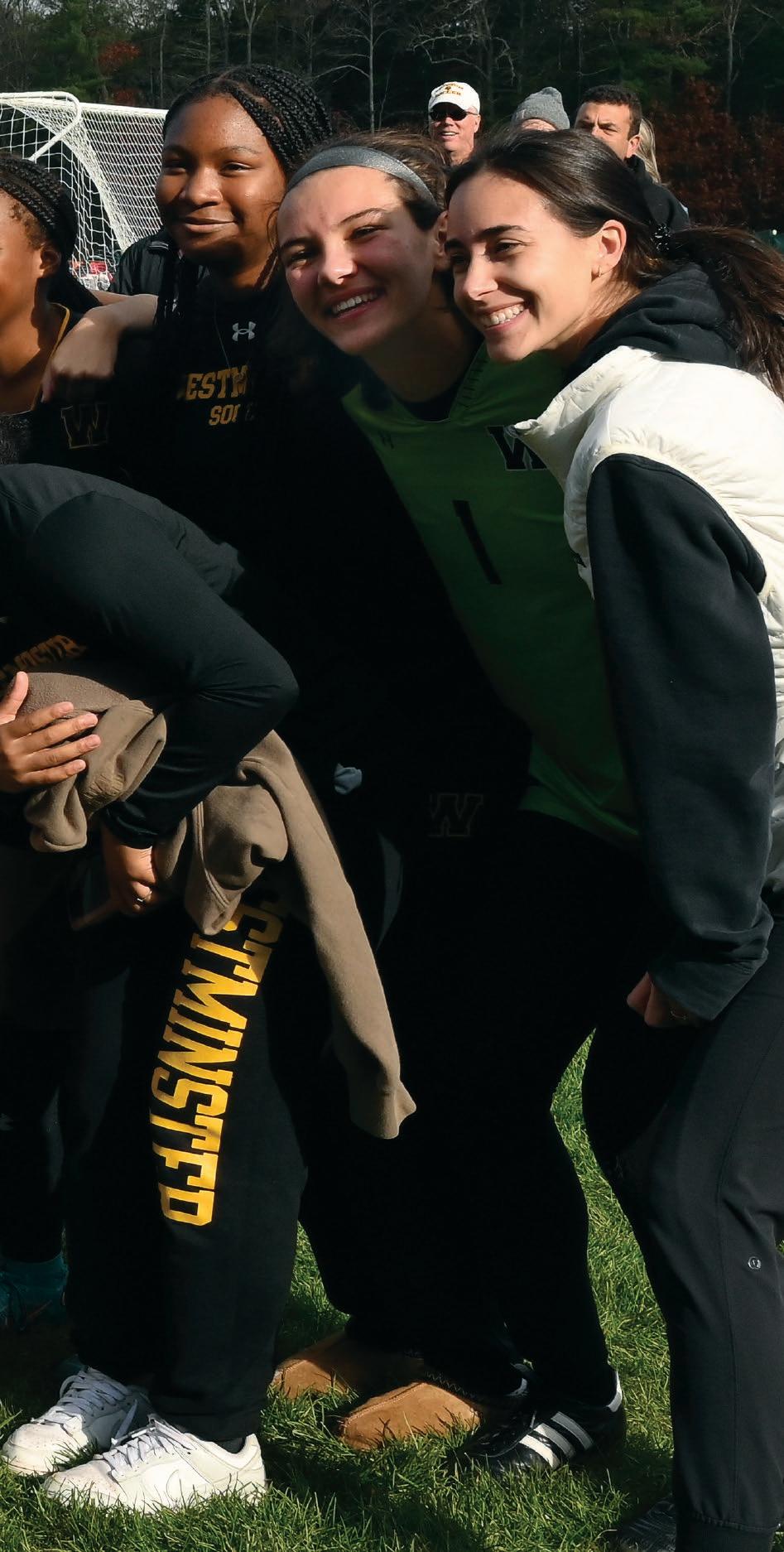
As the popularity of girls’ soccer has grown the last few years, in line with the rapid growth in popularity and visibility of women’s soccer nationally, recruitment has become especially crucial in building a competitive team.
“It is imperative that coaches recruit, have tie-ins to local club teams, and help players play at the collegiate level. We’ve

been fortunate to not only attract really good players but great people to come to Westy. Good players attract other good players to come with them,” Wosleger said.
In addition to strong soccer players, Wosleger looks for multi-sport athletes who will be contributing members of the community. Every year, multiple girls’ soccer players play other sports, including basketball and track, and all the team members make a concerted effort to engage in the Westminster community and the community beyond the Hill.
While talented players, smart recruiting and excellent coaching were key ingredients that led the team to a championship season last fall, grit and determination ultimately propelled it to victory in the championship game against Thayer Academy.
Looking back on the big day, Wosleger knew the team would have to dig deep. A major advantage: the game was played on home turf with the support of the community cheering them to victory.
On that sunny morning on Williams Hill, Gregorski scored in the 29th minute off a corner won by Elysse Cumberland ’24. Despite having chances in the second half, the Thayer keeper stopped Westminster from scoring a second goal. Westy’s defense, anchored by keeper Emme Pacheco-Hager ’25 and Maya Goddard ’26, turned away any Thayer chances, and the Martlets held on for a 1-0 win.
It was a celebration that went on long after the game was over for a team that had come up just short the previous year, losing to BB&N in the championship.
Wosleger summed up the season,
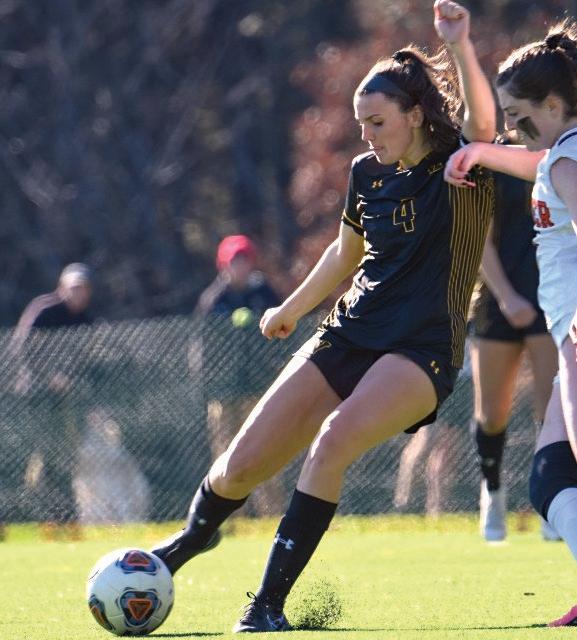

saying: “It was a dream come true to be able to win a New England championship on our home field. This team is truly special, and I am beyond lucky to have the opportunity to be their coach. There is not a more deserving group.”
Director of Athletics Timothy Joncas noted that it was not only a victory for the team; it was also a win for the community and inspiration for all athletes.
“Winning alone is impressive, but winning the right way, valuing teamwork, selflessness, and holding each other to the highest standards both on and off the field is what makes this championship incredibly memorable. Coach Wosleger has not only led that program to the top of the mountain, but she has done so as a high-character coach with high-character student athletes who embody our school’s core values and epitomize Grit and Grace. The members of her team, while incredibly talented soccer players, are even better people. They are the kind of athletes that you want to cheer for not because of their ability alone, but because of what they give to our community off the field. The same is true of the coaching staff.”
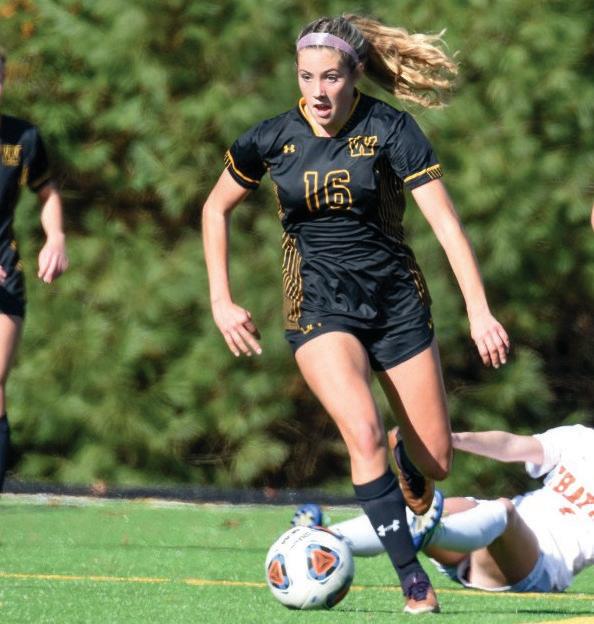
The Westminster field hockey team completed another outstanding season in 2023, earning a spot in the NEPSAC Class A semifinal game and finishing with an overall record of 14-5. The team was led by the seven outstanding Sixth Formers: Sydney Courtmanche, Margaret Dilks, Olivia Emerson, Olivia Gordon, Cassie Goundrey, Margee Mahoney and Sophia Peterson.
Gordon and Goundrey were named to both the WNEPSFHA All-Star game and the NEPSAC Class A All-Tournament team, while Hadley Crowther ’25 and Allysen Whitehead ’25 were named to the Honorable Mention All-Tournament team.
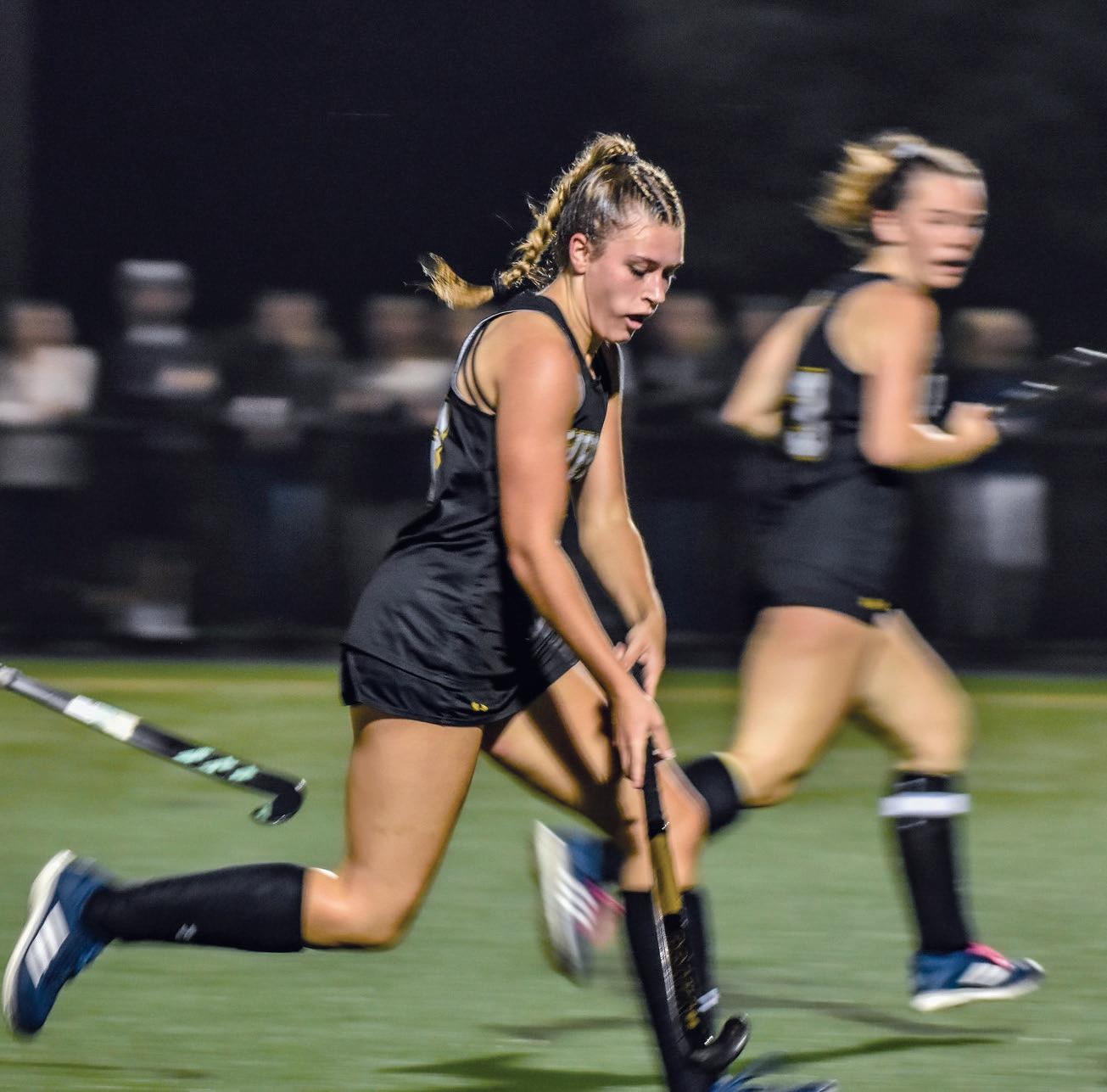

The team had a productive fall season, led by captains Rhys Marschke ’24 and James O’Connell ’25. Season highlights included fun trips to Tariffville Elementary School to run with the elementary-level students, as well as putting on our annual Martlet Mush 5k. Despite a small roster number, the runners all showed marked improvements and camaraderie. Sam Hyde ’25 ended up finishing the season as our fastest runner, and Nick Ramsumair ’27 finished as the top Third Former.
The team, led by captains Madison Khuu ’24 and Hayden Schneider ’25, included a victory against Berkshire and Suffield and seventh place finish at Founders Championship, despite a small roster number. The best team moment was our practice with Girls on the Run — a running program for elementary to middle-school aged girls. Finally, the fall season saw many personal best times for our girls and some astounding overall finishes. Sophia Lazor ’27 was named to both All-Founders and All-New Englands.
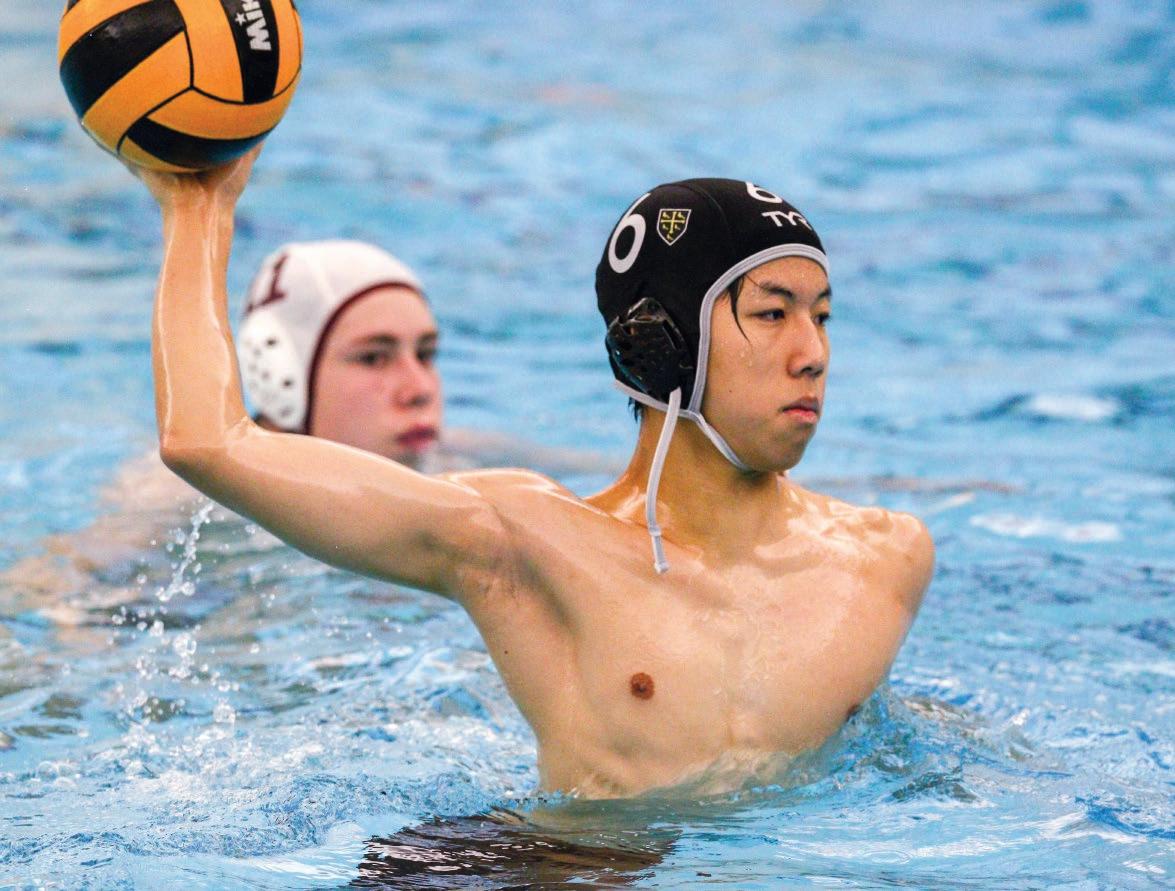
Andrew Pang ’24
The team had an exceptional season, with wins over Wilbraham Monson Academy and Eaglebrook School. Sixth Formers Owen Huang, Wills Erda, Will Whiting, Andrew Pang and Nolan Styspeck pushed hard and set a consistent tone.
A match with Suffield Academy, a team that had outplayed the Martlets historically, was decided by one goal, 12-13. In their final match of the season, the Martlets came from behind against a Loomis team that had defeated them earlier in the season and pushed the contest into overtime. While Loomis beat the Martlets in overtime, the desire to win from the Martlets was strong — they refused to quit.
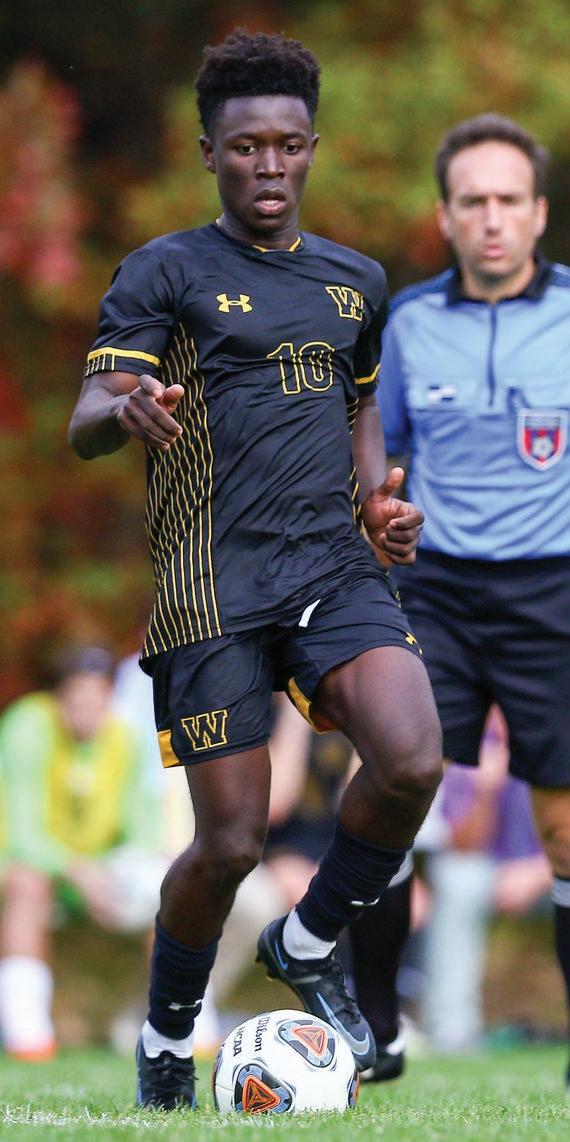
Abraham Monsee ’25
After coming off a great stretch of years making the NEPSAC New England playoffs, the team welcomed 15 new promising players as it works to rebuild. The season ended with the team starting with two Third Formers, six Fourth Formers and two Fifth Formers. Henry Warner ’25 and Abraham Monsee ’25 represented the team at the WNEPSSA AllStar Game, and Jackson Raymond ’24 repped Westminster at the NEPSAC All-Star Game. Monsee was selected to play in the extremely competitive NEPSAC Junior All-Star Game; he was also placed on the All-NEPSAC Honorable team. Henry Warner ’25 was selected to the Connecticut All Prep All-State team.
FIELD HOCKEY: Most Improved Player: Talia Ondy ’25; Pitcairn Most Valuable Player: Olivia Gordon ’24
BOYS’ WATER POLO: Most Improved Player: Will Whiting ’24; Most Valuable Player: Wills Erda ’24
BOYS’ CROSS COUNTRY: Most Improved Runner: Nicolas Ramsumair ’27; Jones Bowl, Most Valuable Runner: James O’Connell ’25
GIRLS’ CROSS COUNTRY: Most Improved Runnerr: Anna Klapman ’26; Wilbur Bowl, Most Valuable Runner: Sophia Lazor ’27
GIRLS’ SOCCER: Most Improved Player: Helen Marshall ’25; Most Valuable Player: Haley Cramer ’24
BOYS’ SOCCER: Wilbraham Most Improved Player: Connor Gray ’26; 1956 Most Valuable Player: Abraham Monsee ’25
The Stephen Harris Squibb Bowl awards, which honor the athlete from each varsity team who demonstrated the greatest sportsmanship, consistent effort and inspired performance throughout the season, were given to:
FIELD HOCKEY: Sophia Peterson ’24
GIRLS’ SOCCER: Mia Davis ’24
BOYS’ SOCCER: Jackson Raymond ’24
BOYS’ CROSS COUNTRY: Sam Hyde ’25
GIRLS’ CROSS COUNTRY: Madison Khuu ’24
WATER POLO: Andrew Pang ’24
The All-Founders League Award is given to two members of each varsity team who best exemplify the League ideals of sportsmanship, hard work and character in the spirit of competition and fair play at the varsity level.
VARSITY BOYS’ SOCCER: Henry Warner ’25, Luka Misko ’27
VARSITY GIRLS’ SOCCER: Sarah Lenox ’24, Emme Pacheco-Hager ’25
VARSITY BOYS’ CROSS COUNTRY: Matthew O’Connell ’24, Rhys Marschke ’24
VARSITY GIRLS’ CROSS COUNTRY:
Sophie Grace Stevenson ’25, Madison Khuu ’24
VARSITY FIELD HOCKEY: Olivia Emerson ’24, Sophia Peterson ’24
VARSITY WATER POLO: Trent Jones ’25, Owen Huang ’24
The Hopley-Jackson Award, named in honor of Richard Hopley and Michael Jackson, lower team coaches for many years at Westminster, is given seasonally to the Westminster lower team coaches with the best season.
FOURTH BOYS’ SOCCER COACHES:
Mike Lawler, Bryan Tawney
The Houghton Award, named in honor of Frederick Houghton, Class of ’32, trustee, friend, and fan, is given seasonally to the Westminster team with the best season. This year’s award is given to New England Class A Champions, Varsity Girls’ Soccer.
VARSITY GIRLS’ SOCCER COACHES: Kelly Wosleger, Kelly Lucas
CAPTAINS: Jillian Gregorski ’24, Hayley Cramer ’24
The team wrapped up a successful winter season, falling just short of making the New England playoffs. The Martlets got off to a great start but ran into a tough stretch that led to six consecutive one-goal losses, two coming in overtime. Despite the bumpy road in the middle of January, the Black and Gold remained positive and came to the rink each day with the same focus. In their final eight games of the season, the Martlets went 5-3 with big wins over Loomis, Belmont Hill, and Berkshire to finish their regular season at 10-12-3 and just a few points shy of making the playoffs.
The Martlets finished with a 14-8-3 record and earned the second seed in the Patsy Odden Large School Tournament. The team started the season off strong and headed into winter break 5-2-1, which included a big win against Loomis Chaffee and a tie against the 2023 New England Champions, Williston Northampton. In January, the Martlets won five of the next six games. The remainder of the season included strong wins against Frederick Gunn and Taft. The Martlets earned their spot in the semifinals of the Patsy Odden Large School Tournament, ultimately falling short in the matchup against Dexter Southfield.


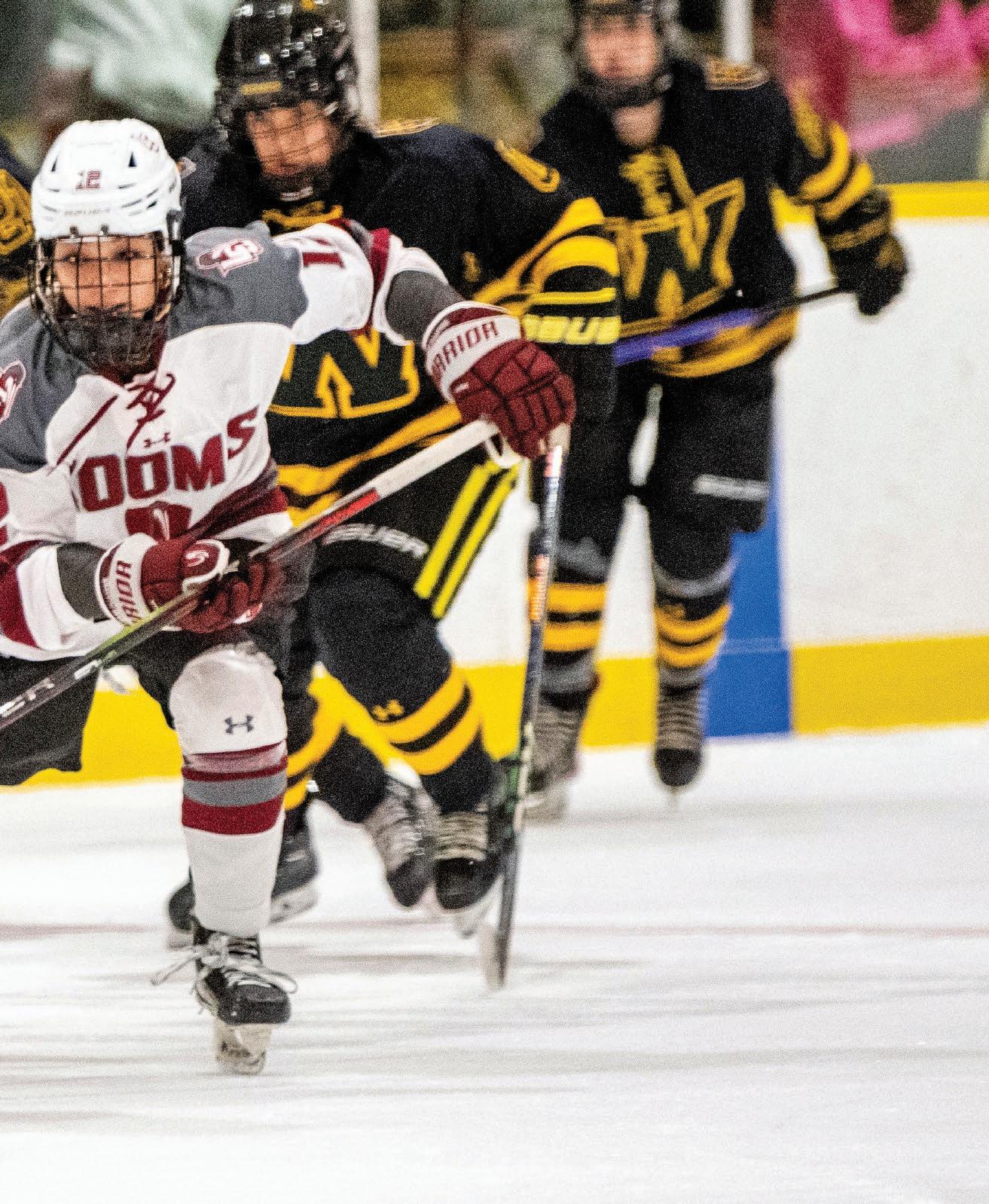
All the players showed improvement from the start of the season to the end, and the highs they got to experience were amazing. The team took pride in itself and in how it presented to opponents, no matter the score of the matches. The biggest highlight of the season was at the U.S. High School Squash Nationals. The Martlets came into Division C in seat 16, the very last one. The team expected to play in D, so being in C was great in itself. To make the weekend even better, the Martlets were able to beat the No.1 team in the division 4-3 in the fifth game, with a final score of 15-13. Every win was a group effort, and every loss was greeted with the grit and grace Westminster can be proud of.
The season started very well, with three victories in December, including a tight 4-3 win over Loomis. The new year began with the program’s first win over Hopkins (5-2) and a very tight 4-3 victory over Kingswood Oxford. The 5-0 start was the beginning of 12 wins in total. The team earned a spot in the B division 8-16 in New England and finished eighth of 16 in Division III at the U.S. High School Squash Nationals, making the team 40 of 112 teams in the country.


From the opening tip to the final buzzer, the team showed determination, toughness and improvement. Early in the season, the players and coaches were learning to work together and figure out how to maximize talent. After a disappointing December tournament, the team emerged in the new year ready to get to work. A brilliant effort at Choate gave the team confidence. Then came victories over Taft, Frederick Gunn and Hopkins and a strong showing at the season’s end against Pomfret. Along the way were many close games. Two overtime losses and two more losses by a total of seven points were challenging, but also exhilarating. Captain Haley Cramer ’24 will be sorely missed. The toughness and positivity of the team were a direct result of her leadership.
The team competed hard throughout the season, although the Martlets didn’t finish as they would have liked. However, the team had some bright moments throughout the season. One of those bright spots was the elevation of captain Wills Lown ’24, who became a very dependable player in the home stretch of the season. Captain Jayden Reid ’24 had 16 double doubles out of 24 games. Fourth Former Chris Powell is a promising young star, who showed glimpses of why he’s a nationally ranked player. The Martlets went 2-1 in the Kingswood Oxford Holiday tournament, which was another highlight of the season. The team had some wire-to-wire games with several Class A and Class B playoff teams during the season.

Almost all swimmers accomplished at least one personal best time this season. The team had many swimmers compete in their first ever competitive swim meet and others who performed at a very high level of competition at New England Championships. This balance between veteran swimmers and new swimmers is what makes the teams so special and supportive. At the end of the season, Owen Huang ’24, Will Larock ’26, Reggie Kanu ’25, John Dwyer ’26, Grace Tyler ’24, Madison Khuu ’24, Hayden Schneider ’25, and Jennifer Weber ’25 all earned All-NEPSAC Honors. Notably, John Dwyer is a New England Champion in the 100-meter backstroke and 200 I.M. and Reggie Kanu is a New England Champion in the 100-meter breaststroke.
VARSITY BOYS’ BASKETBALL
Most Improved Player: Austin Black ’24
Keyes Foul Shooting Award: Wills Lown ’24
Donald H. Werner Most Valuable Player: Chris Powell ’26
VARSITY GIRLS’ BASKETBALL
Most Improved Player: Elizabeth Smith ’27
Keyes Foul Shooting Award: Emme Pacheco-Hager ’25
Most Valuable Player: Haley Cramer ’24
VARSITY BOYS’ HOCKEY
Most Improved Player: Nico Tsatas ’24
Most Valuable Player: Matteo De Luca ’24
VARSITY GIRLS’ HOCKEY
Most Improved Player: Mya Polastry ’27
Most Valuable Player: Julia Matyas ’24
VARSITY BOYS’ SQUASH
Talbot-Edwards Most Improved Player: Zelin Hu. ’25
Fritz Zeller Most Valuable Player: Jiaming Pang ’24
VARSITY GIRLS’ SQUASH
Talbot-Edwards Most Improved Player: Chase Hager ’26
Fritz Zeller Most Improved Player : Sophia Lazor ’27
BOYS’ SWIMMING AND DIVING

The Stephen Harris Squibb Bowl honors the athlete from each Varsity team who demonstrated the greatest sportsmanship, consistent effort and inspired performance throughout the season:
VARSITY BOYS’ BASKETBALL: Wills Lown ’24
VARSITY GIRLS’ BASKETBALL: Haley Cramer ’24
VARSITY BOYS’ HOCKEY: Michael Bianco ’24
VARSITY GIRLS’ HOCKEY: Liv Emerson ’24
VARSITY BOYS’ SQUASH: Long Teng ’26
VARSITY GIRLS’ SQUASH: Emily Fonner ’26
BOYS’ SWIMMING AND DIVING: Will Larock ’26
GIRLS’ SWIMMING AND DIVING: Hayden Schneider ’25 and Ellie Pearman ’25
The All-Founders League Award is given to two members of each varsity team who best exemplify the League ideals of sportsmanship, hard work and character in the spirit of competition and fair play at the varsity level.
BOYS’ BASKETBALL: Jermaine James ’24 and Johnny Hadden ’24
GIRLS’ BASKETBALL: Haley Cramer ’24
BOYS’ HOCKEY: Brian Judge ’24 and Jack Jin ’24
GIRLS’ HOCKEY: Olivia Gordon ’24 and Alex Whalen ’24
BOYS’ SQUASH: Cisco Lilien ’24
GIRLS’ SQUASH: Natasha Johnson ’27
BOYS’ SWIMMING AND DIVING: Reggie Kanu ’25 and John Dwyer ’26
GIRLS’ SWIMMING AND DIVING: Margee Mahoney ’24 and Grace Tyler ’24
The Hopley-Jackson Award, named in honor of Richard Hopley and Michael Jackson, lower team coaches for many years at Westminster, is given seasonally to the Westminster lower team coaches with the best season.
Most Improved Swimmer and Diver: Matthew O’Connell ’25 and Filip Tomic ’25
Preston “Pete” Test Most Valuable Swimmer and Diver: John Dwyer ’26
GIRLS’ SWIMMING AND DIVING
Most Improved Swimmer and Diver: Caroline Hebbeler ’27
Most Valuable Swimmer and Diver: Grace Tyler ’24
The Houghton Award, named in honor of Frederick Houghton, Class of ’32, trustee, friend and fan, is given seasonally to the Westminster team with the best season.
WINNERS: Varsity Boys’ Squash, Varsity Girls’ Hockey
COACHES: Peter Doucette (Squash), Sara Ugalde (Hockey), Kelcie Finn (Hockey)
CAPTAINS: Andrew Pang ’24 (Squash), Alex Whalen ’24 (Hockey), Olivia Emerson ’24 (Hockey)
To reach the Children’s Home in Kathmandu, Nepal, Henry Flaton ’25 and his adoptive parents had to drive over a narrow, rocky dirt road to a village on the outskirts of the city. A large metal gate marked the entrance to the orphanage, a campus of several low-slung concrete buildings that serve as dormitories, dining spaces and play areas. For about the first year of his life, this was Flaton’s home. He arrived at the Children’s Home shortly after he was born in 2006 and lived there until he was 16 months old, when he was adopted by his parents, Carol Flaton and Sandra Buergi of New York City. While he remembers little about his early life in the orphanage, he felt a connection when he saw the home for the first time while visiting Kathmandu in 2012 and met the caretakers and children; he knew that this was the place where he was cared for and nurtured before being adopted. But it wasn’t until his most recent visit to Nepal, in December of 2022, that he felt compelled to help the children living there.
By then, he recognized the difference between the quality of life he had in the United States compared to the way children lived in the orphanage. They slept on thin mattresses and worn blankets in bunkroom-style quarters. Schooling is not free in Nepal, and the home provides limited instruction. Motivated by a desire to pay it forward to the home that had cared for him, Flaton launched the Chatmandu Foundation, Inc., in 2022.
One of the nonprofit’s goals is to raise funds to provide the seven youngest children in the home with school tuition, from primary school through high school. The foundation also aims to provide each child with daily necessities, including new mattresses and blankets, and to foster social connections between residents of the Children’s Home and students at Westminster.
Since launching his website and promoting it on social media, Flaton has been able to raise approximately $17,000 for his nonprofit, which will cover school tuition for seven children

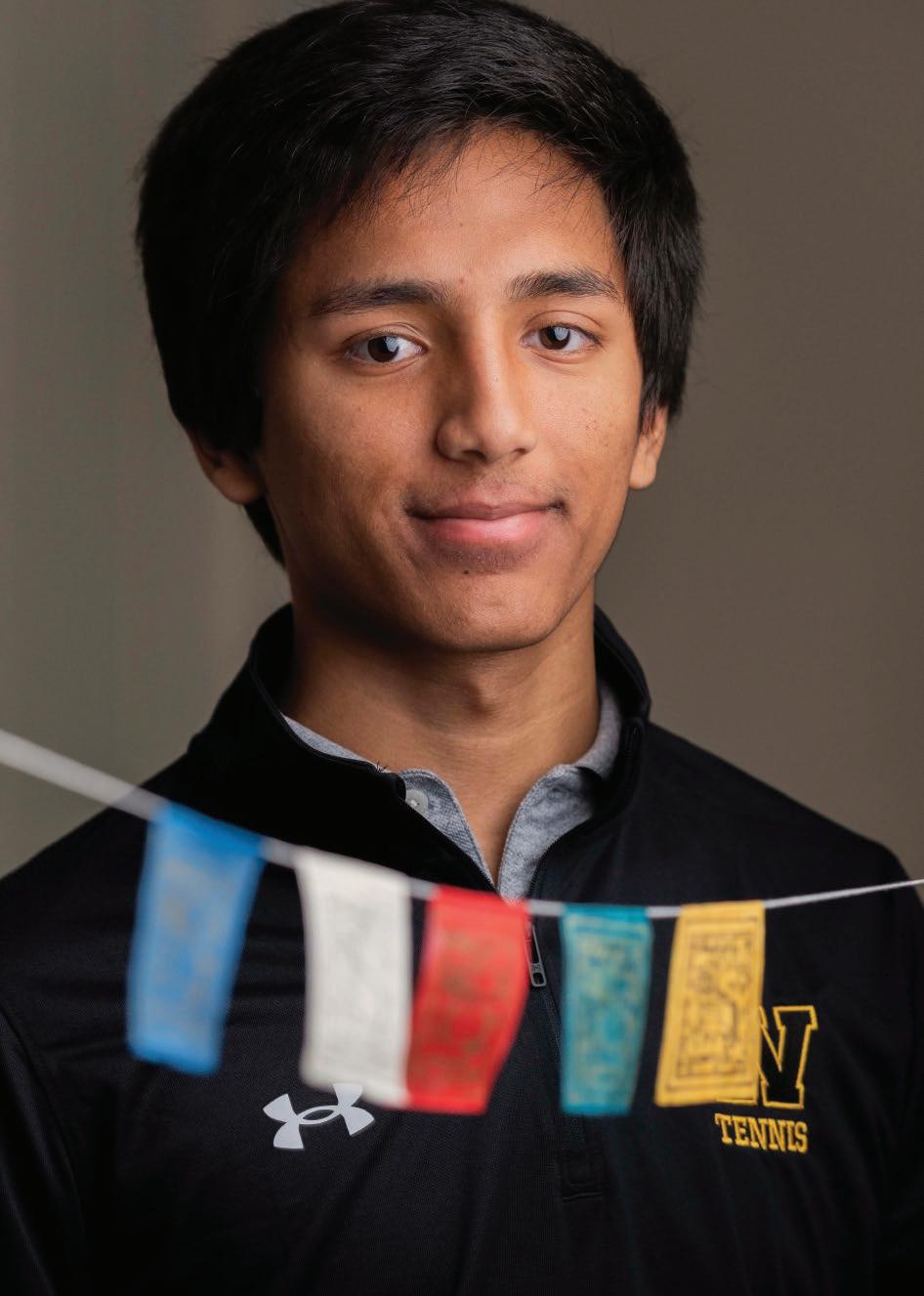
Beyond meeting the needs of these children, this effort has given me invaluable experience in the areas of fundraising and marketing.”

through high school as well as the cost of new mattresses and blankets for the orphanage.
Flaton is currently working on connecting Westminster students virtually with children in the orphanage. He hopes that through Zoom conversations, the students at Westminster will gain a better understanding of the culture in Nepal and the lives of people in Kathmandu, while children in the orphanage will be able to improve their English language skills. Most of the children in the orphanage can speak some English, but they need to practice their conversational skills, he said. The first session went well, he noted. “I was expecting that we would do introductions for a bit then mainly talk about cultural differences between the U.S. and Nepal, but we diverted and mainly talked about ourselves!”
To support the Westminster connection, Kerry Kendall, art instructor and department head, worked with art students in her drawing, painting, and sculpture classes last fall to create etchings based on Flaton’s photos of Kathmandu and the Children’s Home. The artwork was then uploaded to the Chatmandu website for the Nepali children to view.

Flaton also started the Chatmandu Club for students interested in learning more about the history and culture of Nepal.
Director of Advancement Newell Grant Jr. ’99, who serves as Flaton’s advisor, was impressed by the fact that Henry has found a way to have an impact on the other side of the world, and at the same time, help to virtually bring the culture, history and people of Nepal to Westminster’s campus.
In the future, Flaton plans on returning to Nepal to visit the home and strengthen his connection to his heritage. “Helping the Children’s Home has been really rewarding for me,” he said. “Beyond meeting the needs of these children, this effort has given me invaluable experience in the areas of fundraising and marketing. I will be sure to carry this experience with me through college and into my professional career.”
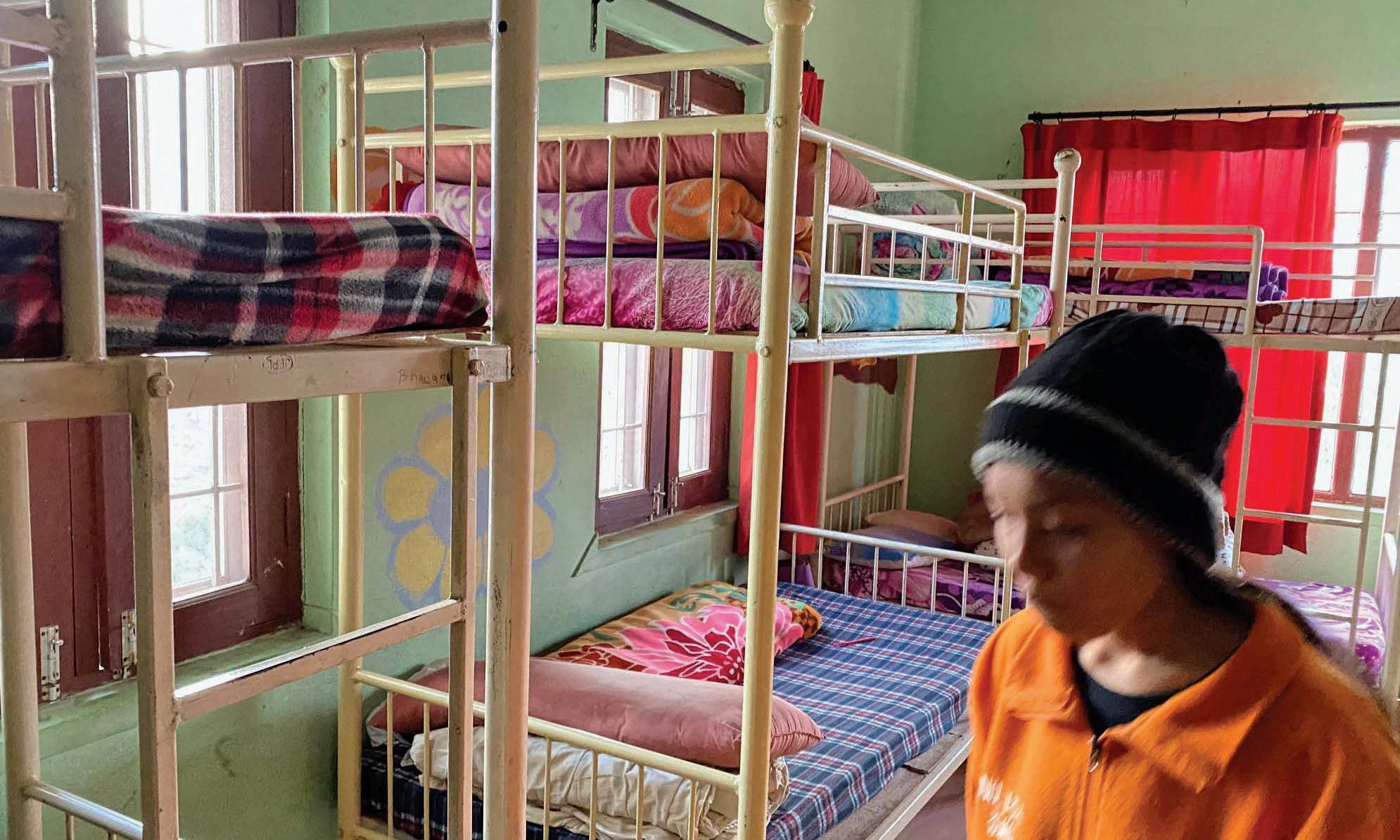

Buttering a tower of bread slices may not be the most glamorous work, but for Teddy Russell ’26, it was an opportunity to serve individuals in need.
“I just like helping people,” said Russell, who was part of a group of Westminster students who volunteered over winter break to prepare lunch with Loaves and Fishes.
During the academic year, up to a dozen Westminster students volunteer twice a month at Immanuel Congregational Church in Hartford, where they serve lunch to neighborhood residents in need of a nutritious meal.
While Russell dutifully buttered bread, Zac Jainchill ’25 stirred a huge
Most of my volunteer projects, I start with a club I am in, because it is easier to plan when there’s already a team of people willing to help.”
– Chip Genung ’25
pot of melted cheese and milk to make mac and cheese, the main course for lunch. Nearby, Max Williams ’25 kept an eye on a pot of boiling pasta. Alumni Catherine Rodrigues ’23 and Elizabeth Wolf ’23, both home from college on winter break, shredded lettuce for a salad. Mary Eckerson P’09, ’11, ’17, ’21, kitchen director and wife of civics and history teacher Todd Eckerson, kept an eye on their progress. The Eckersons have been volunteers in the program since its inception in 2013 with Mary ferrying the students by bus from Westminster to the church.
When the food was ready, students pushed tray carts into the dining room, a brightly lit space with simple round tables and chairs and colorful artwork
on the walls. Plated meals are delivered individually by students to each person at every table. On this bitterly cold day, more than 80 people entered the church basement during serving hours, from 11:45 a.m. to 12:15 p.m.
Rodrigues, who is quick with a smile, warmly greeted each person she served and asked if they wanted coffee or tea. A freshman at Hope College in Holland, Mich., Rodrigues said her experience with Loaves and Fishes at Westminster inspired her to become involved in her college’s outreach programs.

A part of Westminster’s mission statement is “service beyond self,” which encourages students to volunteer early with the hope that it will foster a lifelong commitment to giving back. Loaves and Fishes is just one program among many that encourages students to volunteer on and off campus.
Spanish teacher Jennifer Augsberger P’26, director of Westminster’s community service program, has set a goal of getting every member of the student body to volunteer for offcampus initiatives during their Westminster career.
“I think it is important for all the students here to have an opportunity to see how easy it is to help others and how meaningful it is,” she said. “No one has ever left a service project upset that they just wasted their free time.”
Instead, they learn that giving has rewards. As Augsberger sees it, volunteering helps students develop a sense of civic responsibility and duty, gain empathy and compassion, build leadership skills, and enhance their interpersonal skills
and cultural awareness. One way she reaches a majority of students is through the athletic program by asking each team to take on a group service project.
“I make connections in the community for them,” she said. “Then, it is up to the coaches to follow through on the initiative.”
In the fall, the girls’ varsity and boys’ varsity soccer teams worked with young players in the Hartford Community Soccer program, which serves Hartford children ranging from four years old to high-school age.
The relationship worked so well that last fall, the Martlets ended up inviting some of the young athletes to sit on the bench and watch one of their home games.
“Those are the kinds of connections we are trying to build,” Augsberger said. “The idea is to plan sustainable programs so that in the following year, the coaches can reach out again to the same group.”

Outside of athletics, students can choose community service as an afternoon program for two seasons per year. Some mentor students at Tariffville Elementary School in Simsbury, a program launched by Erin Hynes Naspo ’93, a social worker in the Simsbury public school system, and Director of Learning Support Kelly Curtis P’24. Or, they can visit a neighboring assisted living facility to help residents with computer skills and other tasks.
Augsberger noted several broader Westminster-wide initiatives, including food drives and the annual Christmas party in Armstrong Dining Hall for families of children who have undergone craniofacial surgery for congenital and acquired deformities at the Connecticut Children’s Medical Center.
In February, the school raised over $3,200 for the Gaylord Wolfpack sled hockey team. The team is part of the Gaylord Sports Association, which provides
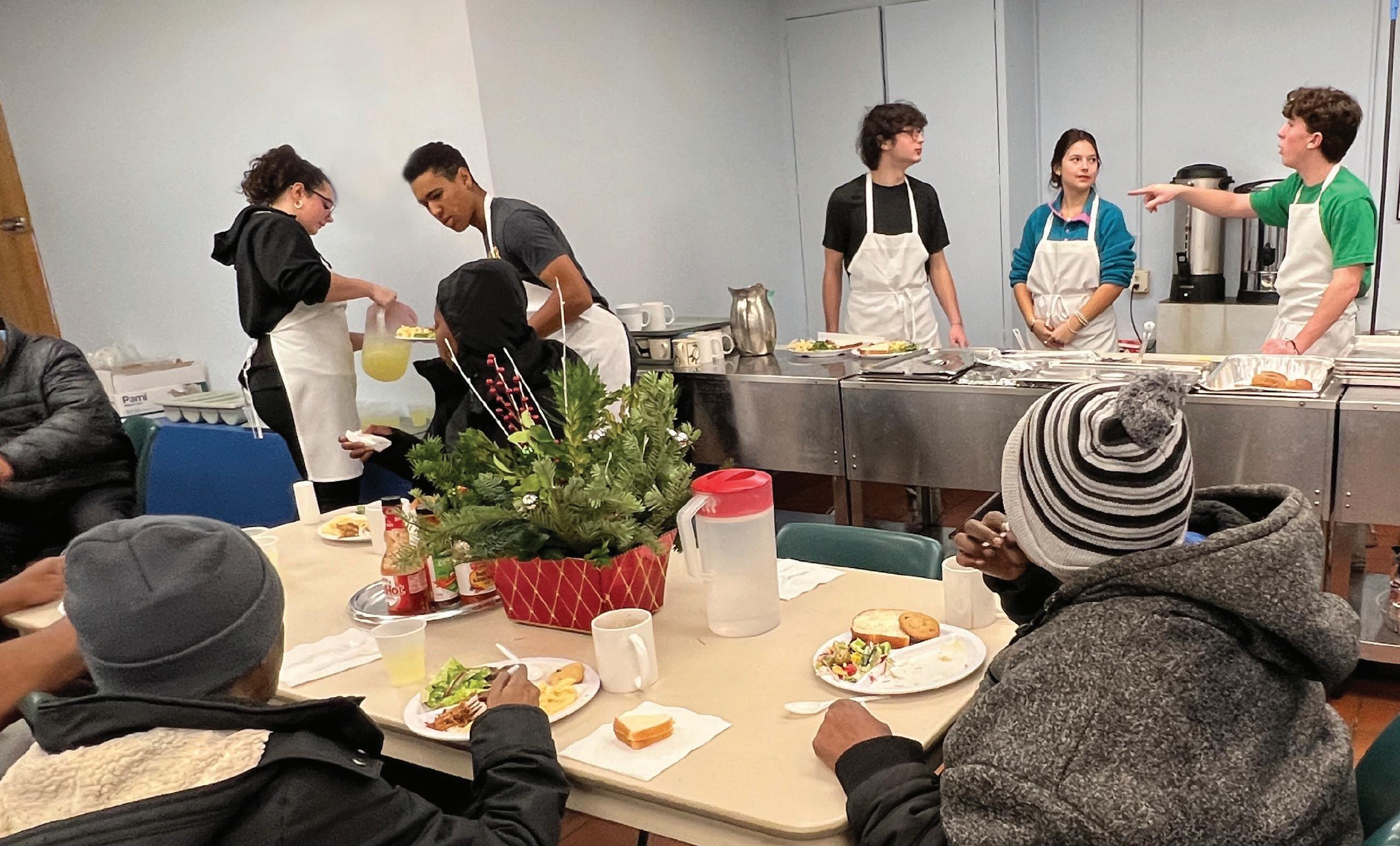
adaptive sports opportunities for people who have a physical disability or visual impairment. Through the sale of T-shirts and a demo game between the Westminster boys’ and girls’ hockey players and the Wolfpack team, the school helped to cover the Wolfpack’s travel expenses to the national sled hockey championships in April.
Still other volunteer projects are student-generated and just need a bit of momentum to take off. Chip Genung ’25 designed his own community service project and tapped different clubs to get his peers involved. “Most of my volunteer projects, I start with a club I am in, because it is easier to plan when there’s already a team of people willing to help,” he said.
I think it is important for all the students here to have an opportunity to see how easy it is to help others and how meaningful it is. No one has ever left a service project upset that they just wasted their free time.”
–Spanish teacher Jennifer Augsberger
A member of the Eco Team, Genung started a successful campaign to stop students from putting non-compostable napkins in the compost in Armstrong Dining Hall. He’s also working toward cleanups on and around the campus. “I have always found the best way for me to provide service to the community is by getting involved in things that interest me,” he said.
Serving Our Neighbors is a community service club
that plans many on-campus events to raise awareness on a variety of issues.
President Morgan Curtis ’24 said that the club’s events have included Red Sneakers for Oakley, which raises awareness about food allergies; Peaches Neet Feet, where artists on campus paint shoes for children with disabilities, and Touch a Toaster, in which team members see how long they can keep their hands pressed against the side of a Westminster “toaster” bus in support of the national mental health organization “One Love.”
For Curtis, the daughter of Director of Learning Support Kelly Curtis, the importance of volunteering in service to others was instilled in her by her family. “My mother was the former director of community service at Westminster, so I helped with many of the events back when I was in middle school,” she said.
“It is something that has meant a lot to both of us, since many events have personal ties to either my family or the families of others here in the community. Having the opportunity to be involved in the community and raise awareness for different issues outside of Westminster has been amazing. I have always loved helping out in the community, and I see myself continuing to do that when I am in college.”
Patrick Owens, executive director of Horizons at Westminster, is working toward expanding Horizons beyond the six-week summer enrichment program on campus for Hartford’s Moylan Elementary School students. One day a week, he takes his Thirds basketball team to Moylan Elementary, where students teach kids how to dribble and help them with their reading skills. Moylan students also visit campus three times a year for the Horizons Saturday Academy to work on their skills with students, while a group of Westminster students visit Moylan on Friday afternoons to assist students and teachers in the classroom and with special activities.
Owens is currently working on partnering with Literacy Volunteers in Hartford, which would allow Westminster students to teach reading to adults for whom English is a second language.
“‘Service beyond self’ is one of the school’s tenets, and one Martlets are embracing this year,” Owens said. “The enthusiasm from our students to participate in these opportunities has been just overwhelming. Beyond providing education and joy to learners of all ages, our students are also expanding their perspective and purpose.”
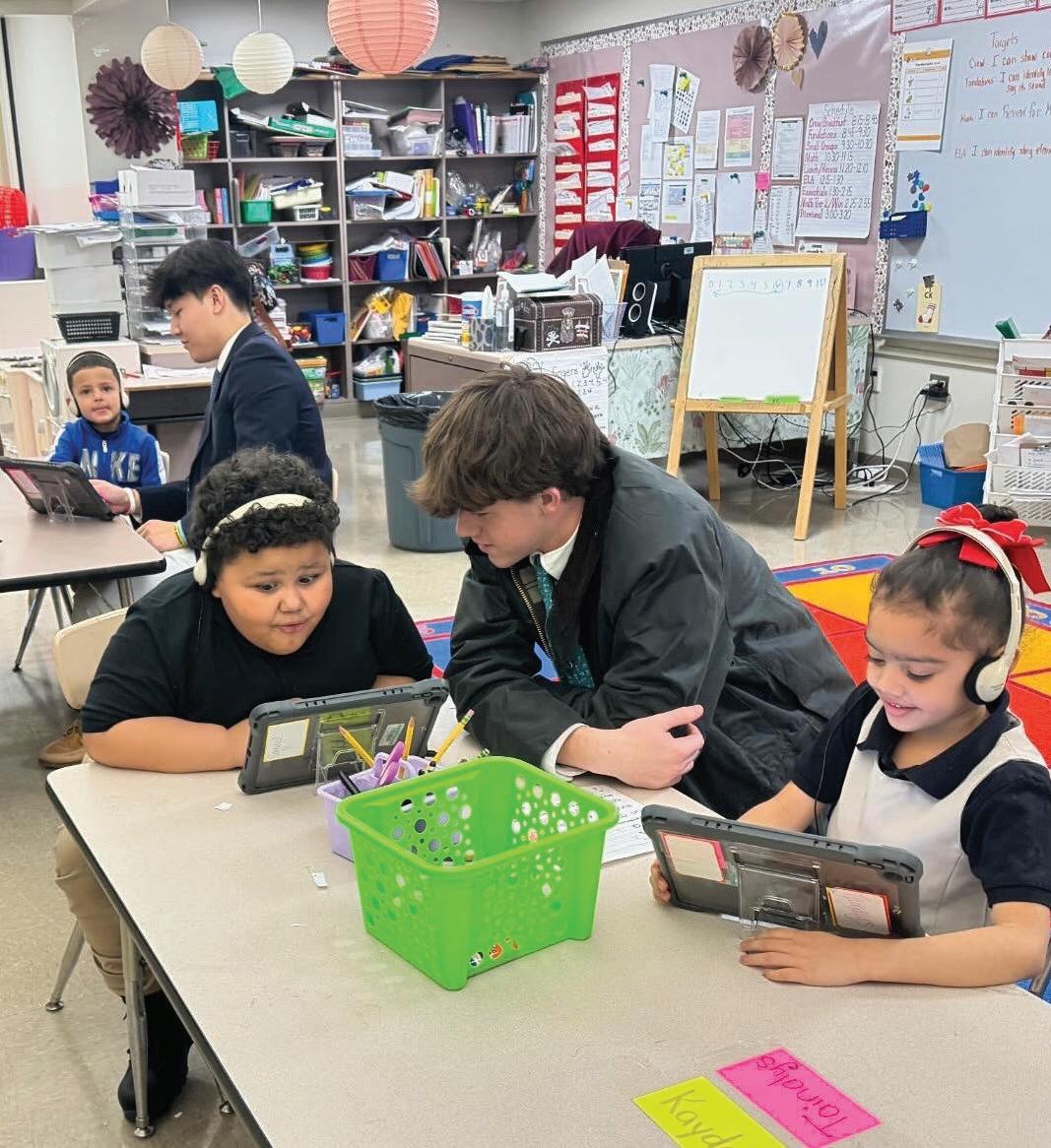

Retiring
Nancy
When Scott Stevens was a junior in college, he took a MyersBriggs personality test, thinking it might help him find his career path. According to the results, he would do well as an IRS agent or a minister, neither of which appealed to him. Instead, he found his true calling as a teacher, a career that does involve some similar skills: a razor-sharp attentiveness to students and the patience of a saint. Perhaps a more decisive factor in his career choice was his upbringing as a “faculty brat” at New Canaan Country Day School in New Canaan, Conn., where his father served as head of school and taught English. Later, he would often joke that boarding school life became part of his DNA. While he didn’t attend
Westminster –– opting to enroll at the Hotchkiss School instead –– nine of his relatives graduated from Westminster, including his three children and his younger brother, Jed ’81.
From the moment he first arrived on campus as a teaching intern in 1983, Stevens thoroughly immersed himself at Westminster. Fresh out of college with a B.A. in English from the University of Vermont, he taught one section of English, coached three sports and worked in the admissions office. “I got paid $3,500 for the year and I thought I had won the lottery!” he recalled.
“I got to see students when they were wide-eyed Third Formers before witnessing their maturity on their way out as seniors. There’s just so much growth between those years.”
Stevens’ commitment to the school continued to flourish after he and his wife, Amy, married and settled into campus life. As new opportunities and roles for both emerged and Amy joined the teaching staff, they decided to commit long term to Westminster. Together, they raised three children on the Hill: Nick ’07, a graduate of Middlebury College; Abby ’09, a graduate of the University of Vermont;
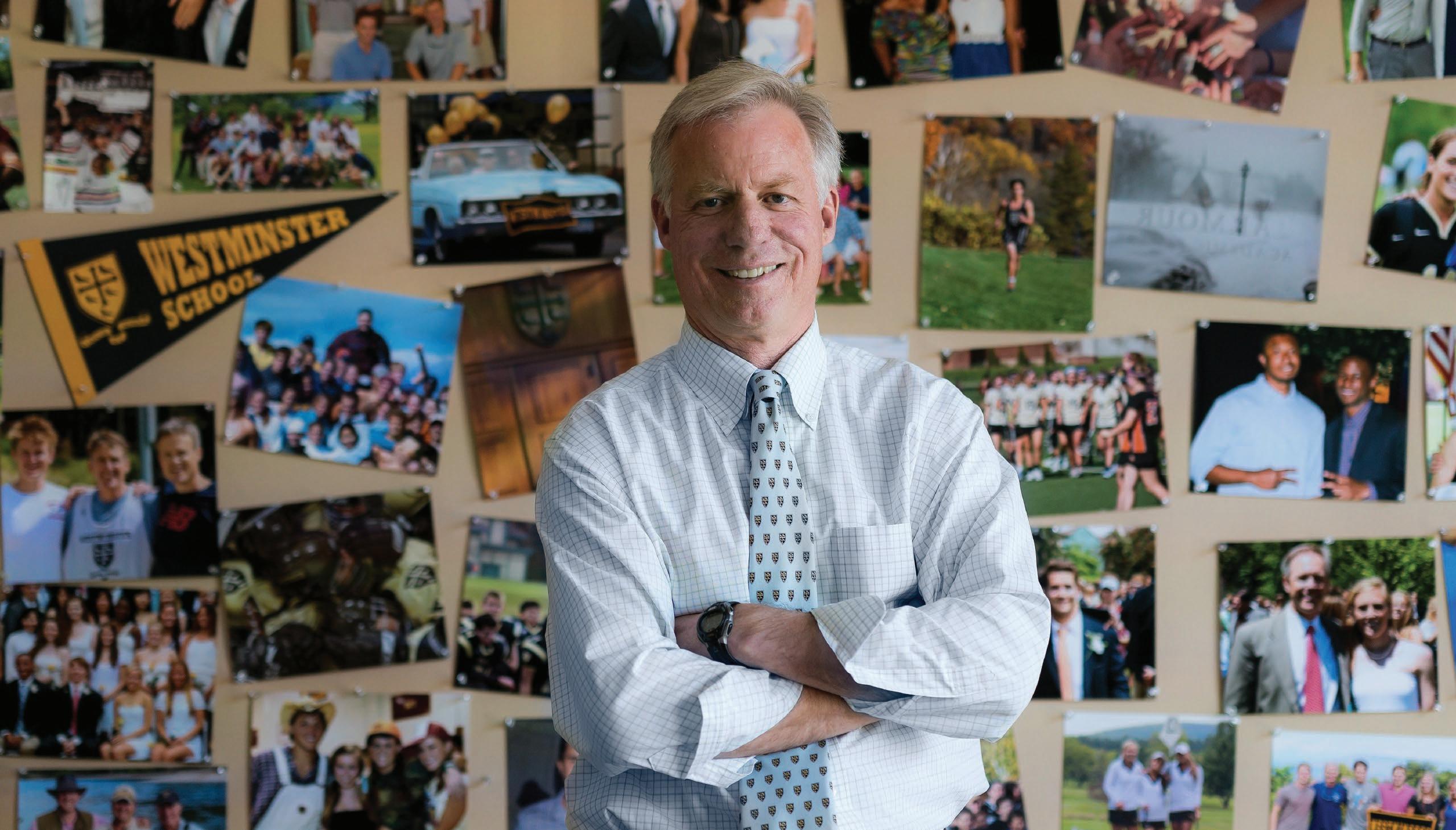
and Will ’12, a graduate of Middlebury College.
Some of their best times on the Hill were watching their children become students at Westminster, Stevens noted. “Both Amy and I felt blessed that Nick, Abby and Will welcomed us to be a part of their Westminster experiences, and we loved watching them in their various academic and athletic pursuits while getting to know their wonderful friends,” he said.
During his tenure at Westminster, Stevens served in several key positions outside the classroom, beginning in 2002 as the director of development, then as the assistant headmaster for development in what is now the advancement office. In the latter role, he was an ambassador and fundraiser for Westminster, forging relationships among alumni, parents and friends of the school.
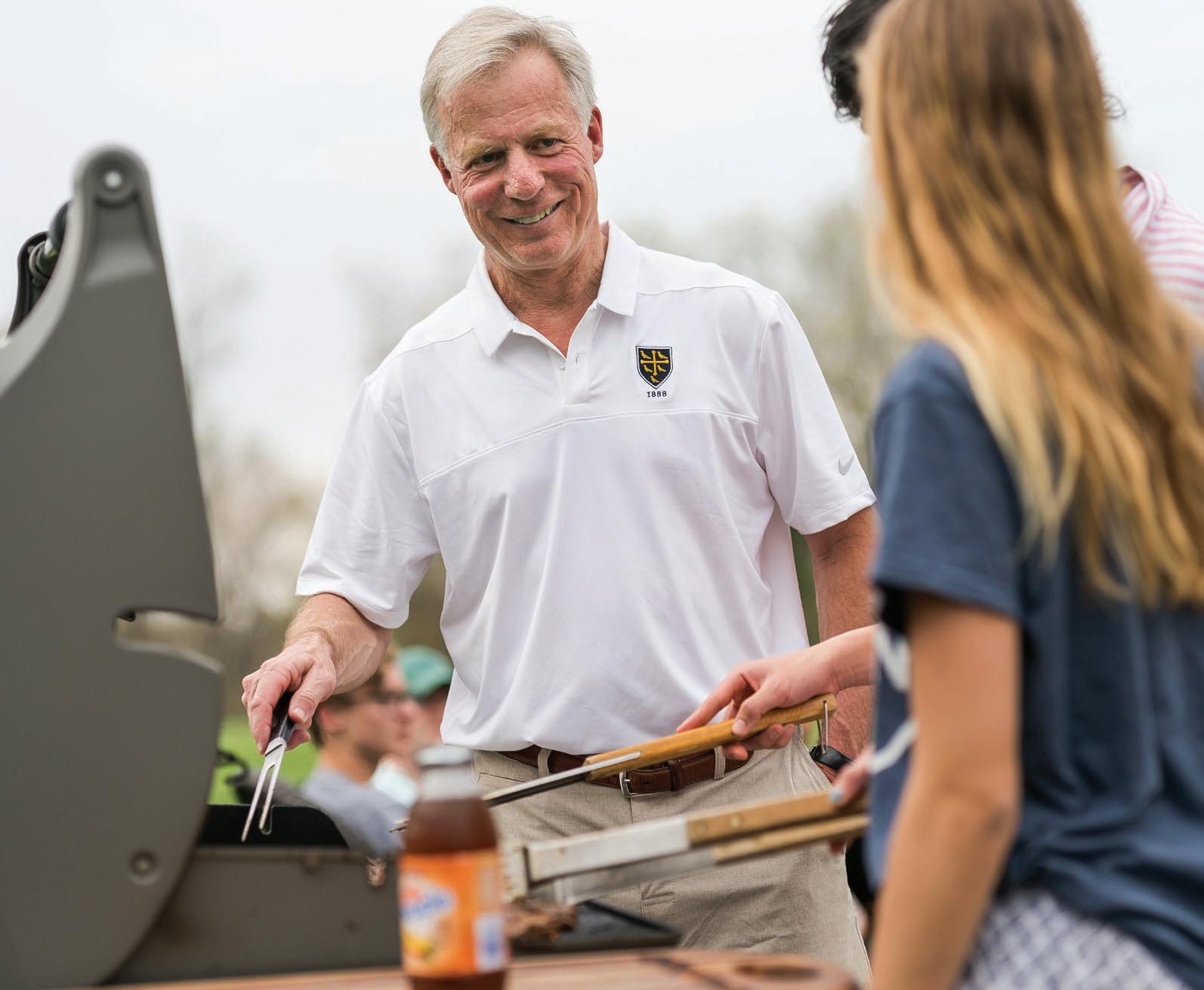
“When I shifted over from the classroom to the advancement office, it was both an exciting time at Westminster and for me, personally, a new career path at a place I loved. The school had always raised money, but it had never mounted a comprehensive campaign,” he said. Working with former Head of School Graham Cole, Stevens said, “We were not afraid of a challenge and we, along with others, spearheaded the campaign that
led to a lot of new campus building, including construction of the Armour Academic Center, as well as funding for endowed teaching chairs and faculty support, which are central to the school’s mission.”
In 2015, he returned to the classroom, where he taught English to Third and Sixth Formers. Stevens enjoyed observing his students’ progress and insights.
“I got to see students when they were wide-eyed Third Formers before witnessing their maturity on their way out as seniors. There’s just so much growth between those years,” he said.
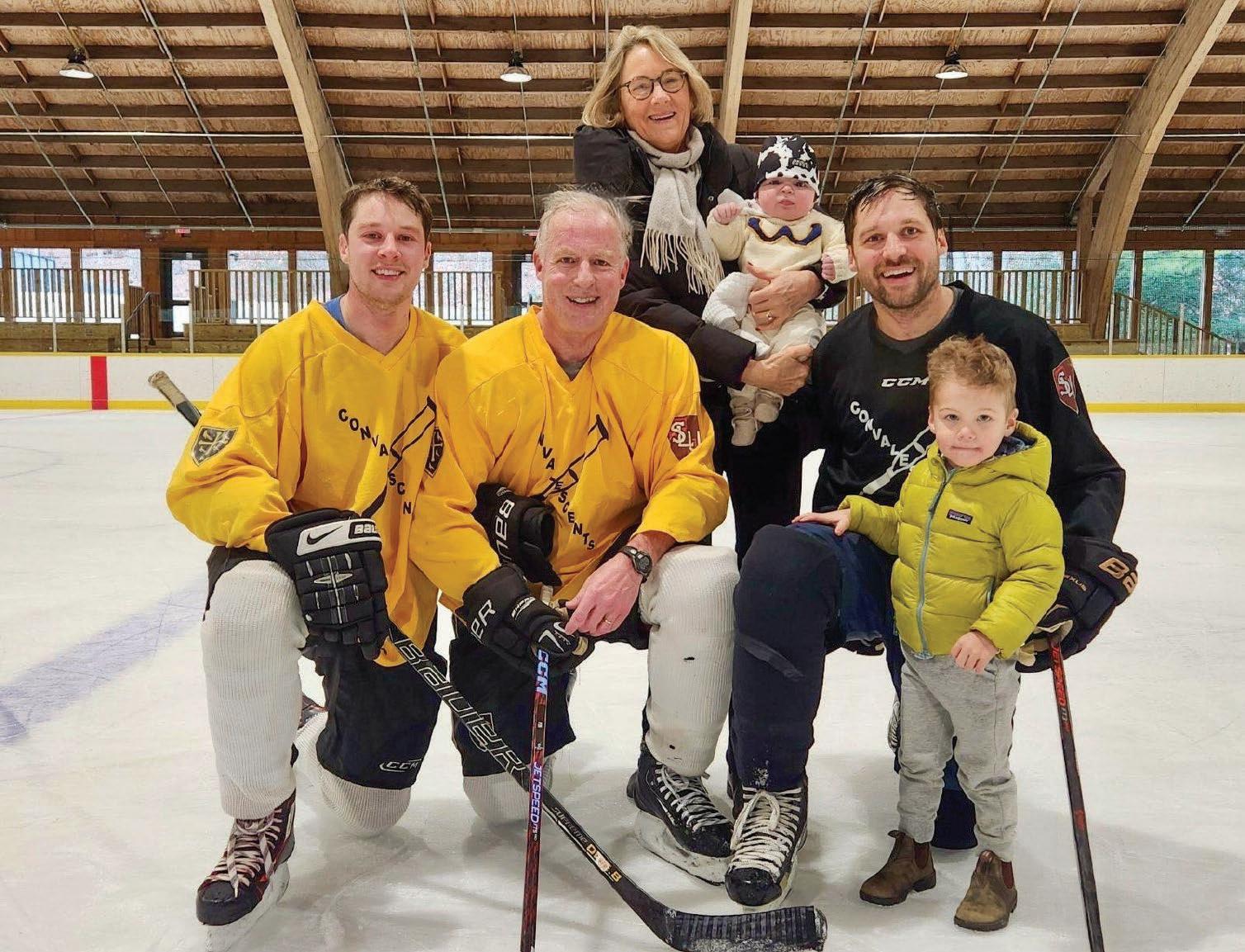
“I am a little bit antiquated in that while the world is getting more competitive and there is a constant beat of the drums to accelerate childhood, I have wanted to shield, support and almost slow that process for my students. Talking about literature became a wonderful forum to think about ‘growing up,’ while hopefully making their experience at Westminster one of positive growth.”
Throughout his Westminster career, Stevens was a “triple threat,” coaching hockey, football and lacrosse, living in a dorm and teaching. In 2015, when the girls’ varsity golf program started, he gladly stepped up to coach the team. “Having the chance to coach girls was a wonderful new opportunity,” he said. “I have loved every minute of being with the girls while
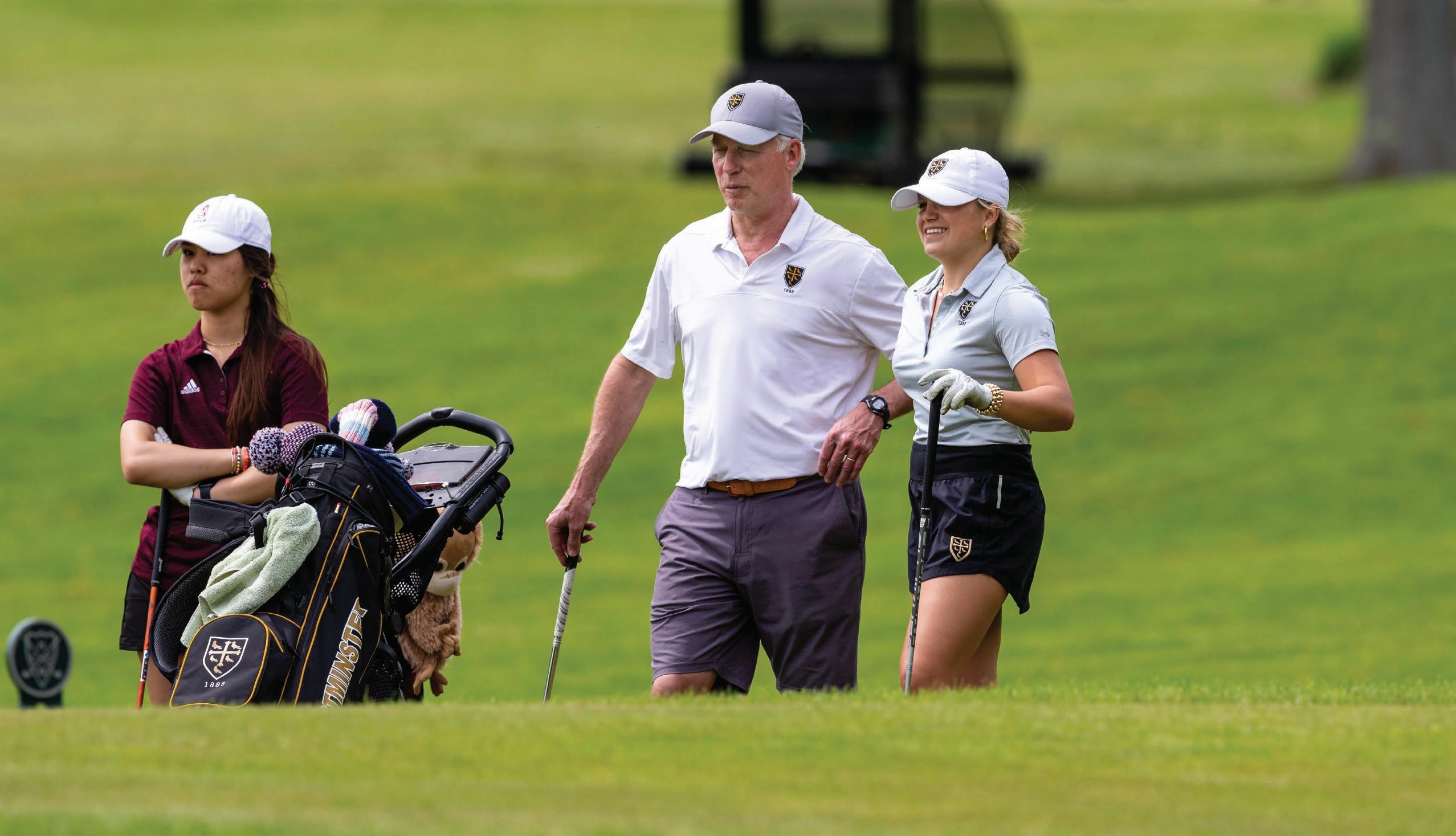
hopefully cultivating their love for the game of golf.”
This spring, Stevens was awarded the 2023-2024 MD Nadal Award by the Founders League for his contributions to Westminster’s athletic program since being hired in 1983. The award is given annually to the coach whose conduct exemplifies the proclamation “play by the rules, accept victory or defeat graciously, respect all who assemble and participate.”
He has served as dean of students and director of residential life as well as an advisor to countless students. In 1999, he was a recipient of the O’Brien Award in recognition of his personal commitment to nurturing and supporting students. He also had the honor of delivering the keynote address to the Class of 2024 at Commencement.
While at Westminster, Stevens and his wife earned master’s degrees in English from Middlebury College’s Bread Loaf School of English. In 2018, Stevens was awarded a sabbatical year that allowed him to pursue his love of photography and for the couple to travel extensively, including a tour of Southeast Asia.
Although Stevens will officially retire in July, the couple plan to remain in Simsbury, where they have developed many ties to the community. Amy retired in 2022, after having served Westminster as a teacher, admissions counselor, librarian, advisor and Chapel program director for 25 years. Upon her retirement, she, too, was a recipient of the O’Brien Award.
Stevens plans to continue working as a consultant to independent school administrators, using his decades of experience and knowledge to prepare a new generation of educators. As Scott and Amy begin the next chapter in their lives, they’ll miss living on campus — specifically, the spontaneity and unpredictability that comes with living among teenagers.
“Of course, I am going to miss my colleagues,” Stevens said. “But I’ll especially miss being with students at the start of a class, when it feels as though anything is possible.”
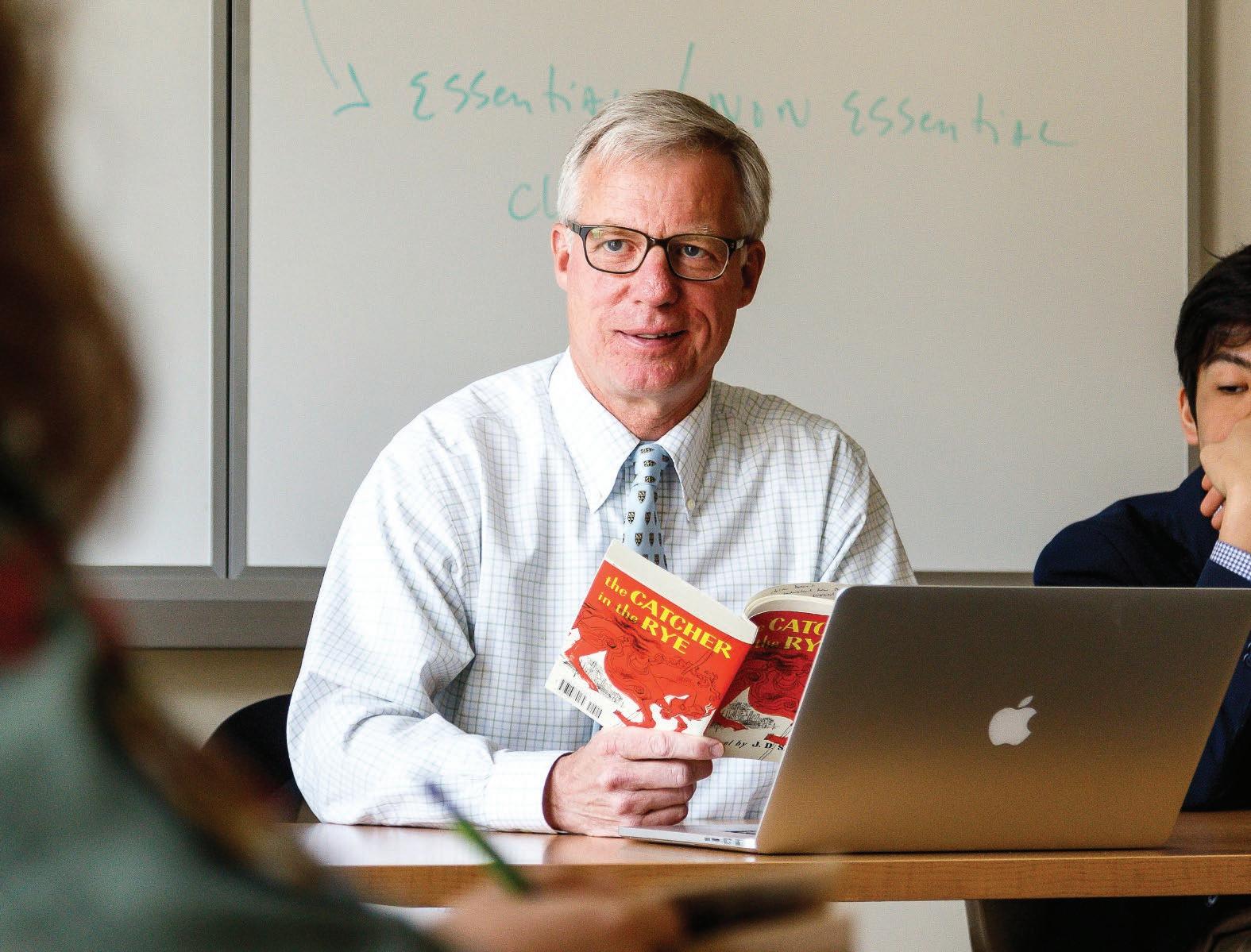
When Nancy Urner-Berry retires this spring, it will be a bittersweet moment for the long-serving faculty member. On one hand, she has spent most of her life on campus, having arrived on the Hill as a Fifth Form day student from Granby, Conn. Her brother Jim ’83 and sister Kat ’85 followed in her footsteps, enrolling as day students. After graduating from Middlebury College, she returned to Westminster in 1985 as a teaching intern and, in 1986, became a full-time faculty member. In 1992, she married Scott Berry, former Westminster athletic director and a former science teacher, and together they raised daughters Margaret ’11 and Katherine ’16 on campus. Over her long tenure, Urner-Berry taught both math and chemistry, coached seven different sports, worked in the dean’s office, served as an advisor and lived in a dorm with her family. In many respects, Westminster is her home.
On the other hand, Scott retired in 2017 and, as Nancy put it: “He has been walking around this campus for seven years, so it is time for a change of scenery!”
After the end of this academic year, the two will be charting a new path in Portland, Maine, where they will move to be closer to two of their three daughters, Kelly and Margaret, and their three grandchildren. Daughter Katherine resides in Bozeman, Mont.
At Westminster, Urner-Berry thrived as a student and teacher. As a Martlet, she earned awards in mathematics, science and general scholarship and competed on the field hockey, swim and track teams. She holds a school record for girls’ hurdles. “Only because the following year, they changed from yards to meters!” she joked.
Urner-Berry majored in chemistry at Middlebury College. During her senior year, she briefly considered working in a lab or applying to graduate school. Instead, she found herself interning as a teacher at Westminster. Except for a brief stint at a day school from 1989-1991, she has been on the Westminster faculty ever since, earning her master’s in liberal studies from Wesleyan University in 1995. Over the past three decades, she has been a witness to Westminster’s evolution under four heads of school — the construction of new facilities and changes in student culture and academics.
So much has changed for students, she said. “The college process was different back then. I applied to four colleges, and I took the SAT once. We didn’t have the common app, where you can apply to a lot of colleges all at once. As seniors, we only took four courses, instead of five. We had Chapel on Sunday with faculty members as speakers, followed by a family-style

“The longevity of those friendships is quite amazing, given how hard it was to stay in contact before computers and smartphones became ubiquitous.”
meal. In the ’80s, teachers could smoke on campus — and students too, with parental permission.”
While much has changed, there are many things that remain the same: the close-knit classes, the in loco parentis relationships between faculty and students and the student drive to seek challenges in both the classroom and on the sports field. UrnerBerry enjoys her enduring friendships with her Westminster classmates. “The longevity of those friendships is quite amazing, given how hard it was to stay in contact before computers and smartphones became ubiquitous,” she said.

For Urner-Berry, the most rewarding part of teaching has always been getting to know her students in and out of the classroom, helping them work through math or chemistry problems and chatting with them about their future. In 1999, she was the recipient of the Swayze Award, presented to a member of the faculty for “outstanding contributions to the life of the school.” Her award citation notes:
“She models in the most impressive way how someone can juggle all of the complex, pressing demands of home and family with professional excellence.” At Commencement in 2023, Urner-Berry was awarded the Sherwin-Cole Chair, given every three years to a senior faculty member who sets the standard for leadership and embodies the true meaning of Grit and Grace.
Throughout her time as a student and as a teacher, Urner-Berry said that
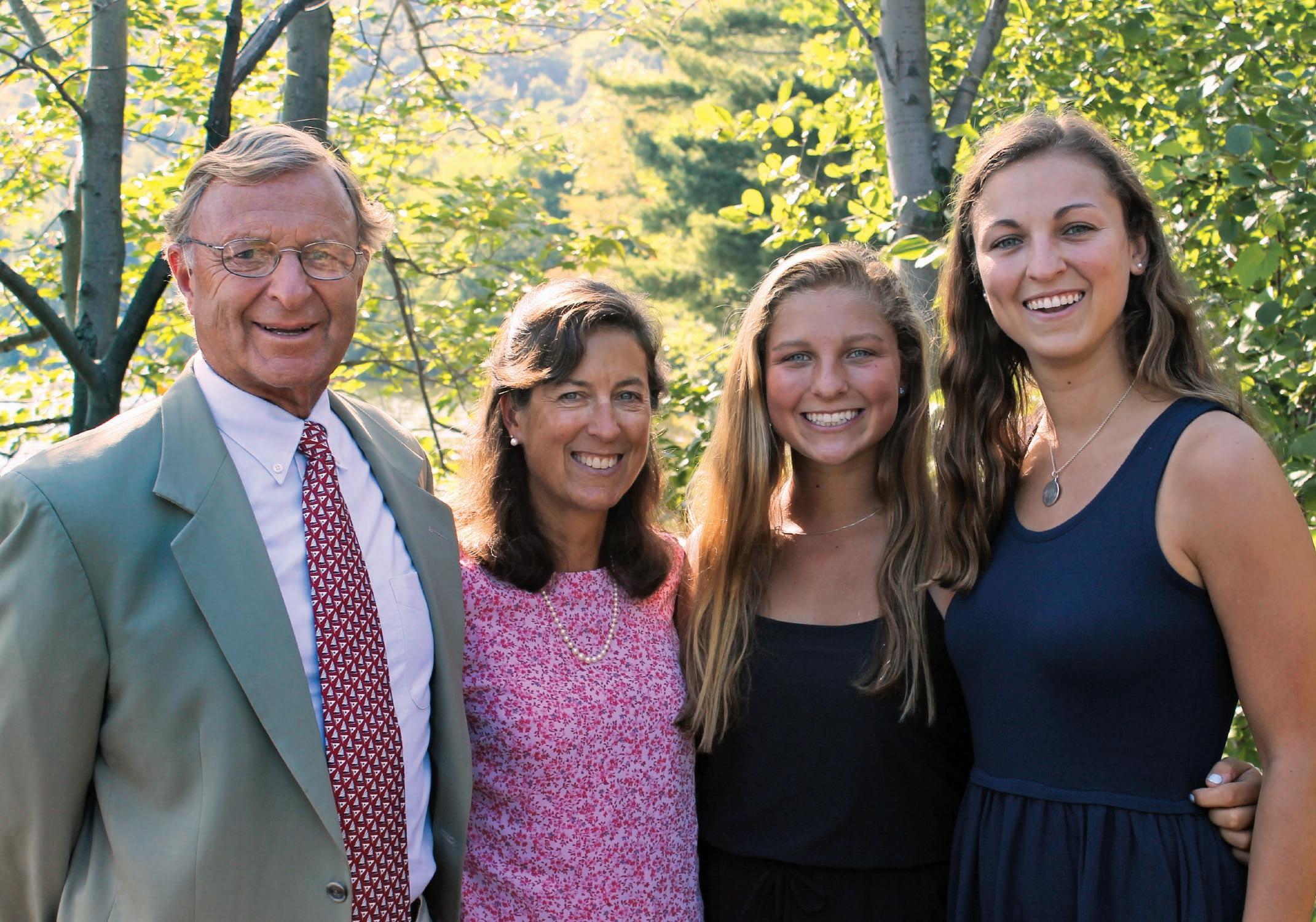
students at Westminster have always been expected to push themselves, even when that means fitting a bunch of activities into a day that always seems to be three hours too short. She has especially cherished the relationships she has developed with her advisees and enjoys staying in touch with them, watching their careers and relationships grow and thrive.
As parents, Urner-Berry and her husband found raising their two daughters on campus was a terrific perk. “We always knew they were somewhere on campus,” she said. “They always had something to do and friends to do it with. My kids didn’t get cell phones until well after their peers, because they didn’t need to call me — they always knew where I was!”
Her colleagues made parenting easier, she noted. “When my daughters were younger, I couldn’t have done the preschool and half-day kindergarten, not to mention the myriad youth sports practices and games, without friends to help with carpooling, because Scott and I were working all day long and Saturdays, too,” she said.
During the 2019-2020 school year, Urner-Berry took a well-earned sabbatical. She and Scott enjoyed many experiences, particularly the ones that involved becoming students again. Urner-Berry took a graduate course in bird biology at Wesleyan University; together, she and Scott took a geology course at Middlebury College and an Audubon course in Bremen, Maine. They also visited New England Falconry in Woodstock, Vt. From each experience, she enjoyed watching others teach and found attributes in each instructor that she could bring back to her own classroom.
Having lived in the Simsbury area her entire life, she’s excited to seek out new adventures as a newly-minted Downeaster. Considering the many opportunities awaiting her in Maine, she mused: “Maybe I’ll just become an oyster farmer.”
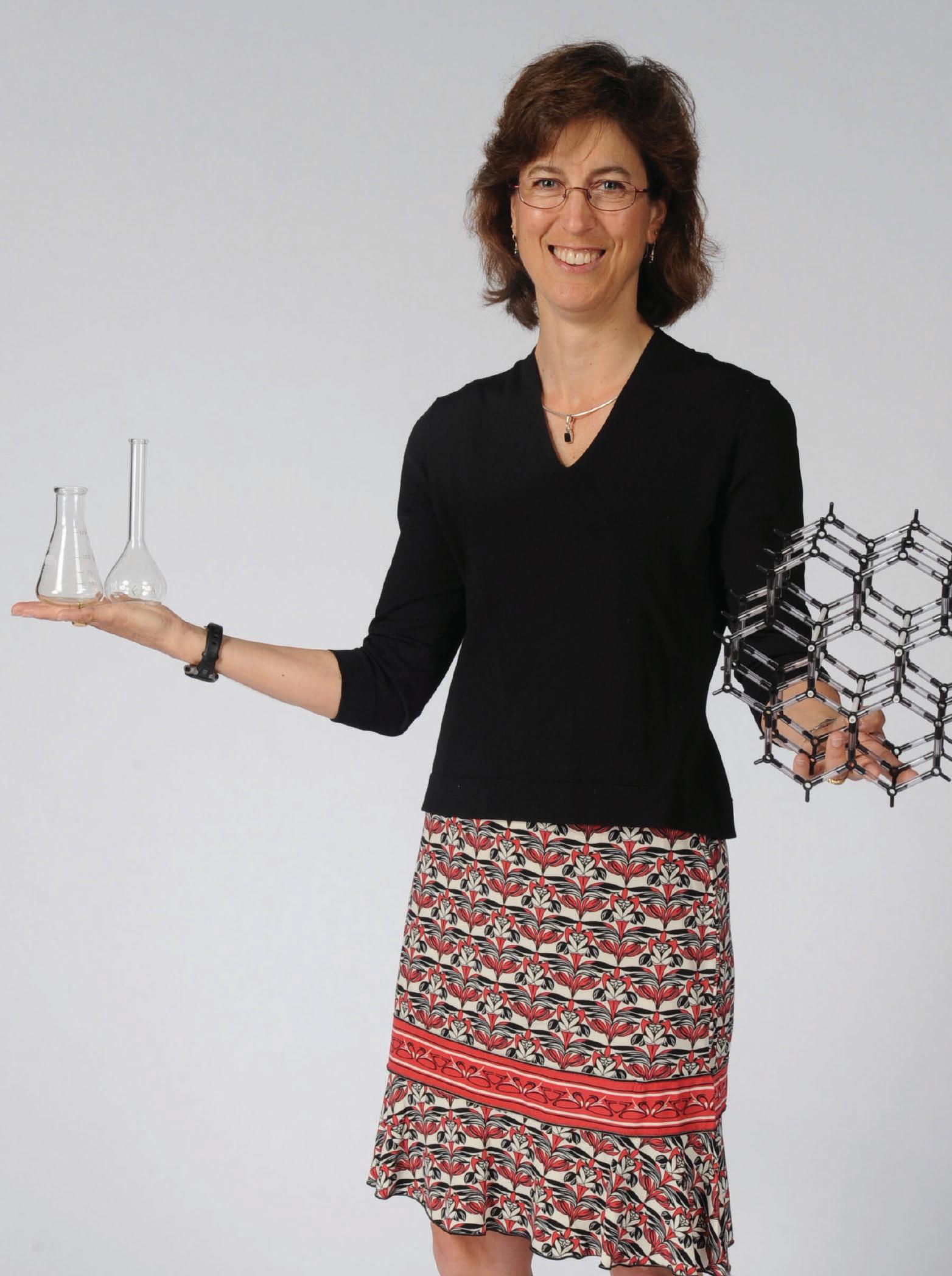



Four faculty members share their path to leadership positions at Westminster, guided by a supportive environment and the sense of belonging and community on the Hill.

Lee Huguley P’19, ’26, dean of faculty and English teacher, took a roundabout path to a career in education. After he graduated from Washington and Jefferson College, in Washington, Pa., in 1996, he worked as a bank teller and a security staff member at a halfway house for federal prisoners. He considered entering the field of law enforcement, before pursuing a career in education. A 1992 graduate of Avon Old Farms, Huguley accepted a position there in 1997 teaching English and coaching football and track and field. He eventually served in various leadership roles at his alma mater, including director of diversity and assistant dean of students.
In 2010, he accepted a position at Westminster as dean of students, a role that allowed him to continue teaching English and expand his knowledge of the independent school world. Huguley has served as form dean for the classes of ’14, ’18 and ’22, and as a corridor supervisor. In 2023, he was appointed dean of faculty and is currently the head coach of track and field.

What makes Westminster great is that we have a good team, and everyone has a specific role on that team. We’re all kind of pulling in the same direction.”
Now, 13 years after coming to Westminster, the community, the quality of life and the support of his colleagues and the administration continue to inspire him. “It’s just been a wonderful place to advance my career and raise my children,” Huguley said. He and his wife, Shayna, are parents of Jaylen ’19, a graduate of Union College; Anaya, a Fourth Former; and, Layla, a seventh grader at Henry James Memorial School in Simsbury.
Community support is a hallmark of the school’s culture, he noted. “If someone is in need of assistance, they inquire among the community, and typically within minutes several people have volunteered to help,” he said. “I like that about Westminster. We are all in it together, and we support each other, regardless of the obstacle.”
He is focused on helping his colleagues be their best selves. “The role of the dean of faculty is to connect with faculty members. How to resolve issues and support them –– that’s the best part of my job,” he said.
That’s not always an easy task. “Obviously, there are times when it is necessary to have difficult conversations, and that part of my job is challenging,” he said. “No one enjoys being critical or criticized. But my thought is that feedback should be given in a very thoughtful and honest way, but also with the idea of being supportive. My view is: I work for them, not that I am the boss.”
Huguley was the first African American to hold administrative roles at Avon Old Farms and first to serve as dean of faculty at Westminster.
“It is an honor to have that opportunity,” he said of his current position as dean of faculty. “But it is also unfortunate that it hasn’t happened before. I am mindful of the fact that I am the first person that looks like me to sit in this office, and I do not take that lightly.”
During his 27-year career as an educator, Huguley’s experience coaching, teaching and in leadership positions has helped him develop a strong connection with faculty members.
“I know what they may be going through. I’ve been there,” he noted. “I never want to be in a position where I’m asking faculty to do something that I’m not willing to do. At the same time, I see the bigger picture and understand as much as something may not be 100 percent comfortable for them, it is necessary for the greater good.”
Long-serving faculty members like Huguley serve as important mentors for younger faculty. “Sometimes I tell horror stories of the earlier part of my career, and they’re like, ‘Oh my God, you guys did all that?’” he joked, referring to the many responsibilities he’s had over the years. “But,” he continued, “it’s important for them to know that although the school is evolving with each passing year, veteran educators have laid a foundation. We must honor that foundation while embracing innovation.”
Aside from his role as dean of faculty, Lee also teaches Third Form and Sixth Form English. In his Sixth Form elective, African American literature, Huguley encourages students to play an active role by leading discussions and posing questions about the content.
In the classroom and on the playing fields, Huguley’s leadership approach is always student-centered. “My job, and my belief, is that I must put the student in position for success. But before that, they need feedback from me, so that they have the tools necessary to reach success. It’s a balance of feedback, interaction and evaluation, so that they’re always aware of where they stand,” he said.
With faculty, as with students, it’s about teamwork. “What makes Westminster great is that we have a good team, and everyone has a specific role on that team. We’re all kind of pulling in the same direction,” he said.

A life-size cardboard photo cutout of U.S. Sen. Bernie Sanders (I-Vt.) wearing his trademark wooly mittens at President Biden’s inauguration stands in the back of Betsy Heckman’s office, a hint of her lifelong interest in politics. “I’ve wanted to be president since I was in the womb,” she joked. When she was five years old, she convinced herself that she would run for president. “I gave that up by fifth grade,” she said. “I knew I didn’t have the right personality for it. I’m way too honest.”
Heckman has always been a keen observer and student of politics. She earned her B.A. at Middlebury College and M.A. at Yale, majoring in international relations at both institutions. Her career at Westminster began in 2004, when she took a job teaching history and AP comparative government.
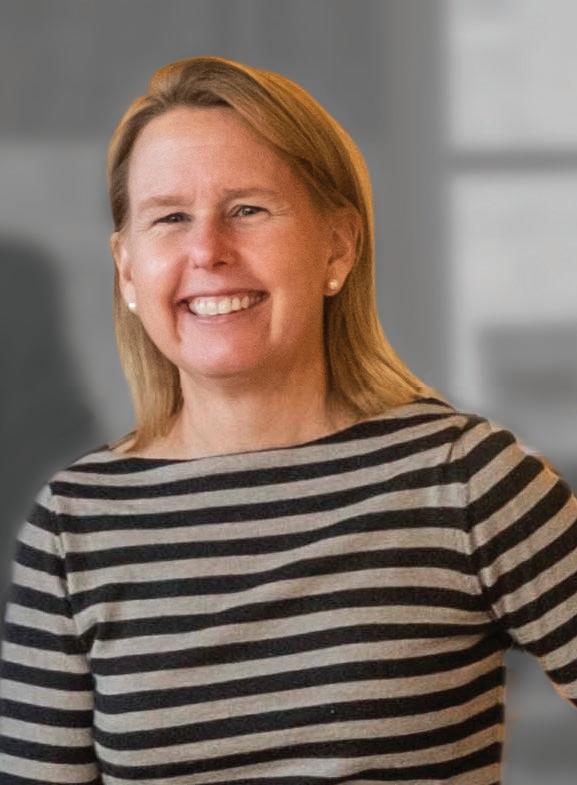
I can’t think of a better way than helping to shape the academic experience for the young people who will be in charge of our future.”
Heckman grew up in San Antonio, Tex., and after working at the Perkiomen School in Pennsylvania and the Berkshire School in Massachusetts, she was looking for an independent school that could be her “forever home.” She knew she had found it at Westminster when she attended a faculty reception the evening before she interviewed for the history teaching position.
“I was overwhelmed by how friendly and collegial the faculty was, and I knew that these were people I wanted to spend my career with. And that hunch proved correct,” she recalled.
In 2006, Heckman became the history department head; in 2020, she became director of studies before accepting the position of academic dean in 2022. She currently teaches AP comparative government, advises model United Nations and coaches cross-country. Since 2008, Heckman has also been a reader for the AP comparative government exam and co-chair of the AP comparative government and politics development committee.
As a single mother of a young child, Heckman said, she appreciated the support of the school, which gave her flexibility with her schedule and encouraged her to take on new responsibilities that allowed her to grow professionally. Her colleagues supported her through her early years when she was raising her son, Will, now a senior at Tabor Academy in Marion, Mass. “I could have never done it without them,” she said, referring to her colleagues who helped her with
childcare and rides to and from school and athletic events.
Heckman said her biggest challenge is juggling her duties as a teacher and academic dean. She oversees every aspect of the academic program, from small details to big-picture planning. “I enjoy the full range of responsibilities, the minutiae of scheduling and organizational details that require a love of problem solving,” she said.
But, she notes, “I have always been a teacher first and foremost. Fortunately, this position allows me to spend most of my energy thinking about the ‘school’ part of school.” Even though academic dean is largely an administrative position, she still has a great deal of interaction with students as a teacher, advisor and, in previous years, a coach.
“The energy is great being around students. Just to have the opportunity to work with young people who are still in such a formative moment, it gives me great purpose every day to do that. It makes my life incredibly fulfilling,” she said.
As a teacher, Heckman said, “I am much more focused on the skills than the content. In our constantly evolving world, analytical skills are what young people will need to adapt to the ever-changing landscape. They must be able to think critically, communicate effectively and collaborate.”
As academic dean, she works with department heads to craft an academic experience that is both rigorous and engaging for students. She has found that students react well to being held to high standards if they can see value in what they are learning; there is no higher compliment for her as a teacher, she said, than when a student tells her, “That was hard, but it was worth it.”
Whether working on the school’s strategic plan or teaching in the classroom, Heckman is constantly attuned to how students are learning and looking to move the needle forward academically. That means constantly evaluating, revising and asking questions. Those challenges keep her immersed in her leadership role at Westminster.
“All I have ever wanted is to make a difference and for my life to have meaning,” she said. “I can’t think of a better way than helping to shape the academic experience for the young people who will be in charge of our future.”

From a young age, Jessica Keough knew she wanted to build a career at an independent school. After graduating from Trinity College, she spent two years teaching and coaching at Hebron Academy in Maine before accepting a position at Westminster in 2008 as an admissions officer. But it was her own experience as a student at Tabor Academy in Marion, Mass., that opened her eyes to the potential of a boarding school education.
“It changed my life,” she said. Before attending Tabor, she went to public schools in her hometown of Scituate, Mass. In her freshman year of high school, she was on her way to becoming a formidable ice hockey player. But at that time, in the late ’90s, there weren’t a lot of opportunities for girls to pursue hockey in public schools, she said.

It’s about the human experience. Seeing students come out on the other side of adversity or personal growth is incredible.”
Many of Keough’s teammates decided to attend boarding schools with successful girls’ hockey programs, which piqued her interest. Beyond the opportunity to play more competitive hockey, she was looking for “the kind of educational environment that focused on the development of the whole person and provided the support and care from adults that a boarding school offered,” she said.
“At Tabor, I felt like my whole world shifted. I was meeting kids from all over and adults who were pushing me in ways that made me feel like they knew me,” Keough continued. “When I graduated from Trinity, I knew my career path would be to land a job at a boarding school so I could pay it forward — be the advisor, the coach, the teacher that others had been for me.”
She came to Westminster because of the incredible welcome she received from faculty members, who made her feel like she could have an impact at the school. Coming to Westminster also afforded her the opportunity to build her career while earning her master’s in liberal studies at Wesleyan.
In her time at Westminster, Keough has married and started a family. Her husband, Jay, currently serves as the associate director of admission and coaches boys’ soccer and hockey. They are raising their two sons on campus: Francis, 9, and Patrick, 7.
Since arriving on the Hill, Keough has served in multiple capacities, including as a history teacher, advisor, form dean for the Class of 2017, dean of faculty and a coach for girls’ field hockey, ice hockey and lacrosse. She served as the head coach for the girls’ hockey program from 2018 to 2022. Her dedication to the school earned her the Walter Edge Jr. ’35
Master Chair in 2020, which recognizes a distinguished teacher whose performance sets a standard of excellence for others, and the Swayze Award in 2017 for outstanding contributions to the life of the school.
Last year, she accepted the position of associate head of school, a role that focuses on the day-to-day operation of Westminster, with an eye toward serving its mission and securing its future.
Since stepping up as associate head, she said, “It has been an honor to work with Elaine [Head of School Elaine White], who has a commitment and passion for this work that is truly impressive and contagious.”
Keough is dedicated to ensuring the smooth functioning of the school by working in all areas of school life. “I like the scope of the position. It’s a busy job, but being helpful and of service to this community is rewarding,” she said.
The position requires her to constantly shift gears throughout the day, which she enjoys. “I like that I can teach, coach and be in the dorm. I can still have all those parts, while I have a role in the administration of the school.”
In some ways, the biggest challenge of an associate head is working with many faculty and staff while also concentrating on the success and well-being of the students and the school’s day-to-day operations.
“Westminster is so special,” she said. “It’s been the most formative institution in my life, so I think a lot of my role is about taking care of this incredible place.”
She credits her community of peers with helping her in that effort. “We must work very hard to help secure and cultivate the community as it pertains to our students. As faculty and staff members, we also really value each other. We listen to each other. Having that kind of community of adults is paramount.”
Beyond administrative duties, Keough also enjoys teaching Contemporary World History Honors and serving as a student advisor. “I really love being in the classroom. It allows me to exercise my teaching philosophy, which is about getting to know the students first.”
At the end of the day, her rewards as teacher and associate head come from watching students succeed. “It’s about the human experience. Seeing students come out on the other side of adversity or personal growth is incredible,” she said.

Theater is A-men Rasheed’s passion. Before arriving at Westminster in 2010, he and his wife, Jessica, lived in New York City, where he worked as a teaching artist at the Classical Theater of Harlem and freelanced as a guest director with student playwrights at Fordham University’s Lincoln Center campus. He toyed with the idea of becoming a professional director, but he and his wife wanted to start a family, and he needed a more secure job. So, after earning his second master’s in educational theater at City College of New York, he applied for theater director positions at independent schools around the Northeast. Westminster was on his list, so one weekend, Rasheed decided to attend a Dramat production while visiting his mother and friends in Waterbury, Conn., where he grew up. Not only was he impressed with the students and the Werner Centennial Center, but he was overwhelmed by the warm welcome from faculty and students he received.
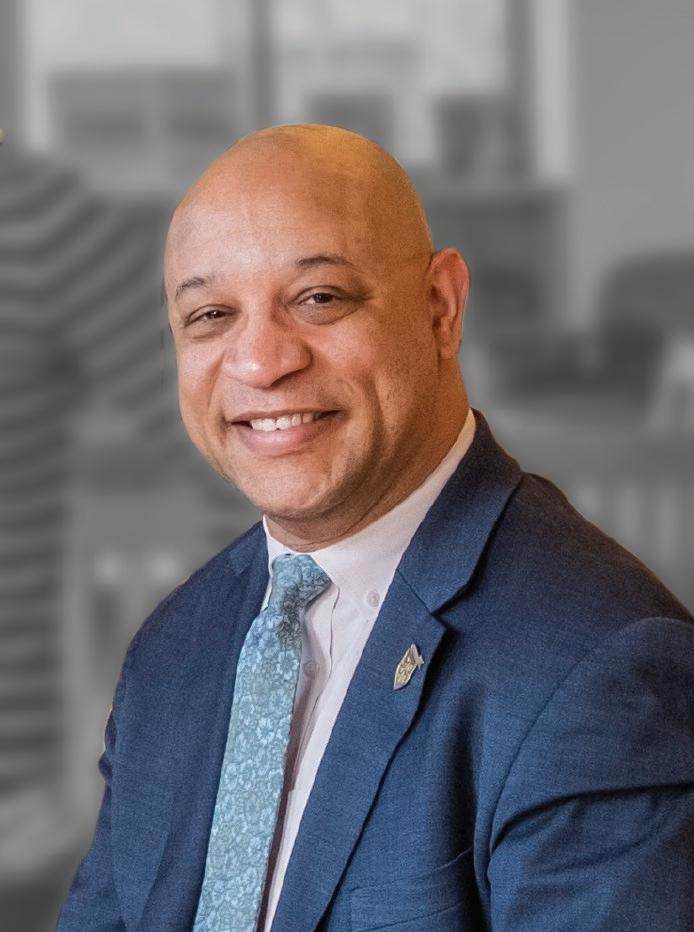
I can’t imagine a position where I’m not able to directly work with students. I wouldn’t want to make decisions about students’ lives without understanding what they are going through.”
“I was impressed and moved by that community feel. I still, to this day, feel it is real, and at all the other schools I interviewed with, that was the component that was missing,” he said.
After arriving at Westminster in 2010, he quickly embraced the challenge of building up the theater program. He started with around 18 students in the program. Now, there are up to 40 students who either participate on stage or in the technical theater program. Today, Rasheed is among the department’s longest-standing theater directors and the first African American person to lead the department. He and Jessica now have two sons — Kareum, 13, and Malcolm, 9.
He enjoys working with students who have an aptitude for theater. “But,” he says, “I’ve also really enjoyed working with students whose passion for theater may not have been their initial calling. I’ve had top scholars, head prefects, junior prefects, athletes — a whole range of students become involved in our productions.”
In the classroom, his forte is theater games and improvisation and teaching theater history and film studies. “It’s fun for me because I teach the same content, but I can change up how I do it each year as personalities change from one year to the next. Some students may be more interested
in filmmaking than scene study, so I adapt to the students’ particular interests.”
Seeing the positive influence he had on students in the theater, the classroom and the dorm, he applied and was accepted as dean for the Class of 2021. He then became the dean of student life in 2022.
Beginning in the 2024-25 academic year, his title will shift to dean of residential life. He will continue to oversee residential life, social emotional learning and the student leadership program, with a greater focus on a comprehensive residential life curriculum.
Rasheed’s dedication to students earned him the Swayze Award in 2014, given to a member of the faculty for outstanding contributions to the life of the school. In 2018, he was the recipient of the O’Brien Award, which recognizes a faculty member who has been especially selfless and generous with time and care in the nurture and support of students.
“It has always been my hope to reach our students in positive ways,” Rasheed said. “I can’t imagine a position where I’m not able to directly work with students. I wouldn’t want to make decisions about students’ lives without understanding what they are going through.”
“I’m here for all of our students,” he added. “I aim to be as accessible as I can be with our students and families and work with them in the most equitable way to serve their needs.”
Building strong connections with student leaders and working alongside faculty is crucial to his role. This year, he worked with Devonna Hall P’25, dean of diversity, equity and inclusion, and Tim Joncas ’00, athletic director, to strengthen the student leadership program by providing on-going training and workshops through the Bruyette Leadership Academy. Last fall, his office launched a student RA program, which will expand beyond Alumni and Gund dormitories next year.
As a teacher and an advisor, Rasheed is aware he has an impact on the quality of students’ day-to-day lives. He values the one-on-one communication he has with each student. “It’s important,” he said, “to help make the community a place that students feel valued and that they can call Westminster their home.”
Charlie Griffith P’11, ’14, ’17, associate dean of faculty and director of the Westminster Teaching Initiative, attended two conferences last summer on generative AI and its implications for teaching, learning and classroom best practices. Kelly Curtis P’24, director of learning support, attended the Boston Learning and Brain Conference last fall. Below, they share their takeaways and how they can incorporate what they learned into the classroom.


Given my responsibilities supporting the professional development of the faculty, AI is of particular interest to me. As astute observers well know, AI has garnered a lot of attention and created some anxiety in educational circles. Both daylong conferences — one at the Hopkins School in New Haven and the other at local neighbor Loomis Chaffee — addressed some of these concerns but focused primarily on the very real opportunities for enhancing our students’ experiences and learning opportunities. Westminster has, like most of our peer schools, decided at present to encourage the use of AI in specific, controlled classroom exercises and assessments and to address its misuse or abuse in the same way we consider other instances of violating our expectations regarding academic integrity.
In its most productive approaches, AI can function as a “personal tutor” for students as they work through a math problem or craft an essay — both conferences had very good sessions on helping students learn what questions to ask, and how to phrase them in ways that would not simply lead to AI giving them the answer but rather helping them work toward the answer. Other sessions were built around sharing school experiences and best practices; these were extraordinarily helpful in leading us to a better understanding of AI and how it will be a powerful tool in schools and in our students’ futures. Whether it be in the humanities, social sciences, natural sciences or the arts, AI will be present in schools and in our lives. Helping our students learn about its potential and how to use it productively will be a key part of the Westminster experience. Financial support for faculty development, as in the valuable experiences of these two conferences, is essential to ensuring that Westminster’s faculty remain ready and able to meet the challenges of an always rapidly changing educational landscape.
Last fall, I attended the Boston Learning and Brain Conference, which focused on strategies for improving memory, health, happiness and well-being.
Dr. Robert J. Waldinger, a professor and researcher at Harvard, stressed that students learn more effectively when they are happy and healthy. He mentioned that social media and commercials can often affect high school students’ level of happiness, because they are constantly comparing themselves to others. Instead, they should prioritize their health and form solid connections with their family and peers. We need to teach students that experiences are what makes us happy. Instead of holiday gifts, he suggested taking children on a trip to develop lasting memories. Building experiences could be as simple as traveling with your teenager to visit schools and day trips to the beach. He also mentioned family dinners (without phones) and being part of a community build the support students need to thrive.
Dr. Elizabeth Kensinger from Boston College spoke about the memory cycle of the brain and her formula for effective learning, called FOUR, which stands for Focus Attention, Organize, Understand and Relate. At Westminster, we already teach this strategy to students. We ask the students to find a quiet space or use noise-canceling headphones to focus their attention on what they are learning. Then, they organize their workspace and materials. To fully understand the information, we teach learning over a period of time, rather than cramming. We also stress the importance of sleep and exercise (key for the brain). Students are encouraged to use books, artwork, videos, memories from class trips, etc., to understand the assignments. Kensinger said the brain repeats the memory cycle while you are sleeping. Sleep promotes the creation of new cellular connections and growth factors. Exercise also helps improve sleep and mood, reducing stress and anxiety. She offered strategies for students to use when they are stressed, including meditation and breathing exercises.
Dr. Shana Carpenter from Iowa State University spoke about effective learning and memory practices. Her presentation reinforced the process we use to teach students how to avoid distractions and study more efficiently. She said, “Knowing information means you are able to explain the material to someone else.” Just re-reading a passage in a book or your notes may not be enough to prepare for a test. Self-testing 30 minutes after reading or writing something down is a great strategy. Planned study breaks where students can stand up and walk around for a few minutes help them relax and refocus.
Last November, Director of Legacy and Leadership Giving Jennifer Keyo was honored as the National Association of Charitable Gift Planners 2023 Rising Star Recipient.
The award recognizes the talent of a professional new to charitable gift planning. Since she began her work in the gift planning community in 2017, Keyo has collaborated with nonprofits to implement national standards within their organizations and strengthened professional development opportunities in the planned giving community.
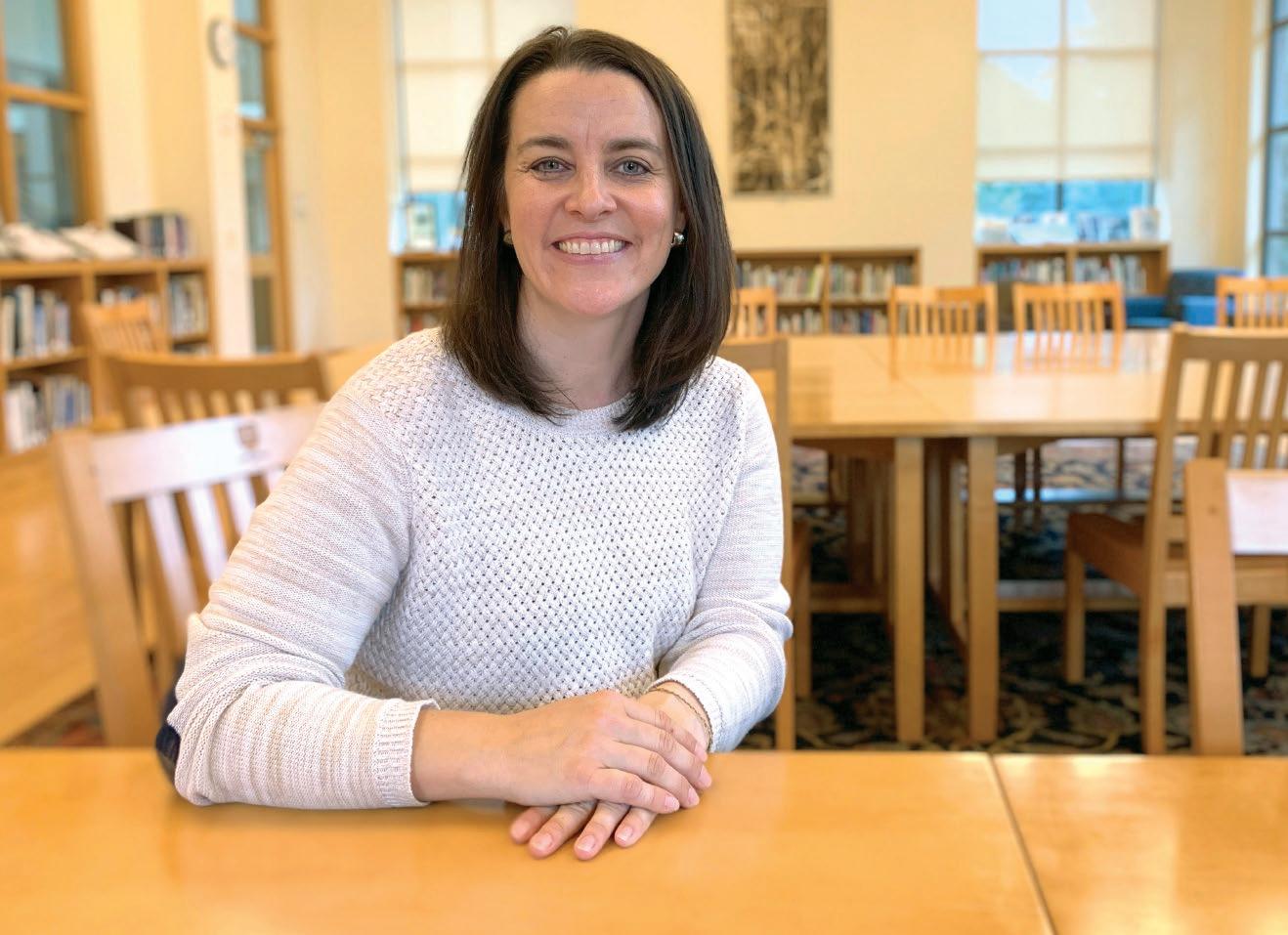
The award encourages recipients to consider a lifelong pursuit of the field and continue active membership in their local councils and national association.
Keyo travels across the country to connect with members of the Westminster community and other individuals interested in supporting the school’s mission and programs. At Westminster, she developed the Seventh Form, increased Thring Society membership by 25 percent and enhanced Thring Society stewardship. Before joining Westminster School, she acquired significant expertise in annual giving and advancement operations during her 10-year tenure in the Institutional Advancement Office at the University of Hartford, where she earned her master’s in communications. She completed her undergraduate studies at Saint Mary-of-the-Woods College, earning a bachelor’s in business and marketing. In 2017, Keyo took over leadership of the Boarding School Gift Planners,
a group of over 20 schools, where she runs two conferences a year covering all aspects of planned giving. In January 2021, Keyo was appointed to the board of directors of the Charitable Gift Planners of Connecticut. She has served as president, spearheading efforts to curate engaging topics and secure topnotch speakers for their educational initiatives.
She has been instrumental in devising a fresh programming format to help nonprofits across the state understand planned giving basics as well as boost membership in the post-COVID era. In addition to the program committee, she is a founding member of the Diversity, Equity, Inclusion and Belonging committee. Keyo has also collaborated with the National Association of Charitable Gift Planners in implementing the National Planned Giving Standards. In 2022, she received her certification as a specialist in planned giving.
All Martlets can make a mark on Westminster by supporting the aspects of life on Williams Hill that are most important to them. Here are the priorities that you can choose to support:

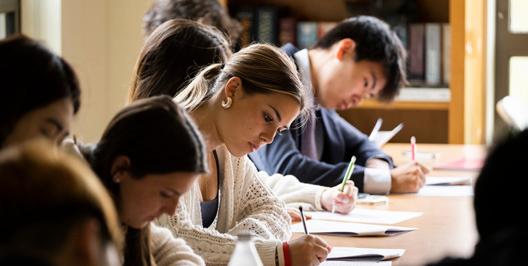

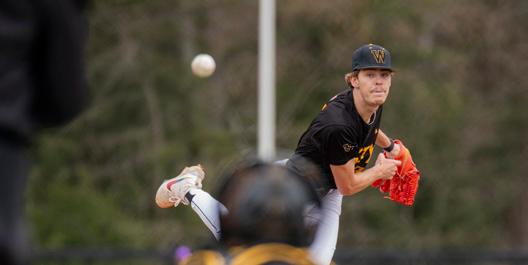

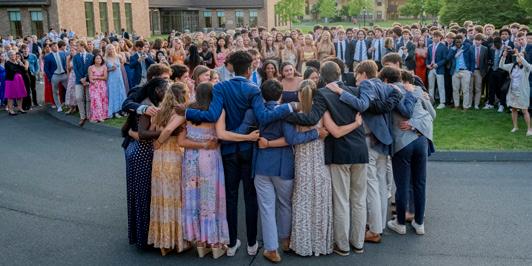

 Photo by Gigi Filippetti ’26
Photo by Gigi Filippetti ’26
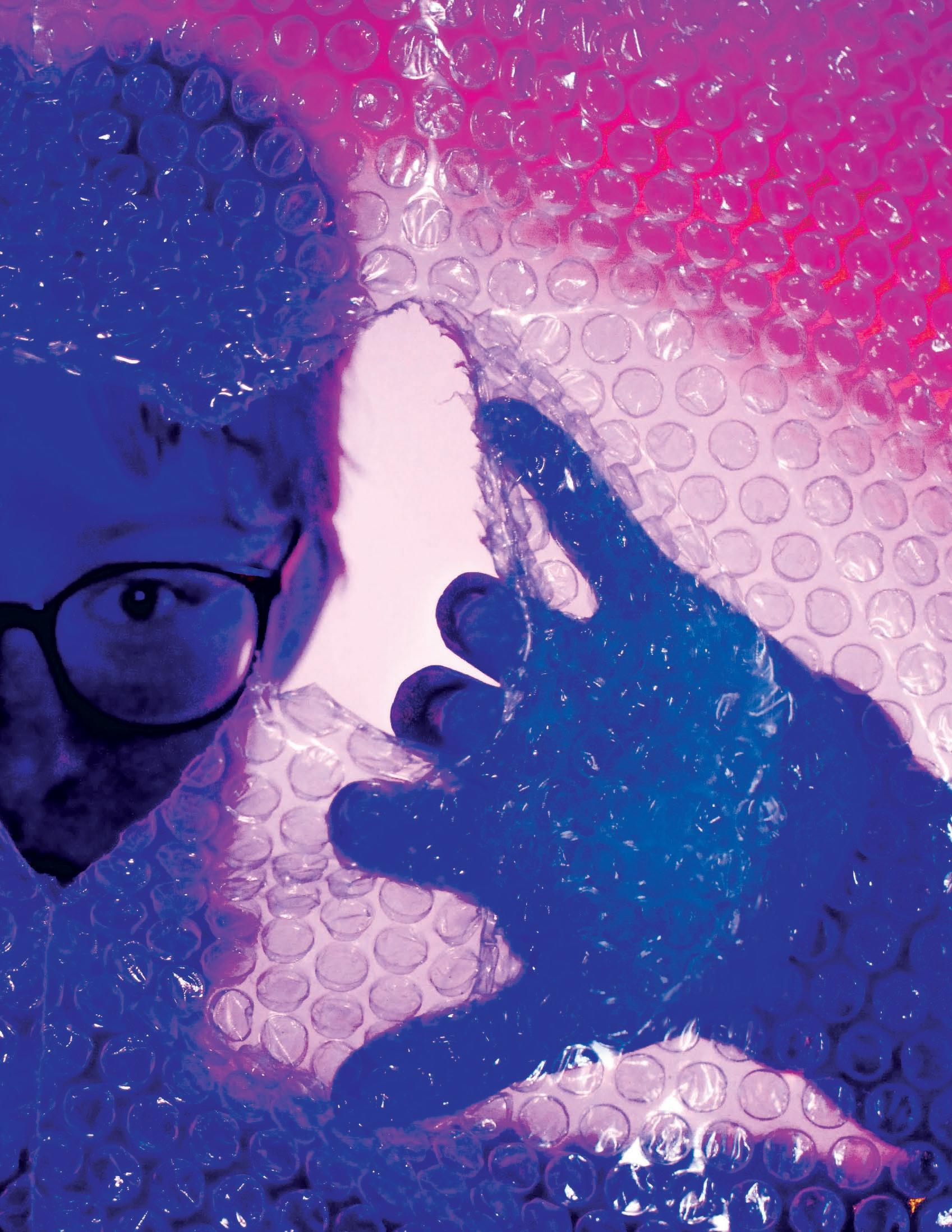
Artificial intelligence is evolving at warp speed and becoming more accessible to larger audiences, who are discovering innovative uses for it. Recently, the Bulletin spoke with three alumni working with AI about their thoughts on its benefits and dangers.
Can you spot a deepfake? Sounds and images digitally manipulated to misrepresent reality have become easier to make, harder to detect and more commonly used by bad actors for their personal gain. Halsey Burgund ’91 began his first real foray into AI by codirecting “In Event of Moon Disaster,” an immersive, multiplatform project that uses technology to produce a fake news broadcast that might have aired if the 1969 Apollo moon landing had ended in failure.
“In Event of Moon Disaster” premiered at the International Documentary Film Festival Amsterdam in 2019. Burgund and his colleagues created a news broadcast featuring the putative voice and image of Richard Nixon addressing the nation following the stranding of the Apollo astronauts on the moon. That address was written by Nixon speechwriter William Safire in case there actually was a moon disaster. Of course, it was never delivered. The astronauts returned to Earth, very much alive.
To make the broadcast more convincing, Burgund and his team built a 1960s living room, complete with an old, four-by-three tube television and period furniture. “It created a space where people could step back in time to a moon landing party. The physical installation increased the realism of the experience,” said Burgund.
The project’s website, moondisaster.org, which launched the following year, gives a behind-the-scenes look at the process and tests viewers’ ability to spot deepfakes. “Disinformation is getting easier to both create and distribute,” Burgund said. “We need to be aware of the possibilities and minimize the harm from bad actors.”
At Westminster, Burgund was a talented drummer, and he pursued his love of music by playing in bands as an undergraduate at Yale. After earning a B.S. in geophysics, he designed and built furniture and worked in the tech industry before returning to music as a sound

artist. Burgund’s early work focused on collecting recordings of music, sounds and human voices in interactive audio installations for museums, including the Smithsonian.
Currently, he is the creative technologist-in-residence at MIT’s OpenDocLab, where he acts as a resource for MIT fellows and helps them with their documentary projects. Burgund is also the creator of Roundware, a geo-located, audio-augmented reality platform that allows participants to both listen and contribute to audio compositions that are embedded into physical landscapes, such as public parks. Initially, he built the technology for sound art installations, but it has since been used for museum audio tours and other educational purposes.
Today, he is still working with voices, only they are often AI generated. “The human voice is authentic and personal. You learn a lot about who someone is
by listening to how they speak. Now, I am creating synthetic voices and trying to use them to speak to different sorts of truths, as well as the challenges of modern society.”
AI can be so convincing, he said, that it tricks people into believing what it generates is true and accurate.
“It is human nature to believe things that are presented authoritatively,” said Burgund. “When technology is new enough, we are not comfortable with how we should use and interact with it.”
He uses Photoshop as an example. “Today, everyone is aware of it. We look at images and wonder if they may have been manipulated. But photos have not fallen out of documentary reality because we have the experience to question, ‘Is this a reputable journalistic source? Is it manipulated to represent something that isn’t the truth?’”
Burgund’s latest piece is “Vocalize,”
a new interactive experience that premiered in March at the Copenhagen Documentary Film Festival. Visitors are invited to participate in voice training with Hayley, an AI-enabled voice coach, and create a showreel for a voice talent agency. However, the experience comes with a warning: “Vocalize’s powerful AI vocal training may have a darker side. Will she unlock your potential, or does she have a hidden agenda?”
“We are still trying to keep exactly what happens in the experience a mystery,” explained Burgund.
He said he hopes to exhibit “Vocalize” at other festivals and museums as well as release it online later this year. “AI technology is advancing so quickly, in another year it might be quaint.”
Burgund and his wife, Laura, live in Bedford, Mass. They have two sons, Duncan, 12, and Julian, 9, who regularly experiment with ChatGPT, Pi and DALL-E, a program that can create realistic images and art from a text description.
“It allows them to create new imaginative worlds,” Burgund said. “I’ll hear one of them say, ‘DALL-E, create a frog driving a Lamborghini-themed semitruck.’ One could say it is problematic, using AI instead of drawing it himself, but it opens new opportunities to play and explore.”
While AI can be used to create deepfakes, it can also be used in innovative ways to achieve positive outcomes. “The best-case scenario is humans working together with AI. For example, I use ChatGPT to help code. The process is more powerful than working on my own. But where AI goes unchecked by fleshy intelligence is not a good situation.”
In his view, government needs to regulate AI in some way. “I have faith that AI will be used by many individuals to maximize the upside of the technology, but if people have to spend an hour to determine if something is true, we won’t believe anything, and that’s not a great society to live in,” he said. “I hope that my art projects can help nudge society in a prosocial direction and give people impactful experiences at the same time.”
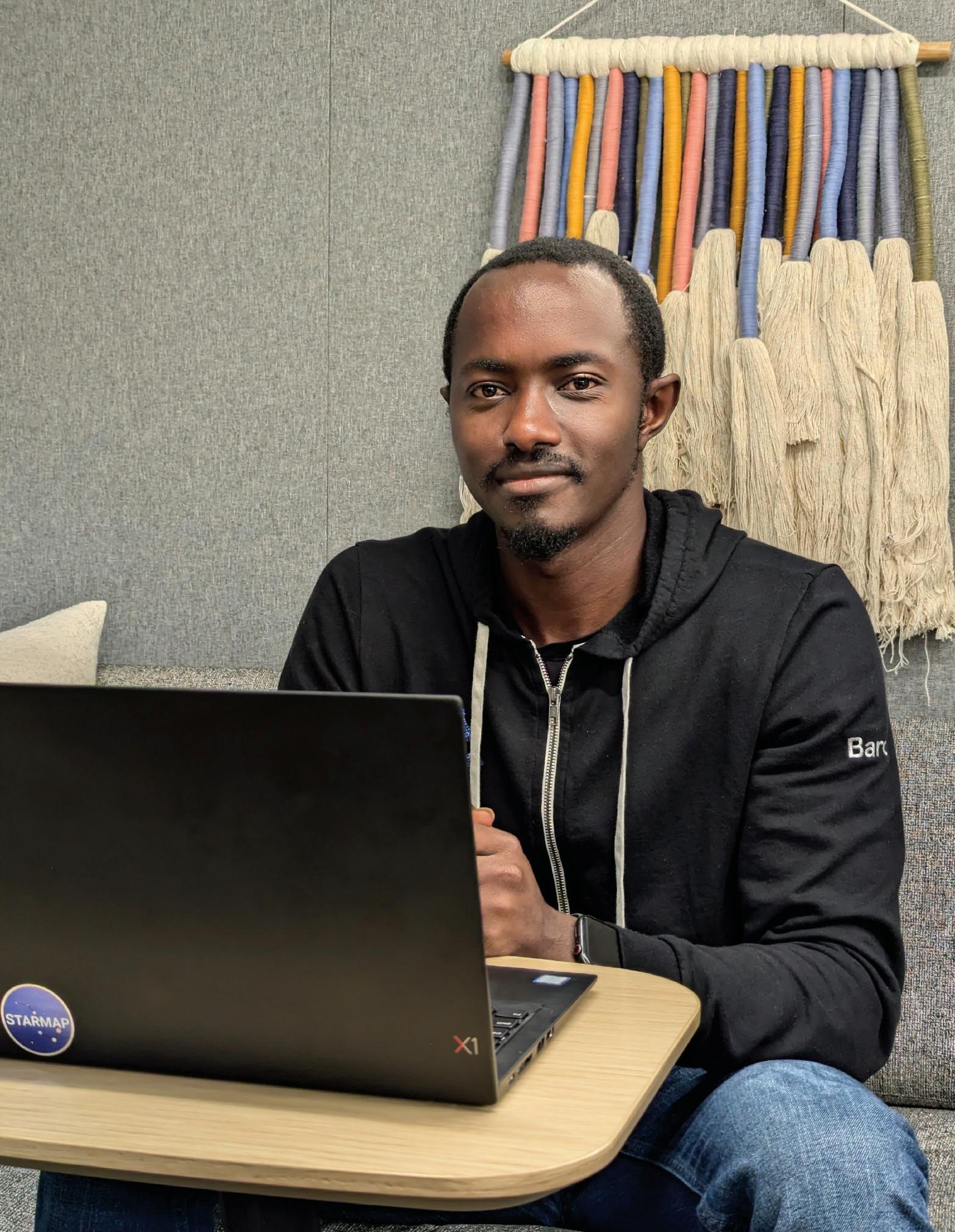
As a product manager on Google’s Gemini team, the work of Kwaku Akoi ’10 is focused on developing generative AI products — programs that produce images and text in response to prompts — for the general public. “It’s a new area,” he said. “Those of us who work in AI are figuring it out as we go along, laying the train track as we guide the train.”
In the last decade, AI has moved rapidly from the research laboratory to personal devices. “As far back as 2013, I knew about machine learning, but it was more in the domain of research,” he explained. Today, Akoi said that the more
his team learns about AI, the more they can focus their efforts on developing it to assist people with routine tasks.
What does that look like? “For example, the process of brainstorming ideas: If I have a rough idea and I am struggling to articulate my own thoughts, I can work with Gemini to flesh things out,” said Akoi. “It is information-seeking beyond a regular Google search. It’s more nuanced. Gemini will have a dialogue with you and ask questions. You can get really good results for what could typically take hours.
“We’re now at an inflection point
where AI has finally made it into mainstream usage,” he said. “We’ve gone from background applications like fraud detection in financial transactions or simple Q&A interactions with Google Assistant to much more complex and nuanced, multi-turn conversational exchange and generative media.”
The lingering question is whether AI technology will ultimately benefit or harm society as a whole. “I am optimistic the gains will outweigh the harms, because we can now direct the power of these models at some of humanity’s most persistent problems,” he said. “Some of the largescale applications that excite me the most are in domains like drug discovery, conditioning agricultural systems to be more climate-resilient and advancing materials science to help unlock cheaper, cleaner energy.”
When Akoi joined Google in 2021, he worked on systems that supported Google’s efforts to align ads with user preferences. “We used machine learning to help users with ads that reflect their declared interests,” said Akoi. Within two years, he joined the Gemini team to work on the cutting edge of consumer AI products.
Akoi said he and his colleagues at Google are cognizant of the potential dangers of AI, and they grapple with how best to mitigate them.
Akoi cited Google’s SynthID, which generates an imperceptible digital watermark embedded in the pixels of AI-generated images, which contains a source tracking code. It is a security measure meant to discourage and deter piracy while determining the validity and ownership of digital media. But, Akoi cautioned, “In generative AI, we cannot account for all of the ways the product might be used. A benign capability could be repurposed beyond its intent.”
As an economics major at Wesleyan University, Akoi saw the potential for the positive application of machine learning. During his junior year, Akoi worked with a team of students who examined how to increase youth employment in developing countries — particularly in Ghana, where he grew up. Together, they created JooMah, an online job
recruitment program, to help combat the country’s high unemployment rate. JooMah helped employers in Ghana receive and manage job applications from job seekers. The cornerstone of the platform was a machine-learning algorithm that automatically identified the best candidates.
“In Ghana, I have seen how important technology has been to the economic transformation of the country. From the 1990s to now, technology has helped lift people out of poverty, improve health outcomes and increase education levels,” he said.
As part of Westminster’s first class of Davis Scholars, Akoi was an accomplished science student. He began his studies at Wesleyan as a chemistry
major. “By the time I knew I wanted to study computer science, it was too late to enter the program, but I was able to turn to economics as a major. It gave me a broad perspective for how technological progress shapes economies and societies as a whole.”
Akoi and his wife, Oparah, met on their first day at Wesleyan and recently celebrated their 10th wedding anniversary. They live in Dallas, Texas, with their three young daughters: Laurel, 5, Jasmine, 4, and Iris, 2.
“A year ago, if you asked me if I would be here, I would not believe it. It all happened so quickly,” said Akoi. “It is exciting to work on the cutting edge as AI goes mainstream.”
David Armitage ’74 remembers his first experience working with computers, at Westminster in the fall of 1972.
“We returned from summer break, and there was a computer on campus tucked away in a small, windowless room,” Armitage said. Many of his classmates and teachers had never seen a computer, and no one knew how to use it. The machine had no hard drive and no screen — just a teletype terminal.
“There was no one teaching computer science,” he said. “We barely knew how to turn it on.” Armitage’s grandfather worked at IBM and taught him some basic coding language to get him started. Westminster had given Armitage and other students access to a computer; now, they needed curiosity and tenacity to figure out how to use it.
That moment set Armitage on a path toward working with advanced technology. In 1982, with a B.S. in geology from St. Lawrence University and early career experience in the oil and gas industry, Armitage founded GeoGraphix, one of the world’s first
commercial geographic information system companies. The company used computers to draw geological contour maps, previously drawn by hand.
“Everyone said we were nuts to do this on a PC. We couldn’t afford anything bigger, so we just made it work,” Armitage said. “Back then, the idea of scientific applications on a personal computer was almost unimaginable.”
Twelve years later, he sold the company to oil giant Halliburton. Armitage went on to found a few additional tech-related companies, including an early internet tablet company, a startup that utilized predictive analytics to reduce driving accidents, and one that monitored methane gas emissions to address climate impact.
Armitage’s latest venture, an artificial intelligence-driven platform called Alice, was inspired by a desire to help parents connect and interact with their children.
“There’s a mental health crisis in our society,” he said, “and a huge imbalance between supply and demand for mental health services.” Armitage lives in
Fort Collins, Col., with his wife, Kerry Stutzman, who is a licensed marriage and family therapist. “We got married in 2012 and both brought three kids to the party. For a while, we had five male teenagers in the house who seemed to take great pleasure in throwing curveballs at us,” he said.
In 2022, the couple started discussing the implications of AI in the world of therapy and parenting. “I thought AI might be used to augment the incredibly important services mental health practitioners are providing,” Armitage said. “Alice is a tool that would help make therapy more accessible, more affordable, and complement the work of the professionals.”
Mainstream AI technologies, like OpenAI’s ChatGPT, Google’s Gemini, and Anthropic’s Claude are built using vast repositories of information from across the internet. Based on the content these programs, called large language models, metabolize, they can produce responses that have the potential to transform our world. These same systems can also generate output that have no basis in reality, are inaccurate or inappropriate. Armitage says this is a huge issue for the entire, rapidly evolving world of AI.
He decided to take a vastly different approach with his platform. Alice, the parenting support system he has created, is constrained to a specific domain of expertise. Alice relies on a carefully crafted database of specific sources, focused on this particular topic.
“Generalized AI does not provide deep domain expertise, and the language models they run on do not account for nuance,” Armitage says.
To build Alice, Armitage enlisted input from a number of parenting experts and therapists, including his wife, to integrate their expertise. Currently, the project is undergoing active development with a small number of highly engaged parents accessing and contributing to Alice’s evolution.
“I had professionals share the approach they would take in certain situations and then would codify that in my system so it would simulate the interactions of a professional,” Armitage
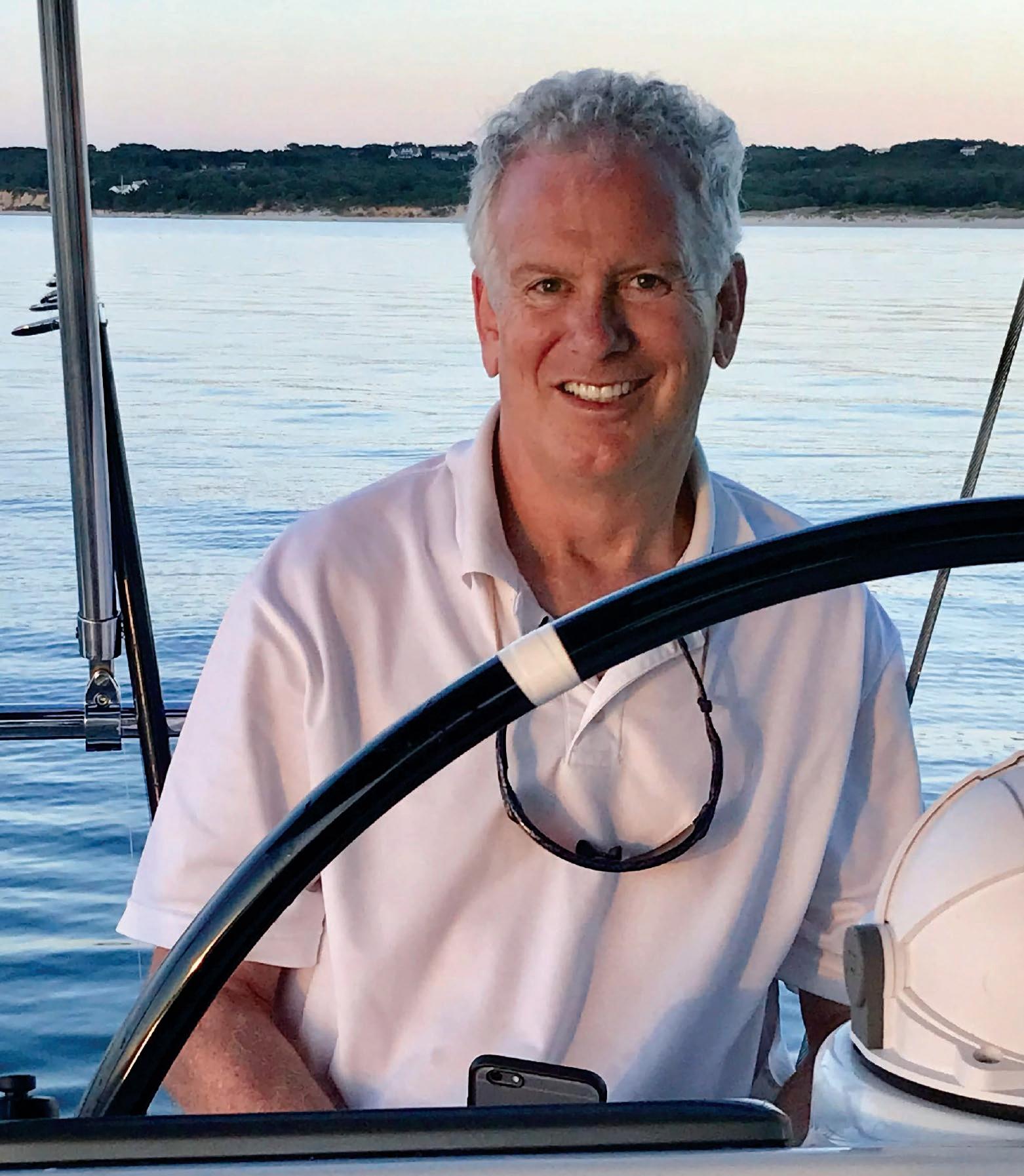
said. “It requires a lot of precision and patience to create the right prompts.”
For specialized applications of AI, eliminating inaccuracies, constraining the responses and standardizing the output are critical. Armitage is quick to note that AI is not a replacement for therapy; in fact, a disclaimer on the Ask Alice platform emphasizes that the program is not a substitute for in-person therapy but can help supplement it.
Alice enables parents to create a simulated interaction with their child using some basic descriptors, like age, personality characteristics and a general description of an issue or a challenging situation. “As the parent simulates the conversation through the platform, Alice provides real-time coaching,” Armitage said. “Imagine being able to go through a practice session with a coach looking over your shoulder before going ‘live’ with your teenager.”
While Alice is still in its infancy, Armitage said it can provide a sounding
board and augment the work of parents, coaches and therapists. “Ultimately, my hope is that Alice will help everyone become better parents and support confident, resilient, healthier young adults,” he said. “At this point I consider Alice to be an interesting social and behavioral experiment.” If Alice continues to provide useful support, then later this year, Armitage expects to make the platform more widely available through social media.
Armitage continues to tinker with technology and learn from it. He said that the logical analysis, problem-solving and interpersonal skills he honed at Westminster have been the cornerstones of his career success.
“Westminster afforded students access to opportunities, and if we took advantage of them, they could be game changers,” he said. “Access to that hulking, now antiquated beast of a computer turned out to be the catalyst that defined my career.”
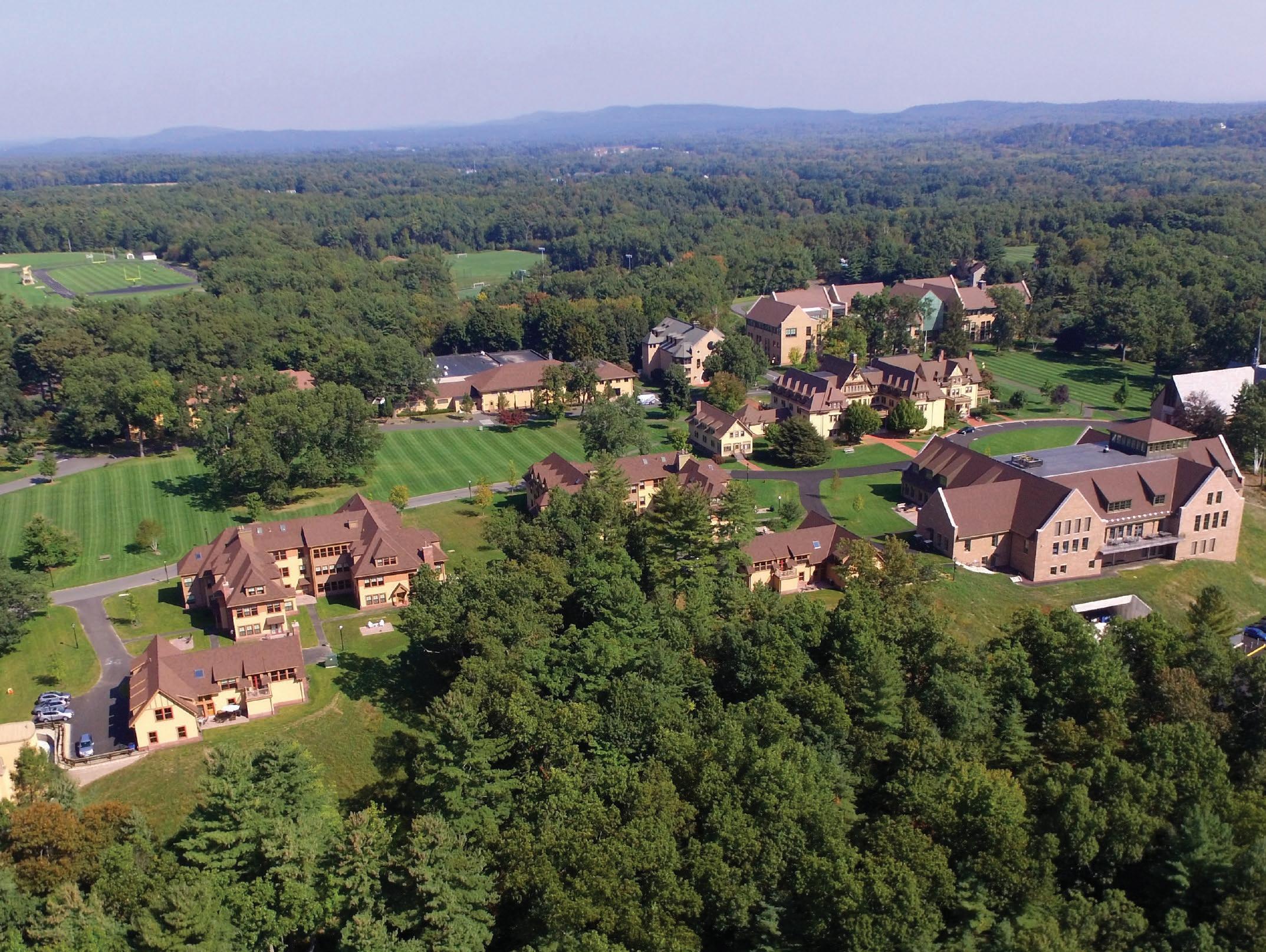
Jamie Slimmon Somes ’76 and her father, Jim Slimmon ’45, walked the same paths across campus but had two very different Westminster experiences. Jim attended a small, all-male school shepherded by Westminster legends Francis “Pete” Keyes P’65 and Gardner Pettee. The structure and discipline provided him stability in a world at war. At Westminster, he developed leadership skills, preparing him both for military service right after graduation and a distinguished career in insurance.
When Jamie attended Westminster, the school was struggling to define itself as a coed institution and trying to keep pace in a country that was witnessing profound changes. Jamie learned self-advocacy from Mary Ann Leavitt, director of girls’ athletics, and in college she was surprised to find so few women speaking up for themselves. At Westminster, she developed a passion for history from Dick Adams P’93, modeling her experience as a history teacher after him.
While Jim and Jamie had two distinct experiences, they both found their voice, proudly wore Black & Gold, and established a similar set of values. One of their shared values was education. Jim served on the board of trustees for both Westminster School
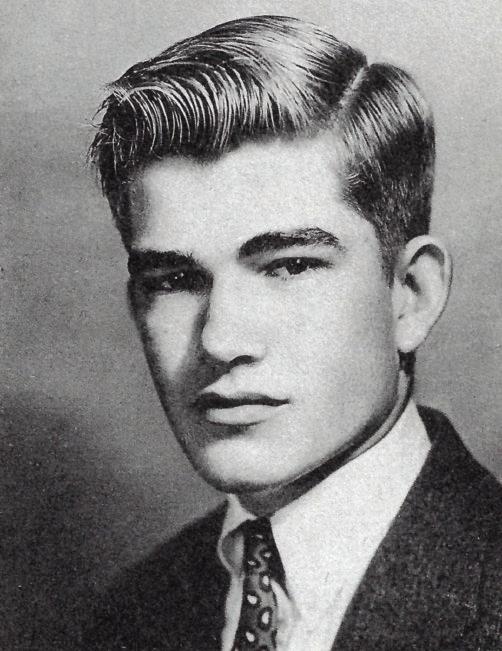

and Renbrook School. Jamie pursued a career in teaching, spending time in both private and public high schools. With her professional experiences, she appreciates the Westminster faculty’s focus on the whole child. As someone who has made that commitment, she knows the heart and the hard work it takes to inspire and support students inside and outside the classroom. Jamie also understands that maintaining the “triple threat” model of teaching, coaching and living in a dorm will be a challenge for independent schools but said “I believe in Westminster’s future, and I want to be a part of it.”
In 2021, Jim passed away, and Jamie learned that he had included Westminster in his estate plans.
“I thought it was an act of incredible generosity and I began to think about how I could continue that legacy,” she said. Recently, Jamie made Westminster a beneficiary of an individual retirement account (IRA). Just as she walked the same campus paths as her father, Jamie has joined him as a member of the Thring Society.
If you would like to honor your Westminster School experience with a planned gift, please contact Jennifer Keyo, director of legacy and leadership giving, at 860-408-3039 to discuss the best way for you to join the Thring Society.
Michael “Spike” Lobdell ’75, P’07, Recipient of the Distinguished
Westminster’s most prestigious alumni honor will be presented to Michael “Spike” Lobdell ’75, P’07 in a special ceremony during Flock Reunion Weekend, June 7-9. Established in 2011 and endowed by the Class of 1966, the Alan F. Brooks ’55 Distinguished Alumni Award is given annually. It honors an individual who exemplifies, in thought, word and deed, the school’s mission and who practices Westminster’s core values of community, character, balance and involvement.
Lobdell said he was deeply honored to be named the recipient. He noted that during his years as a trustee from 2000-2010 he worked closely with Alan Brooks and greatly admires him.
A former director of advancement, Brooks served the school in various positions for more than 50 years. He recalled working with Lobdell during Westminster’s “Building Grit and Grace” capital campaign, which ended successfully in 2010. “His ready smile, infectious enthusiasm and can-do spirit energized all of us,” Brooks said.

Brooks added that he could not be more pleased that Lobdell is receiving Westminster’s Distinguished Alumni Award, noting that it is a suitable bookend to the Keyes Bowl, which Lobdell received upon his graduation from Westminster.
Lobdell is currently board chair of the New England Science & Sailing Foundation (NESS) in Stonington, Conn., which he founded in 2002. The nonprofit teaches life skills and offers a STEM-based curriculum to more than 9,000 students, using sailing, marine science and other water sports as learning platforms. In 2021, he was named Citizen of the Year by the Connecticut and Rhode Island Chambers of Commerce for his contributions to educating underserved youth. In 2020, he was awarded the U.S. Sailing Martin A. Luray Award, the highest honor bestowed by U.S. Sailing, the sport’s governing body, for community sailing programs. He founded NESS with a vision of providing youth from all backgrounds with the opportunity to get out on the water, learn and have fun, regardless of their financial needs or ability. The organization’s guiding principles of inclusiveness, experiential learning, personal growth and stewardship are closely aligned with Westminster’s core values, which greatly influenced Lobdell in his own life and career.
Before launching NESS, Lobdell was CEO of XL Capital’s non-insurance operations and worked at J.P. Morgan for 28 years in various senior management capacities across the firm. He holds a B.S./B.A. in psychology and business administration
from Bucknell University and an MBA in finance from New York University.
As a student at Westminster, Lobdell was fully immersed in the school, playing football, soccer, hockey and lacrosse. He was a member of various clubs and organizations, among them the John Hay Society, Choir, Student Activities (president) and The Martlet (editor). The Class of 1975 voted him the student who did the most for Westminster. At graduation, he was presented with the Keyes Bowl. Established by the Class of 1966 and recognized as the school’s most prestigious commencement award, the Keyes Bowl is presented annually to a member of the Sixth Form and recognizes the qualities of loyalty, courage, leadership and humility. Not surprisingly, his dedication and enthusiasm for the school continued long after he graduated.
Lobdell served as a trustee from 2000-2010, becoming vice chair in 2004. He has been a Fellow since 2023 and a member of the Thring Society since 2005. He continues to be actively involved in the school, attending reunions, holiday receptions, athletic contests, campus events and trustee meetings. He has hosted Westminster events at his home. He currently resides in Mystic, Conn., and, when he is not volunteering at NESS, spends much of his free time pursuing his life’s passion for sailing. He has a son, Brian, a daughter, Sarah Lobdell Ginsberg ’07, and a granddaughter, Lily.
January 17, 2024 • Aquavit Restaurant, New York, N.Y.
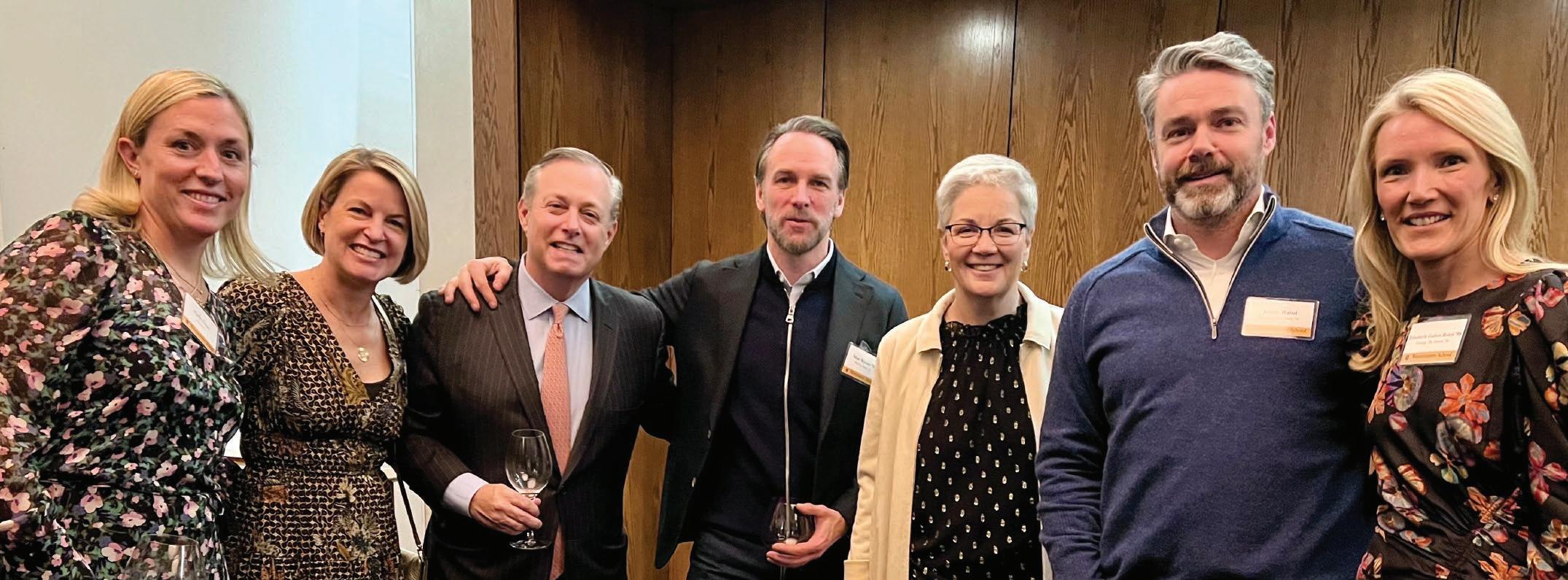

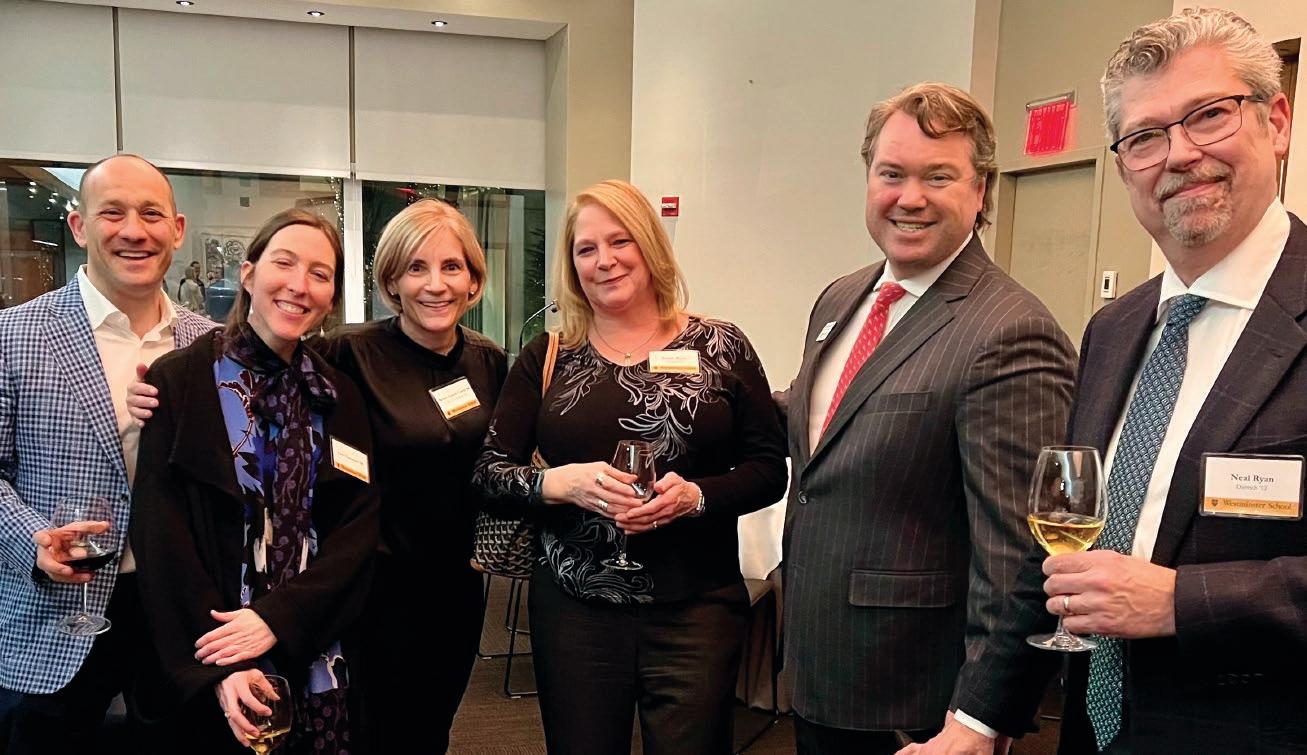
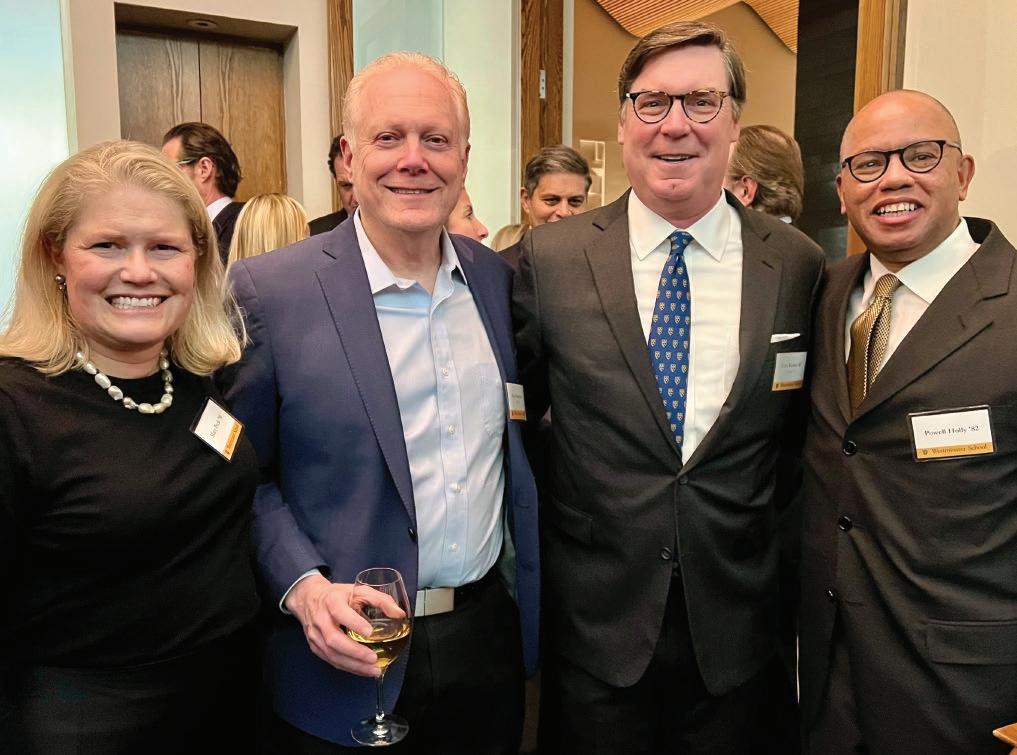
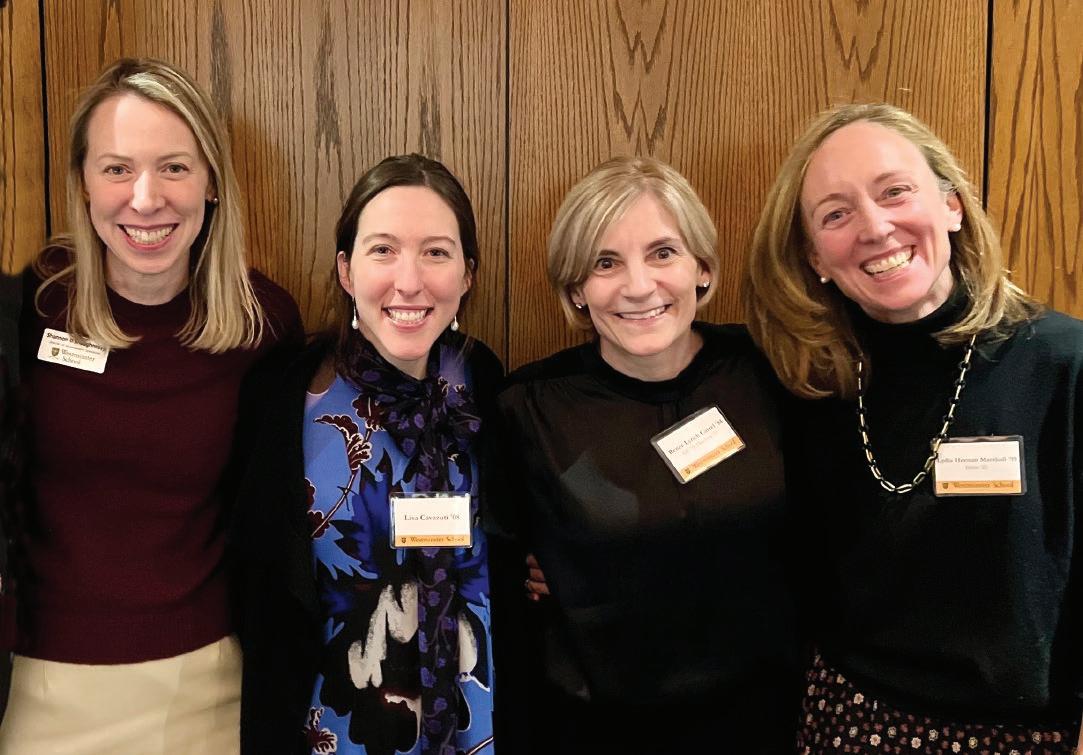
March 5, 2024 • The Royal Automobile Club, London

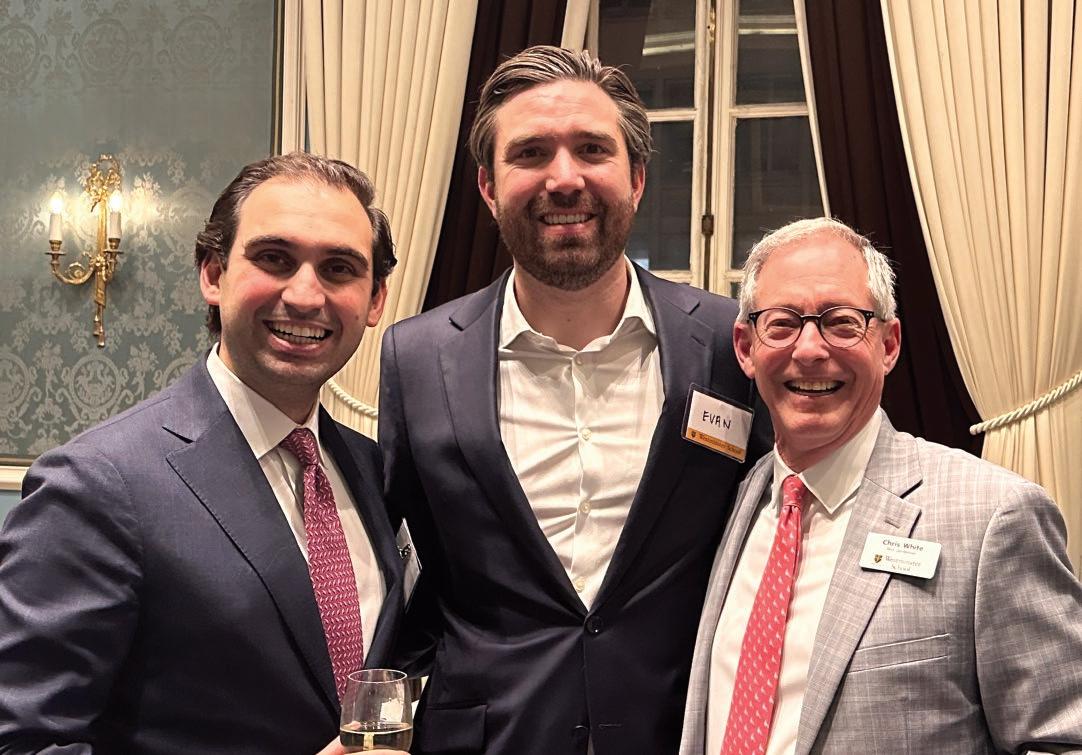

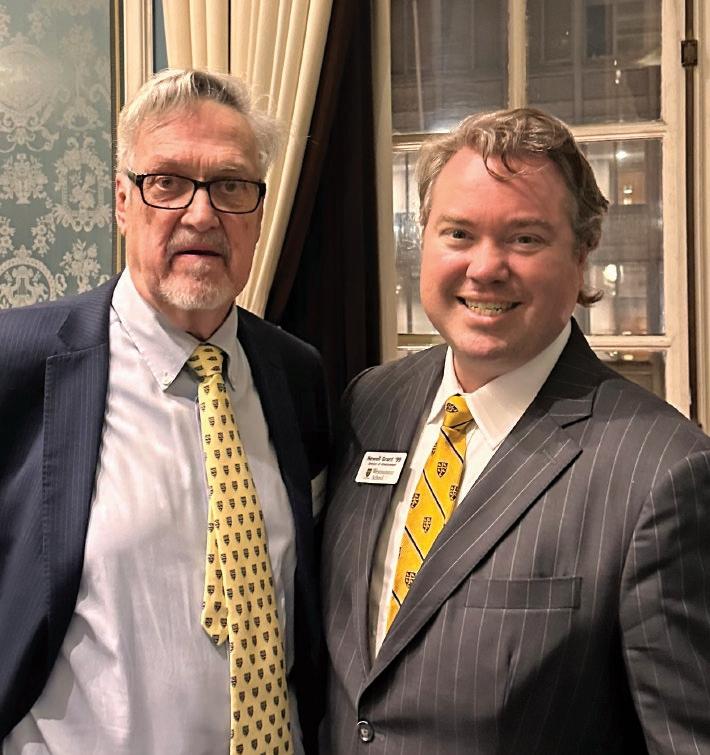
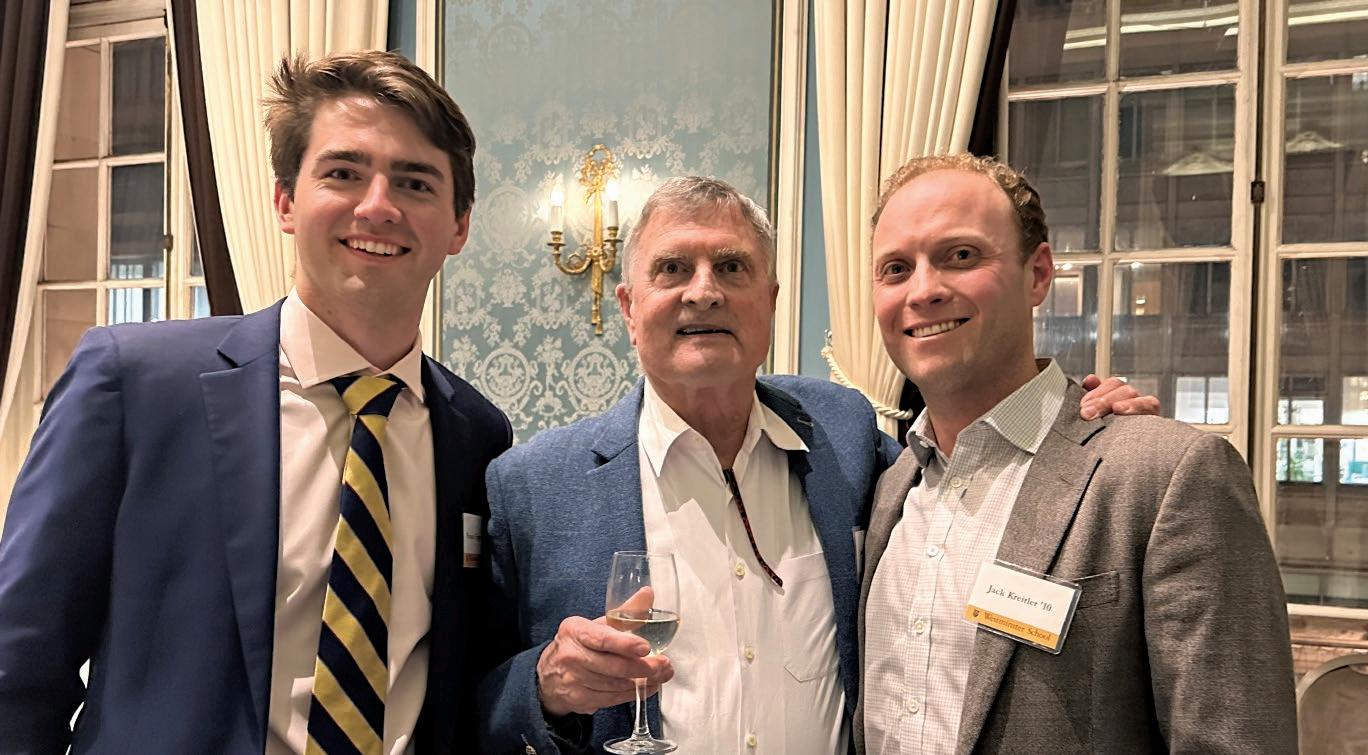
Georgetown University and George Washington University • Oct. 17, 2023, in Washington, D.C.
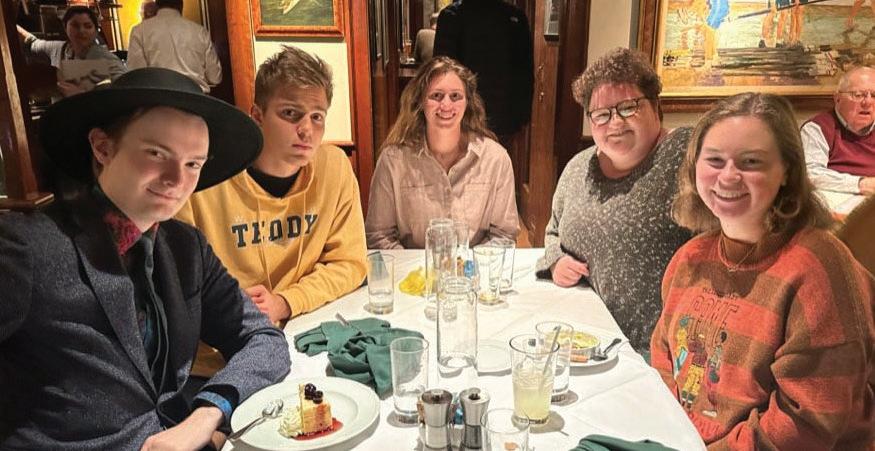
Trinity College • Oct. 31, 2023, in Hartford, Conn.
New York University • Oct. 19, 2023, in New York, N.Y.
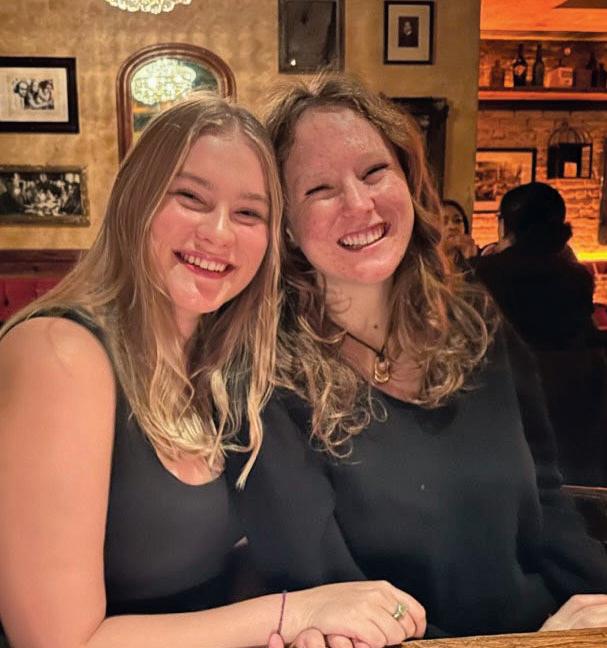

Brown University • Nov. 1, 2023, in Providence, R.I.
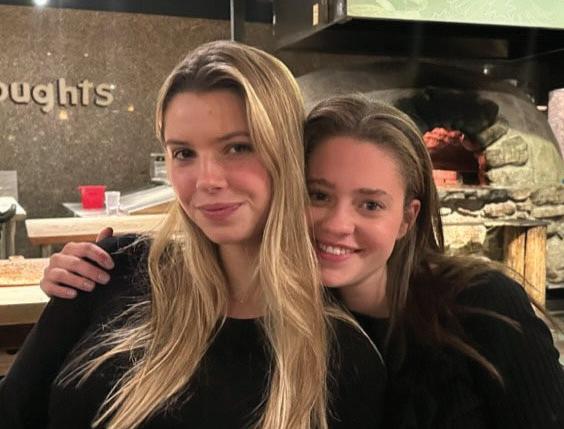
University of Denver • Nov. 7, 2023, in Denver, Colo.






In November 2023, alumni and parents hosted Head of School Elaine White, Dean of Admissions Miles Bailey ’94, and Director of Advancement Newell Grant Jr. ’99 in Beijing, Shanghai and Hong Kong. Throughout the trip, they met and visited with alumni and parents from a wide variety of generations and backgrounds. They attended receptions with alumni, parents, and prospective families and enjoyed gracious hospitality from the hosts including traditional sightseeing, tourist attractions, wonderful meals and cultural experiences.
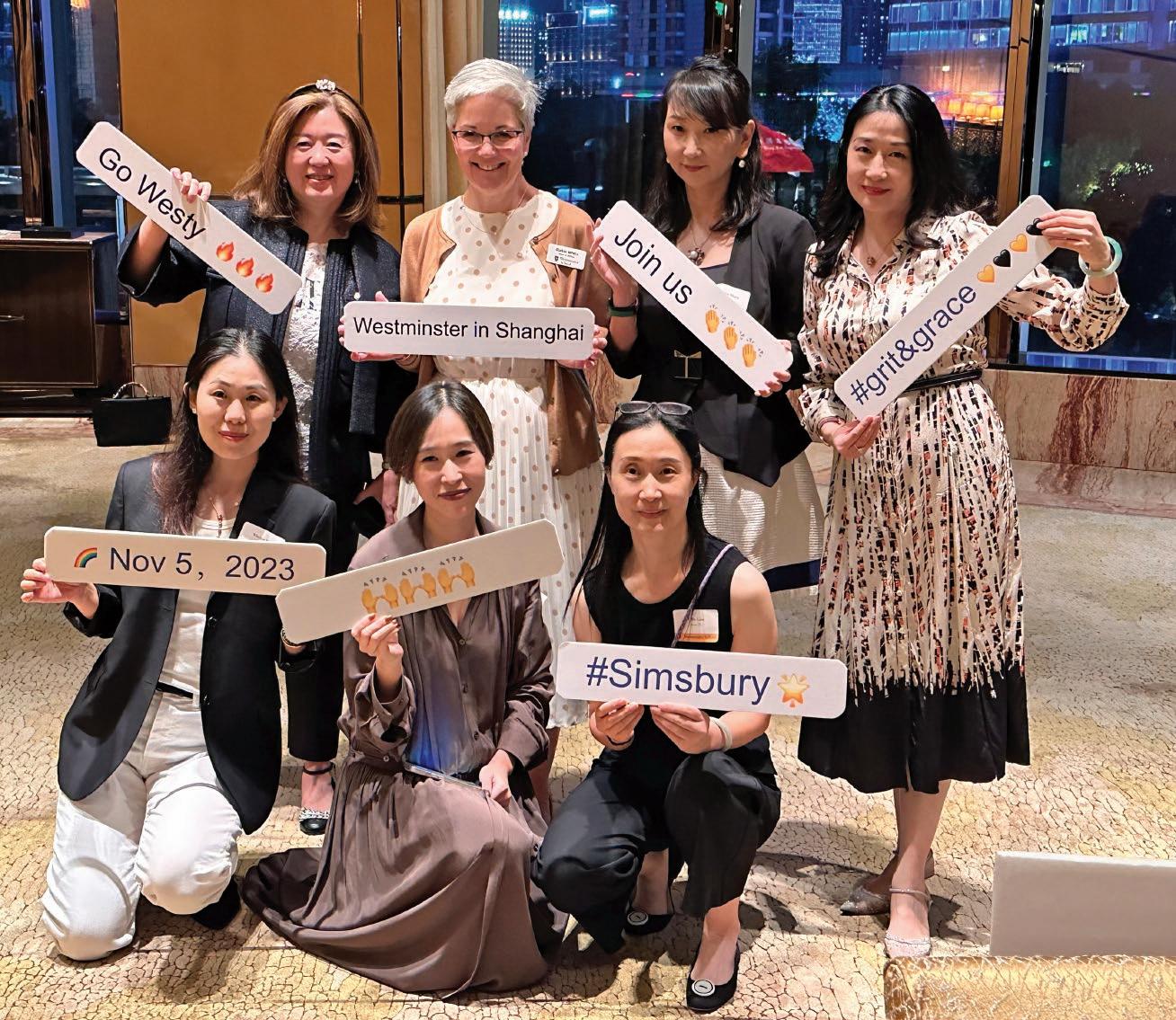
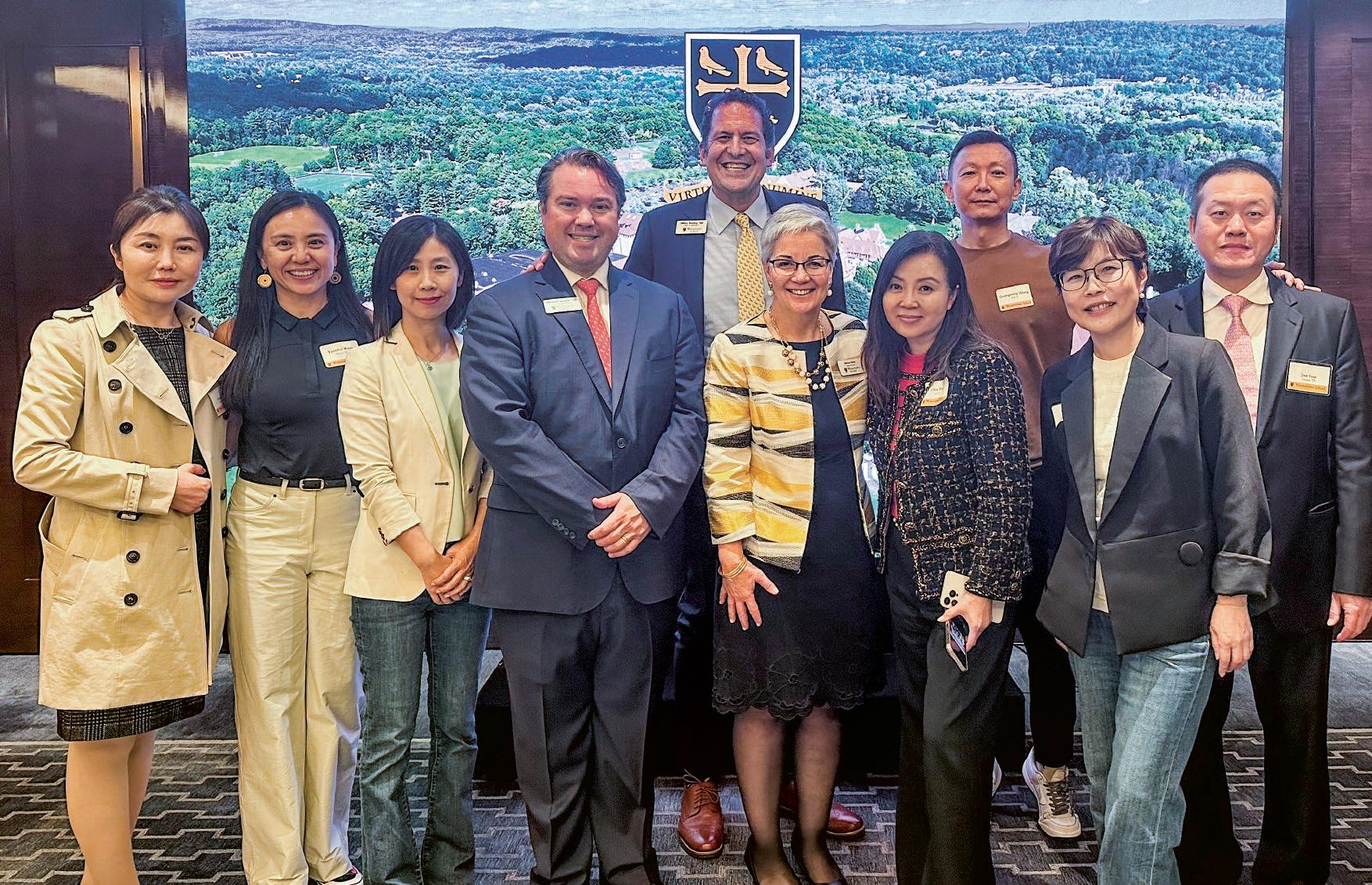
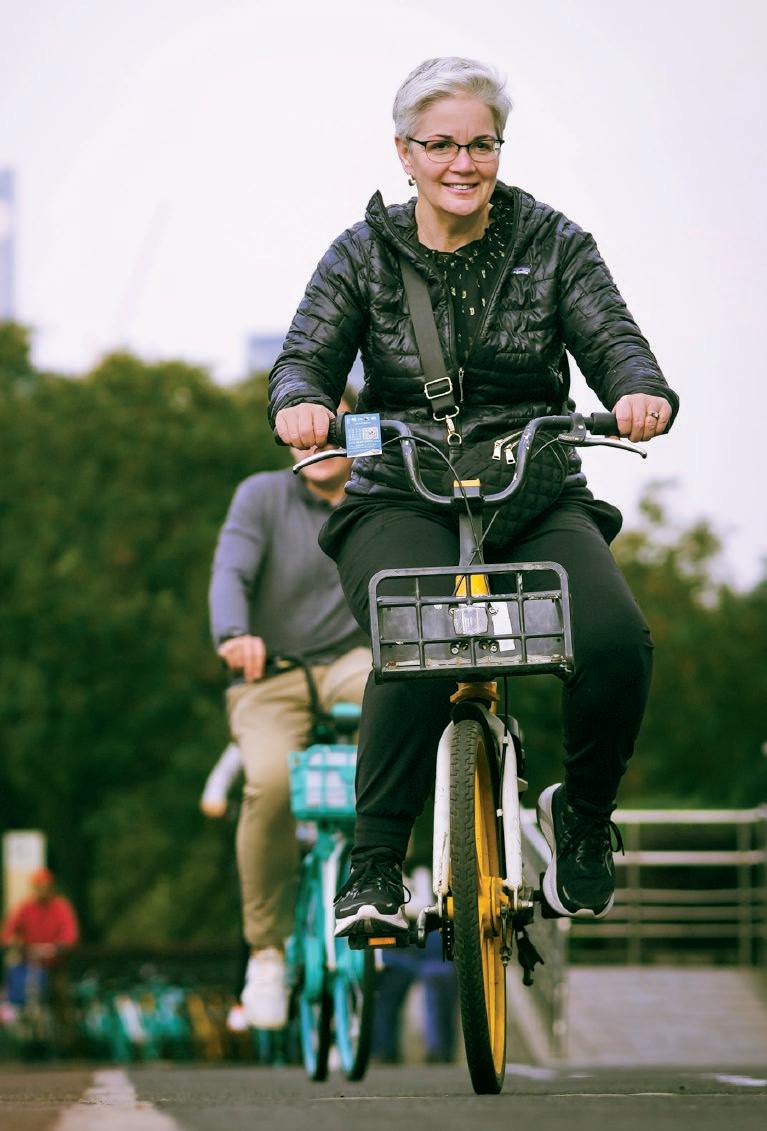
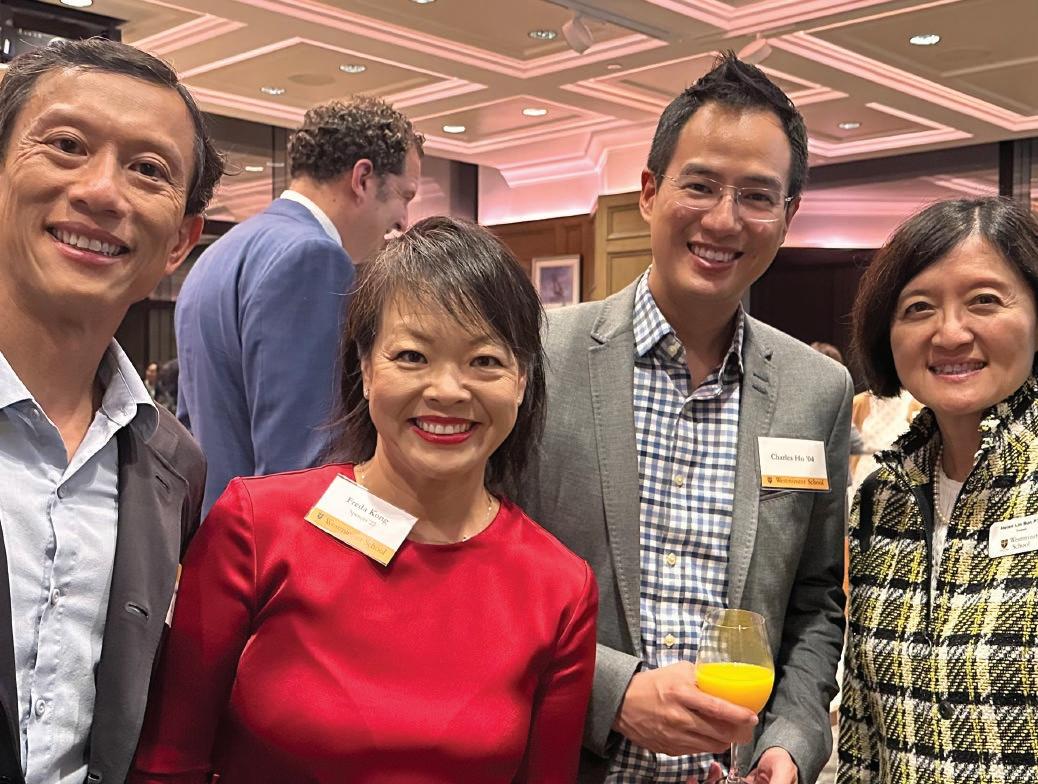

When Chapel coordinator Shana Russell and members of the John Hay Society were cleaning out their storage room in the Andrews Memorial Chapel basement this winter, they came across three dusty, rectangular pieces of wood. After Russell brought them to me, I noticed that they were slightly charred and determined that they were the original pipes from the organ in the school’s first chapel, built in 1902. While the chapel is an apt place to store them, I wondered why the pipes were in the John Hay storage room — and, more importantly, what I should do with them.
The Hay Memorial Chapel was built in memory of Adelbert Hay, Class of 1894, and the son of John Hay, personal secretary to Abraham Lincoln and, later, secretary of state. Adelbert, who was appointed private secretary to President William McKinley, died in an accident at a Yale University reunion. The chapel was built in his memory by friends and family and dedicated Nov. 1, 1902.
On the evening of Dec. 21, 1904, after Christmas services, the founder and Head of School, William Lee Cushing, drove some boys to the train station in Simsbury. While waiting for the train, one of the boys looked toward the school and noticed that something was on fire on the Hill. It was the chapel, fully engulfed in flames. It burned to the ground but was promptly rebuilt and was dedicated May 13, 1905.
We know that a new organ was built in 1905 by the Austin Organ Company in Hartford, Conn., which also built the current organ. But we have no record of who built the chapel’s very first organ.
All that is left of it are three charred pipes –– the only remains salvaged from the chapel when it burned to the ground.
If you know something about these pipes or have thoughts about how Westminster might share them with the community, please send your ideas to sreeves@westminster-school.org.
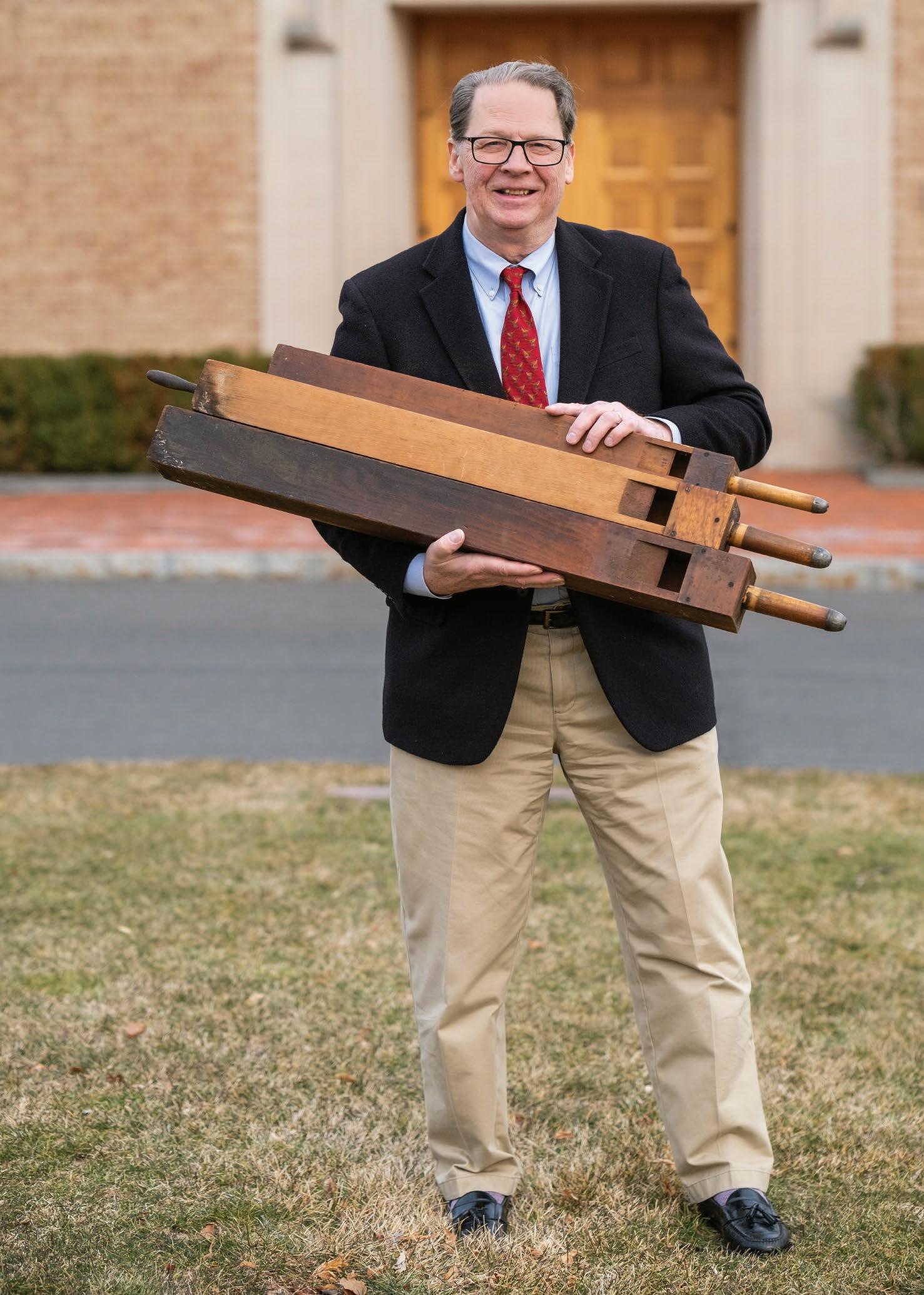
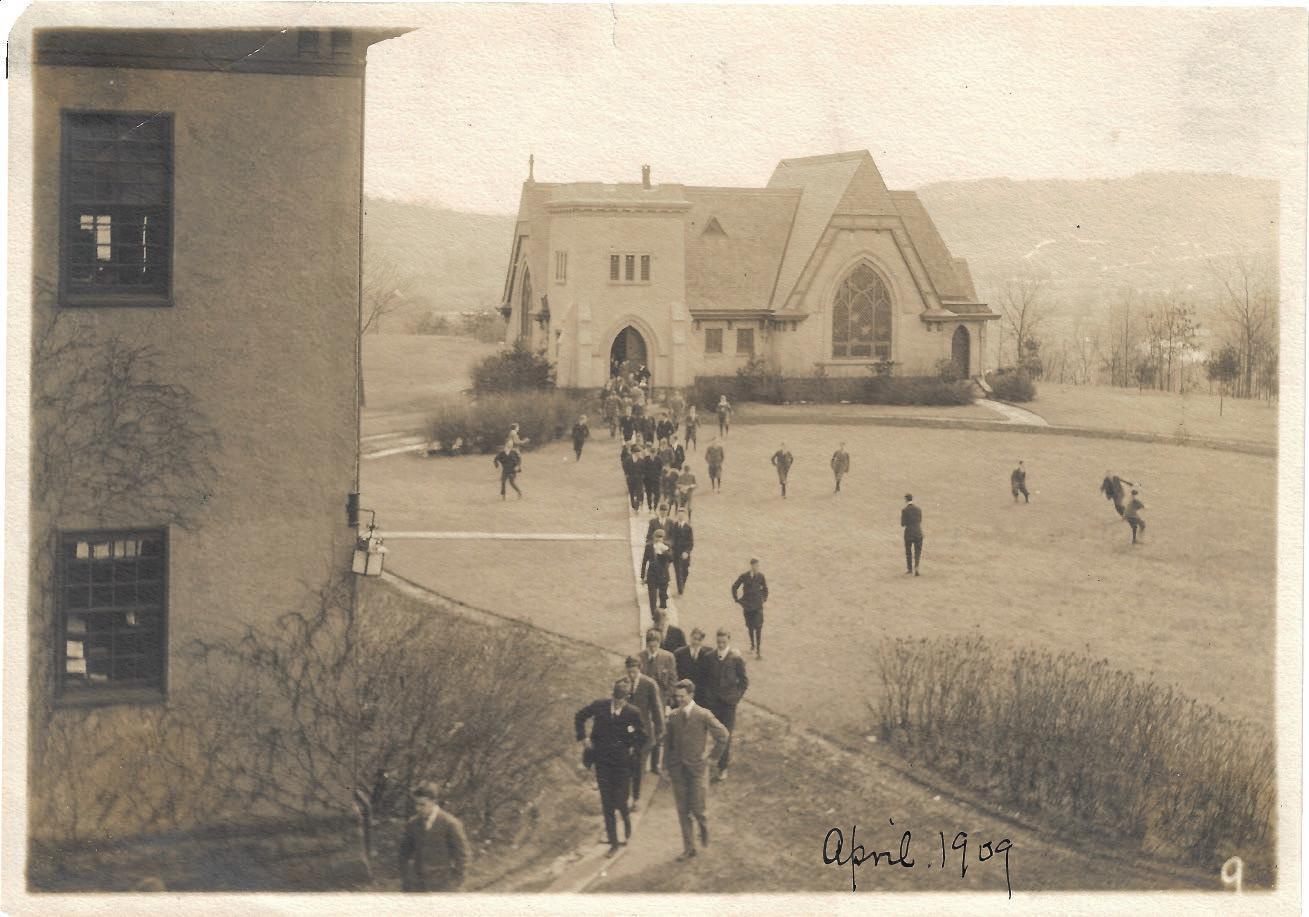
Send alumni news and class notes via email to classnotes@westminster-school.org. Send updates to contact information to spierson@westminster-school.org
This spring, Alan Brooks began his 63rd year coaching track and field at Westminster, the last 13 years as a volunteer. He works with the throwers.
Charlie Dilks will be honored this June at a spring gala held by The Chestnut Hill Conservancy in Philadelphia, Pa., for his decades-long commitment to conservation, preservation and protecting natural resources.
Art Gilliam was inducted into the Tennessee Radio Hall of Fame in July. Art’s selection for the Hall of Fame recognized his leadership of WLOK, the first and only independently owned African American radio station in Memphis that broadcasts on both FM and AM radio. On Feb. 1, 2024, Art was recognized by the University of Memphis Black Student Association with

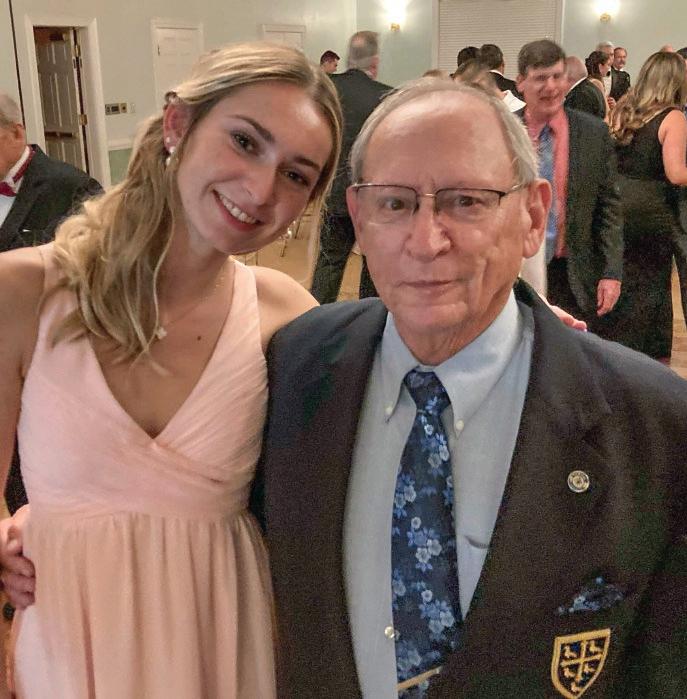
Self-described “ancient Martlet” Marty Farr ’57 connected with recent Martlet, Ali Hatfield ’20, at her cousin’s wedding in Pawleys Island, S.C., last November.
their Lifetime Achievement Award. The award is given annually to a Memphian whose life exemplifies outstanding dedication to the Memphis community and who is a constant reminder to today’s students that hard work and dedication are true keys to success.
Art Turton ’65, P’91 with sons Jeff ’91 and Brian. Left to right: Jeff, Art and Brian Holderness in the Purcell Range of British Columbia
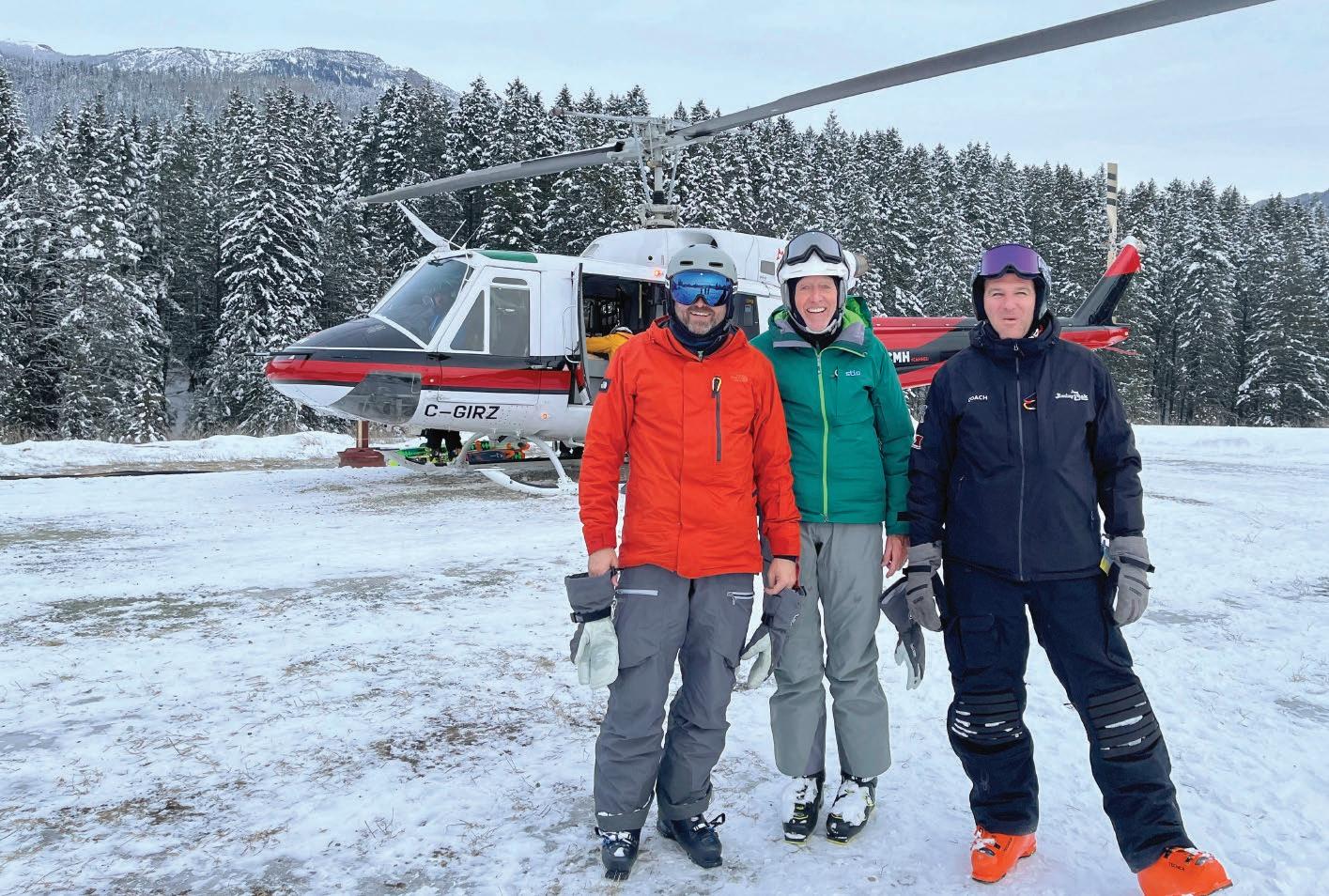

Former faculty member Charlie Dietrich, left, had a nice visit with Charlie Zimmer ’59 , also a former faculty member , earlier this spring.
Art Turton took a heli-skiing adventure with sons Jeff and Brian last winter. He writes, “We were in the Purcell Range of British Columbia, flying out of Golden. It was quite fabulous being out in total wilderness with every run on new untracked powder and spectacular scenery. It was a joy for me to be able to share this with my sons (particularly at my age!)”

Derek Fahey ’66 completed a ‘bucket list visit’ to Norway in December visiting the Geirangerfjord.
Dick Stewart writes that he has been serving on the Nauset Regional High School Committee in Eastham, Mass., since 2017. He notes, “The big issue now is the renovation of the Nauset High School, a high-performing school that just received a silver certificate from the college board for having the highest AP scores.”
Jock Tate hunts three days a week from October to March in Southern Pines, S.C. He writes, “Frequently I am called on to be ‘field master’ who leads a group of 35 to 125 riders following the huntsman. We hunt over 4,000 acres for typically 3-5 hours. The field master also has the responsibility of taking the safest path and determining when a break or rest may be required during a long gallop. As you see from the picture, we hunt English style, and our hunt is considered a formal dress hunt. As for the DeLorean, only about 2,500 were made from late ’81 to ’83.
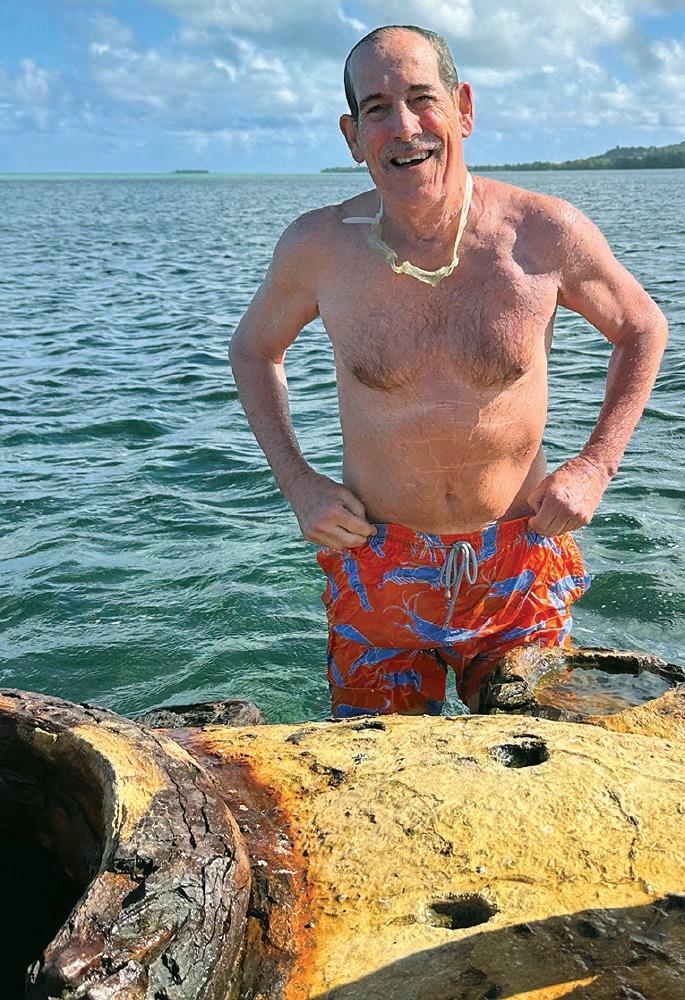
Through the National WWII Museum travel program, Evan Stewart ’70 and his wife, Trisha, spent two weeks on the Victory in the Pacific tour with stops in Pearl Harbor, Saipan, Tinian, Guam and Iwo Jima. They were also able to visit Palau and Peleliu.

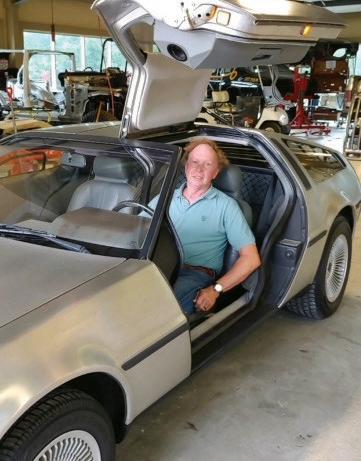
I found this one in New Jersey advertised for sale by a family law attorney. The ride home resulted, and still does, with every kid that sees it wanting his or her picture taken with it. I have even had people follow me into gas stations or turn around and come back to one to get a picture. It is a lot of fun, and the license plate reads: ‘TimeFlys.’”
Olle “Tom” Lundberg was selected as the 2023 Distinguished Alumni Award Recipient by the University of Virginia
School of Architecture. The award recognizes exceptional graduates from the school of architecture who have demonstrated creativity, innovation, leadership and vision through their distinguished body of work, within the professional, academic, civic or artistic realms as well as service to the University of Virginia. Last October, Lundberg spoke at a special event at the university about his career designing lasting, transformational works of architecture at Lundberg Design in San Francisco.
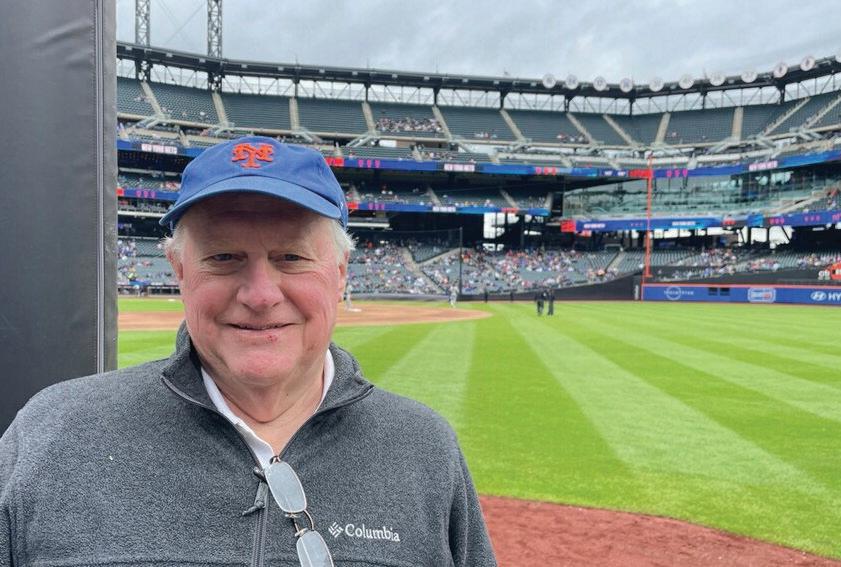
Mets game at CitiField.
Peter DeLorenzo is living on Martha’s Vineyard, where he moved 11 years ago to accept a physical therapy opportunity at Martha’s Vineyard Hospital in acute care and subacute rehab. He retired on May 5, 2022, but he continues in private practice providing home care to the island’s elderly. He writes, “We recently celebrated our son’s wedding!”
Stew Leonard Jr. writes, “I am CEO of Stew Leonard’s. We are opening our eighth food store in Clifton, N.J., this May. Last year, we opened our first swim school in honor of my son, Stewie, who drowned at 21 months old. We teach over 1,000 kids a week and all profits are put back into the community to give swim lessons to underprivileged kids. My wife, Kim, and I have four daughters, two of whom are in the business. I’m still trying to figure out how to lose weight in the food and wine business!”
Gary Wolff writes, “I’m very excited to say my daughter Kristina is now my partner at Wolff Wealth Advisors. Eileen and I have moved our primary residence to Lakewood Ranch, Fla., where I have opened an office. We still spend summers in Woodstock, Conn., and have an office.”
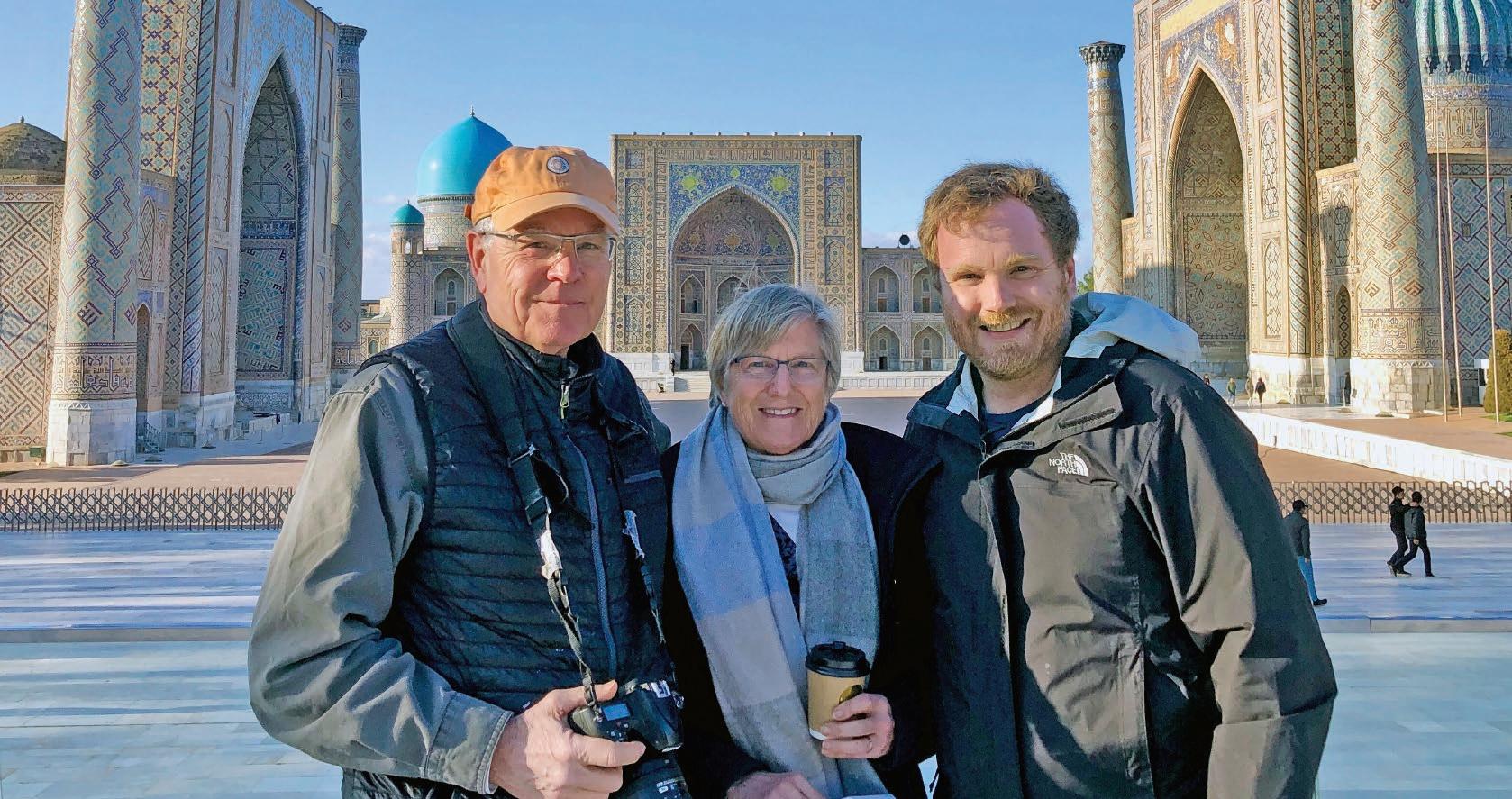
In March, Will Sillin ’73 and his wife, Liz, visited their son, Jeffrey, and his wife, Elizabeth, in Uzbekistan, where they are both posted as state department Foreign Service officers. They had a grand tour of Uzbekistan’s most prominent historic Silk Road sites.




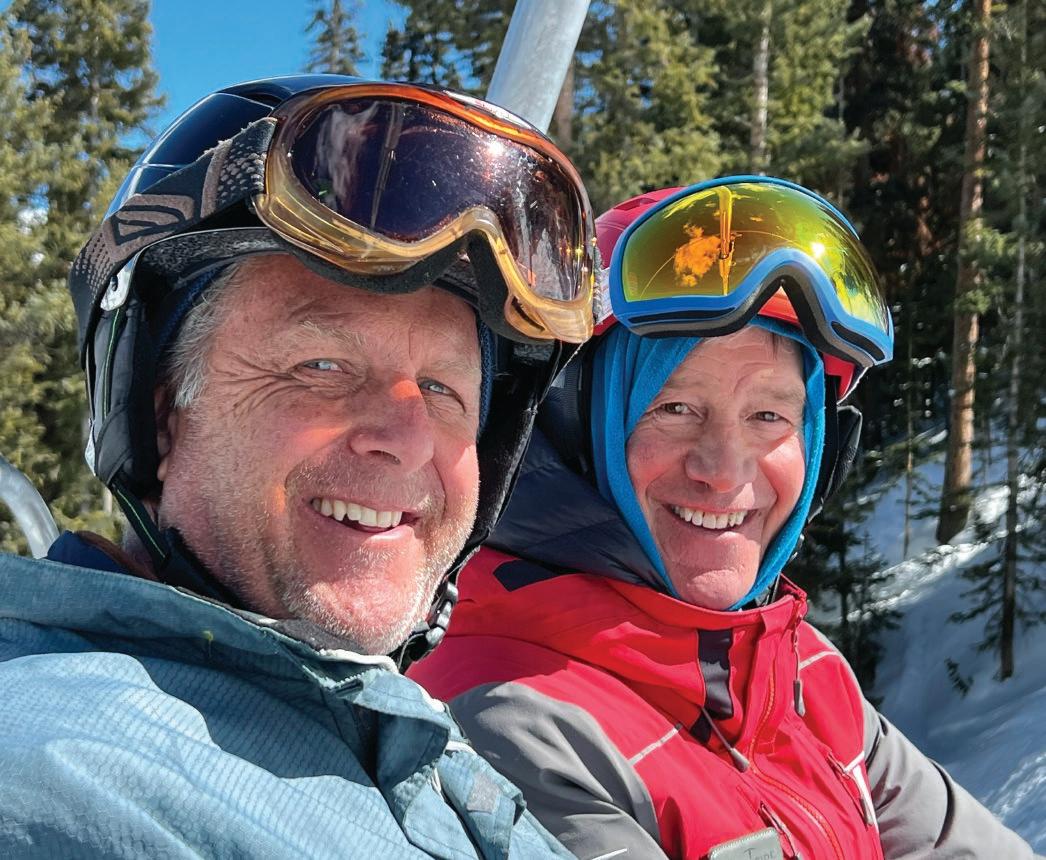
Frank Mars had a chance to hear Westminster classmate Jamie Williams and his team from The Wilderness Society give a presentation about its work with local communities to protect America’s public lands and intact landscapes. The talk focused on what is considered one of the most important natural climate corridors in the country, the Appalachian Mountains, which stretch from Georgia to Maine.

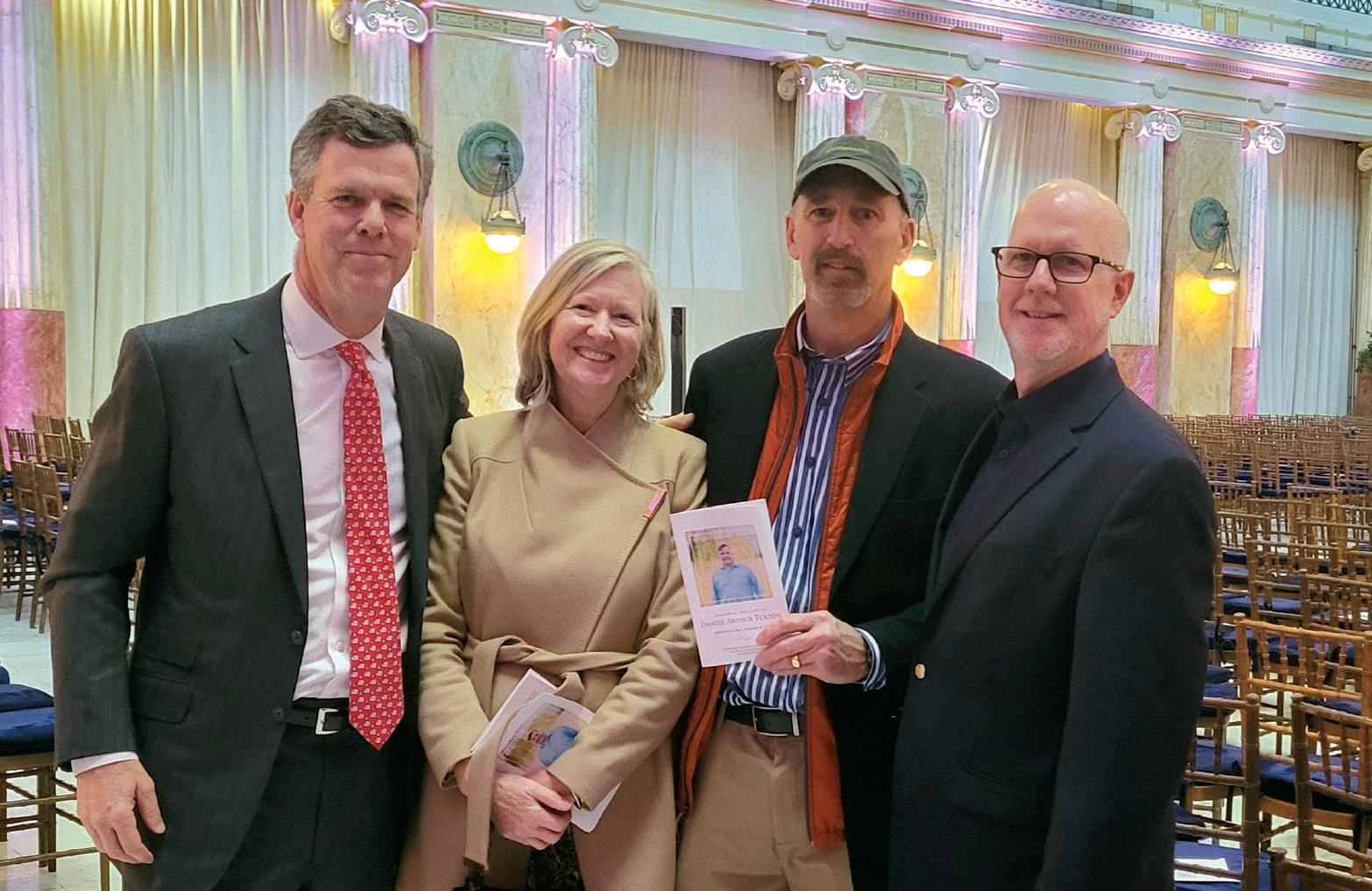
The United States Track & Field/ Cross Country Coaches Association (USTFCCA) announced in March that Fletcher Brooks was the recipient of Indoor Track & Field Men’s Assistant Coach of the Year award for the Northeast region. Fletcher is in his first year at Harvard University as coach, having joined the staff in September.
At the Ivy Heptagonal Championships, both his male and female throwers won the weight event, the former setting the Ivy League and Harvard records with the top throw in the nation. Two weeks later, his male thrower won the event at the NCAA Championships, helping Harvard to a national ranking at No. 11 in the USTFCCA based on the combined cross-country and indoor track and field seasons. The Harvard women ranked No. 15 in the country.

Beaver Dam hockey teammates and Martlet babes from left to right: Patrick Edwards, son of Ali Dwyer Edwards ’95, P’27; Alex McAndrew, son of Alexis Van Der Mije McAndrew ’98; and Pierce Robinson, son of Hanna Foster Robinson ’00.
Melissa Horne ’00 earned her certified financial planner designation in March 2024. She is a wealth planner for Fidelity Investments in the Charleston, S.C., office. She and Alex Daigle ’00 are enjoying life in the lowcountry; their son, Liam, will start kindergarten at Charleston Day School in the fall.
Michael D’Agostino writes that he is living in Marshfield, Mass., with his wife, Bianca, and two amazing sons, Christopher, 2, and Roman, 3. “Wishing everyone at Westminster the very best. I think about you all the time!”
Kimberly Sullivan married Carl Mazzone on Sept. 30, 2023, in Cleveland, Ohio. They were thrilled to have Westminster classmates present, including Adrienne (Bowler) Greenwalt, Dorothy (Stancill) Nassar, and Greg and Megan (McLean) Bettencourt.
Neil Hannah and his wife Morgan Ferraro Hannah welcomed Madalin Kendall Hannah into their lives on May 29, 2023.
Pop artist Charlie Januszewski, whose stage name is Charlie Brennan, will be releasing a new album titled “High Water” on May 10 on all streaming platforms.

Kimberly Sullivan ’03 and Carl Mazzone on their wedding day, Sept. 30, 2023, in Cleveland, Ohio.

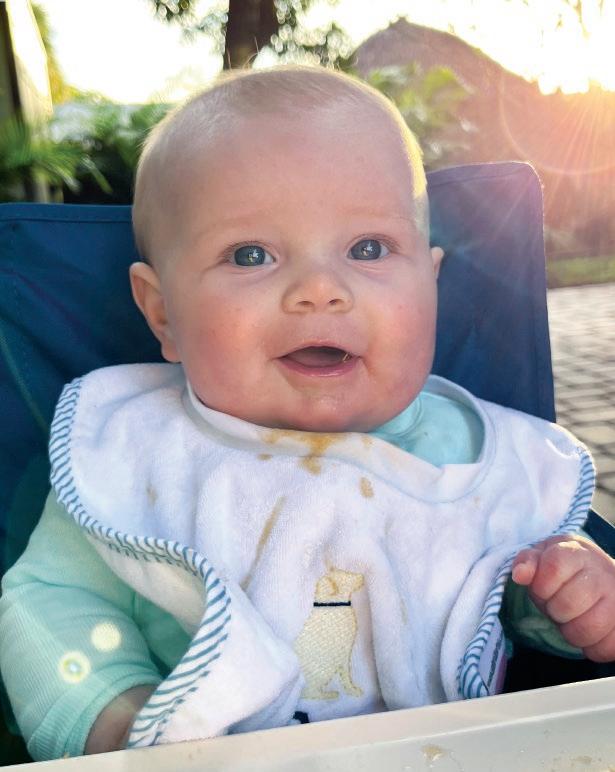
Whit Powel Holmes ’11 and husband, Andy, welcomed their son, Fisher Armstrong Holmes, on Aug. 10,
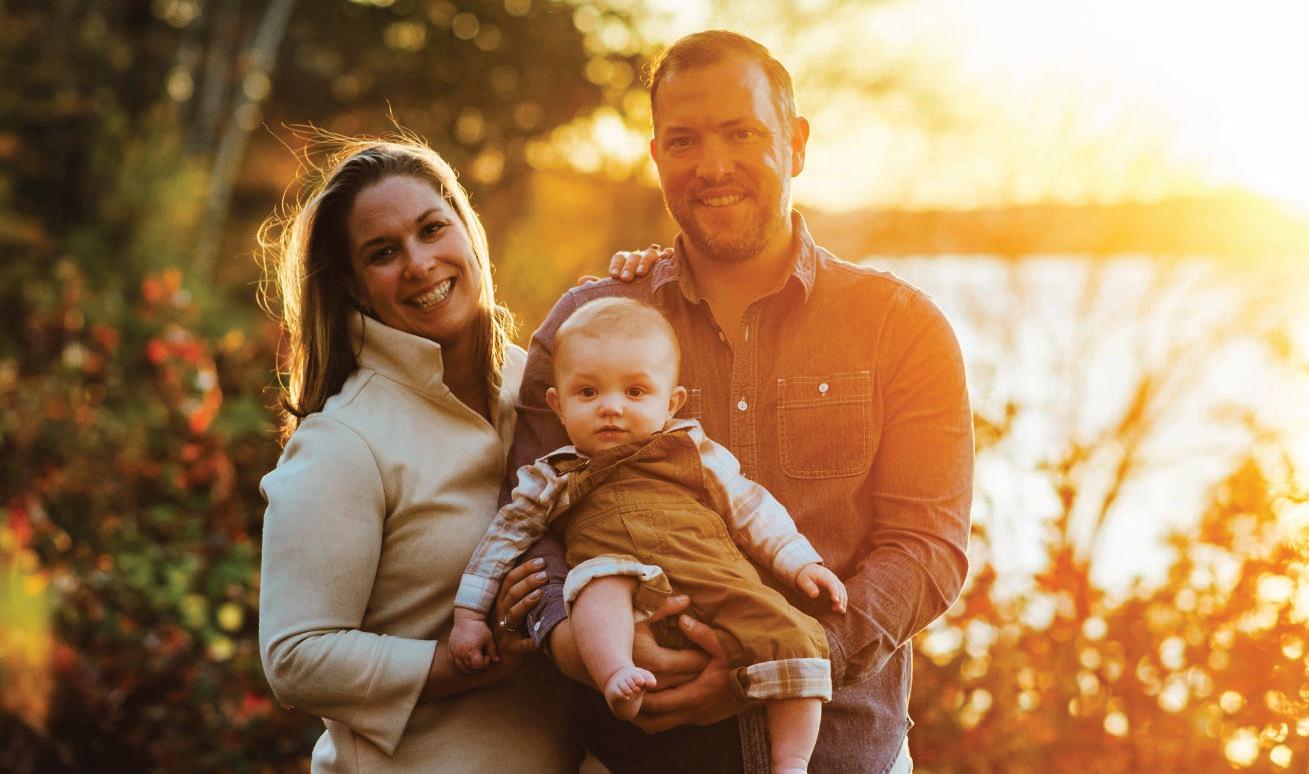
David Lee is working for the San Diego Padres as an interpreter for shortstop HaSeong Kim.
Amanda Liu and her partner, Albert Zhang, opened Blossom Cafe in Simsbury, Conn., in April, serving Asian fusion breakfast and brunch. The couple traveled to Asia last summer, visiting China, Japan and Korea, where they were inspired by the cafe culture there.
Meg Rittenhouse, former head prefect, has been named the 2024 NESCAC Women’s Player of the Year by conference coaches! She is the first Colby player to receive this honor.
Additionally, a big congratulations to Ned Blanchard, who is the inaugural winner of the NESCAC Men’s Defensive Player of the Year for Trinity College.
David Harris won the inaugural Interfraternal Golf Tournament at Indiana University, Bloomington, in April. The win allowed him to play at the NCCGA National Championship in Oklahoma later that month. David is majoring in economics with a minor in entrepreneurship from the Kelley School of Business. He’s the president and co-founder of the Bloomberg Market Concepts Club and has served as the Theta Chi IU chapter president and risk manager. In addition to playing on the Indiana University club golf team, he also plays ice hockey in the inter-fraternal league on campus.
Last fall, Brown University freshman Mariama Camara was a guest speaker at the Harlem Lacrosse annual benefit in New York City. In her address, she inspired the audience with the story of her journey from Africa to Westminster to Brown, where she is a midfielder for the Bears.
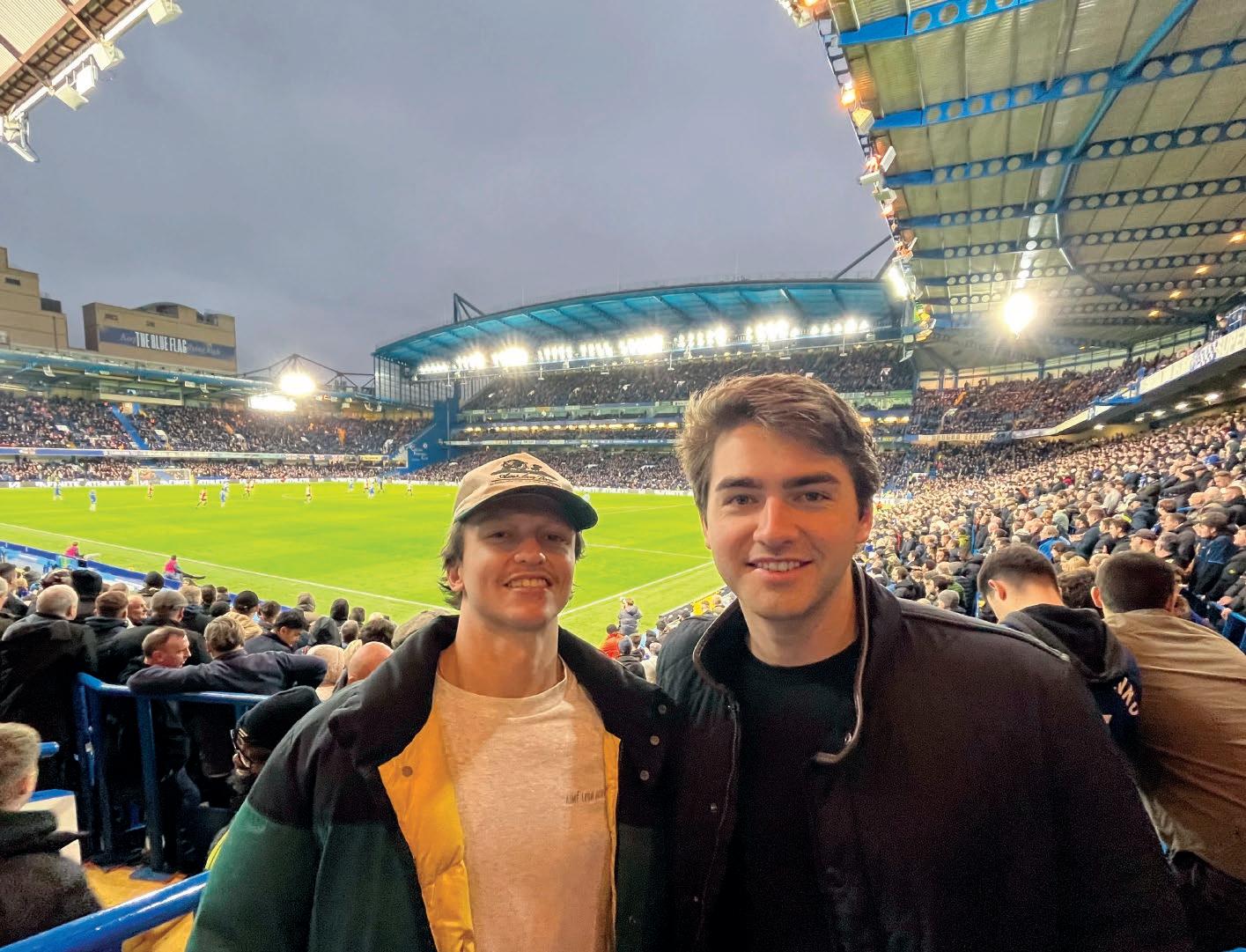

Will Stevens ’12 holds George, the oldest son of Nick Stevens ’07, and Nick holds his youngest son, Walt, born last August. The two had a friendly game of ice hockey in Jackson Rink on New Year’s Day.
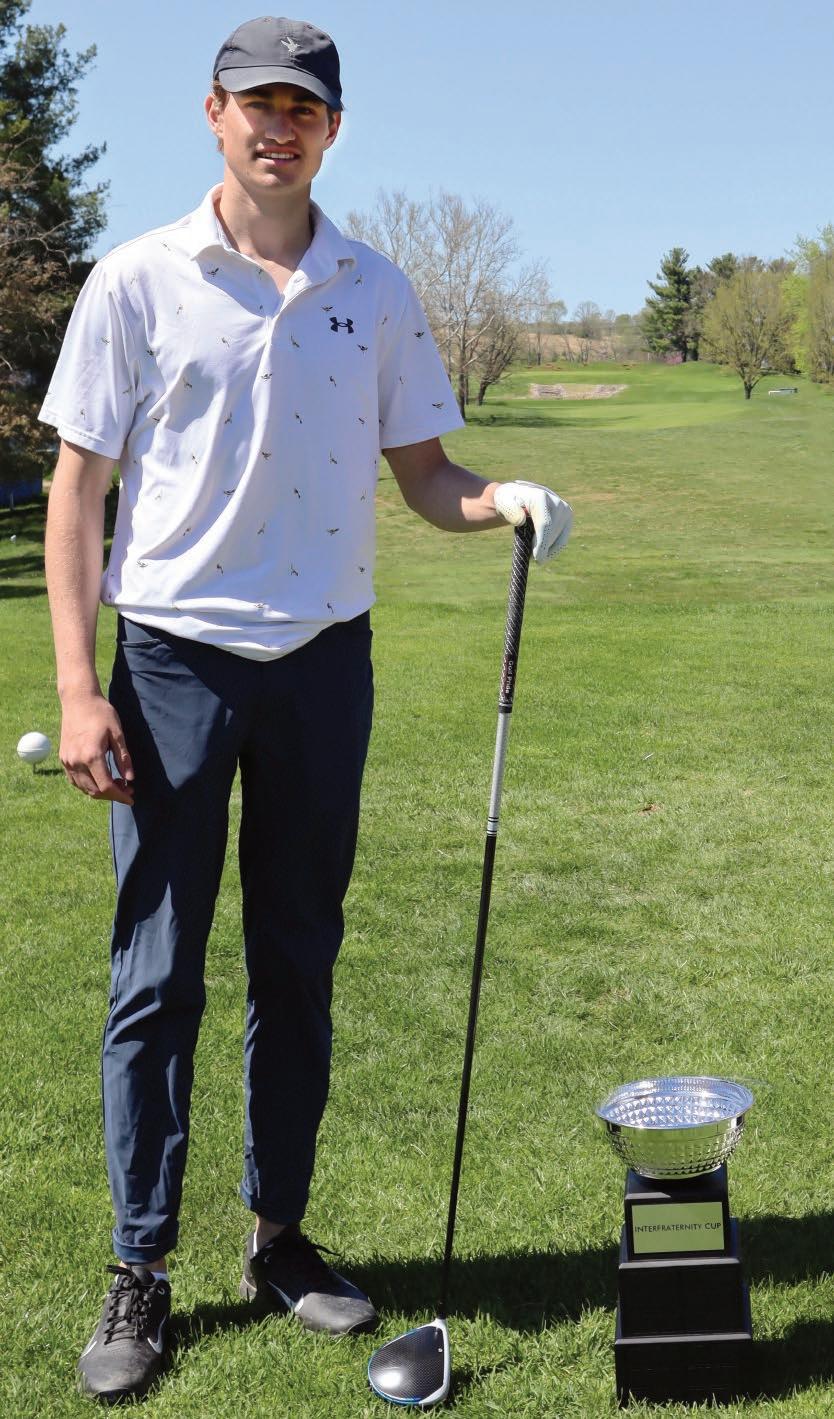
David Harris ’21 won the inaugural Interfraternal Golf Tournament at Indiana University, Bloomington, on April 14, 2024, and participated in NCCGA National Championship in Oklahoma.
Jocelyn Clark passed away Dec. 1, 2023. He was 101. A lifelong resident of Ridgeland, S.C., he is survived by his wife, Andrea; five children; nine grandchildren and three great-grandchildren. He graduated from Yale University and served in the U.S. Navy in the Pacific Theatre during World War II. On his 100th birthday, he was presented with a letter of commendation from the chief of naval services expressing gratitude for his courage and leadership, which saved his ship and all of its crew during a catastrophic typhoon in August 1945.
Stan Waterman P’70 died on Aug. 10, 2023, at his home in Lawrenceville, N.J., with his wife of 73 years, Susy, by his side. He was 100 years old. One of the first pioneers of diving in America, his career spanned eight decades. It began in a frigid glacial pond in Maine following his naval service in World War II and led him eventually across most of the world’s oceans. His gift as a writer and raconteur started with his studies under poet Robert Frost at Dartmouth College. He taught himself photography and filmmaking, built his own underwater camera housings and had the first dive-boat operation aboard his custom-built Zingaro in the Bahamas, where he made one of diving’s earliest films, “Water World,” in 1954. He traveled the back roads of America on the “gumshoe circuit” — long before television — showing his early, handspliced films, which he narrated live while managing music on a small tape recorder. When the projector stalled on occasion and his films caught fire, his amusing anecdotes, well-sprinkled with poetic reference, were called upon to complete the evening.
Among his many films, the most successful was “The Call of the Running Tide” for which he packed his entire family off with him to Tahiti for a year. It became a National Geographic favorite
and later, in 1992, the Discovery Channel featured Stan and his family in a two-hour special, aptly named “The Man Who Loved Sharks.” The September 2005 issue of Sports Illustrated featured a profile of Stan, also recalling his first appearance on its January 1958 cover. His 1968 collaboration with underwater filmmaker Peter Gimbel on the extraordinary documentary epic “Blue Water, White Death” was released in 1971 after nearly two years of filming. It was some of the first great white shark footage ever presented. He was also co-director of underwater photography for “The Deep,” a book and screenplay written by his close friend Peter Benchley, with whom he went on to do many years of television production. Stan’s later years were spent hosting dive trips around the world, and he continued pursuing mantis shrimps and entertaining his guests aboard with nightly bijou entertainment. When he finally hung up his fins at 90, he retired to his office, where he smoked cigars, wrote, and published his two anecdotal books: “Sea Salt” and “More Salt.” He is survived by his wife, Susanna, three children, six grandsons and two great-granddaughters.
John W. Rogers of Baldwinsville, N.Y., passed on Sept. 2, 2023. He was 88. Born in Schenectady, N.Y., he was raised in Au Sable Forks, N.Y., during an era when the J&J Rogers Paper Mill was the region’s primary employer. He attended nearby Union College and graduated from Clarkson College of Technology. John worked at the family paper mill and as a surveyor in Burlington, Vt. He then worked for Sealright Company for many years. In his spare time, he volunteered for charitable causes and was active with the Jaycees, Rotary and Baldwinsville Theatre Guild. One of the founding members of Beaver Meadows Golf Club in Phoenix, Ariz., John was happiest playing golf or spending time with his extended family on Silver Lake in Au Sable Forks, N.Y. Throughout his life, particularly during his years of declining health, John displayed an incredibly positive attitude and strong spirit to fight.
He is survived by his wife of 62 years, Phyllis; four children; two sisters and eight grandchildren.
Melvin M. Johnson III passed away on Aug. 28, 2023. He was 88. He grew up in the suburbs of Boston. After graduating from Harvard University in 1958, he worked in different departments for The Boston Globe for 32 years. Besides his editorial work, he wrote articles for the Globe’s entertainment section and edited a book about his father, Melvin M. Johnson Jr., who was famous for inventing the Johnson semi-automatic rifle and other inventions used during World War II and, later, for Johnson automatics. In his retirement, he and his daughter, Shannon, moved to Pennsylvania, where they found the town of Drexel Hill to be a good fit for the remainder of his life. The last decades of his life were spent quickly scribbling a poem off the top of his head or diligently working on a book, even when he started having difficulty seeing. He was an all-around nice guy, always forgiving and always upbeat. He played jazz by ear on the piano. With the “thump, thump” of his right foot tapping on the floor, he provided his own form of bass.
He was predeceased by his wife, Mildred. He is survived by three children and three grandchildren.
Charles “Chuck” Griffith Jr. GP ’11, ’14, ’15, ’17 of Rumson, N.J., passed away on March 10, 2024. Chuck graduated from Westminster and from Hamilton College, and he remained a supportive alumnus of both over the years. After serving in the U.S. Army Reserves from 1962 to 1966, Chuck worked for many years in banking and was dedicated to giving back to his community through his commitment to volunteering. As a Rotarian, he embraced its values of truth, fairness, goodwill and friendship, ensuring that everything he did would be beneficial to all. He served as treasurer of the YMCA, the Monmouth Boat Club and was a volunteer tax accountant at Fort Monmouth. A devoted baseball, soccer
and ice hockey coach, Chuck was the first president of the Matawan-Aberdeen Soccer League and served on the boards of the American Cancer Society and Planned Parenthood for many years. While Chuck thoroughly enjoyed a good round of golf and open-water sailing, he held closest to his heart the time spent with his devoted family, attending life events, activities and athletic contests or sharing precious time at family gatherings.
Predeceased by his first wife, Susan Wilkins Griffith, Chuck is survived by his wife of 40 years, Nancy Griffith; his children, Jennifer Griffith Black, Westminster faculty member Charles E. Griffith III and Kate Griffith. He is also survived by his grandchildren Kathryn ’11, Tommy ’14, Susan ’15, Jack ’17 and Bray; his two younger brothers, Alan Griffith ’60 and David Griffith ’72, and a host of beloved brothers and sisters-in-law; nieces, including Lindsay A. Griffith ’06; nephews, including Ian T. Griffith ’10, and many cousins and friends. Donations may be made in Chuck’s memory to the Griffith Family Scholarship, payable to Westminster School.
James Payne “Pete” Ingram P’84, ’85 of Osterville, Mass., passed away on April 2, 2024. He is survived by his two sons, J. Andrew Ingram ’84 and John R. Ingram ’85; his sister, Joan I. Thorndike, and five grandchildren. He was predeceased by his wife, Ellen Humphreys Ingram. Born in Bronxville, N.Y., Pete graduated from Sewickley Academy, Westminster School and Hobart College. After college, he served in the intelligence branch of the U.S. Army. He started his business career in Boston at R.M. Bradley, working in commercial real estate. In 1987, he began working at Cambridge Savings Bank and from 1998 to 2005, served as its president and CEO. While at Cambridge Savings Bank, Pete oversaw the acquisition of Bank 5 for Savings, the creation of Cambridge Appleton Trust Co. and the purchase and
renovation of the historic Read Block at the center of Harvard Square. Pete was a loving and caring father, husband and brother. He was deeply compassionate and focused on providing for his family. During his physically active years, Pete was an avid golfer and won two senior club championships. Known for his sense of humor and dry wit, Pete would always light up a room with his infectious laugh.
Avery Bevin passed away on Nov. 8, 2023. He was 83. He earned a B.A. in English at Franklin and Marshall College and a M.A. in English literature from the University of Colorado — Boulder. In 1964, he enlisted in the U.S. Army and served in the Army Reserve for seven years. He met his wife, Louise, during their early undergraduate years, and together they raised six children in rural New Hampshire. He worked in various jobs in education, industry and as a truck driver. He enjoyed being outdoors chopping wood and gardening and volunteering for social and church events. He had an esoteric love of the English language and was a lifelong reader. He is survived by his wife, Louise; his brother, Stanley; his six children; numerous grandchildren and a great-grandchild.
Steven Michael Webster passed away on Jan. 7, 2023, in Fairport, N.Y. He worked as a licensed clinical social worker, a golf and tennis coach, a bus driver, caregiver and more. Each endeavor allowed his big personality to shine through with little acts of kindness. He was an animal lover and was especially fond of his golden retrievers, Molly and Abby. Steve loved his family and always made an effort to listen and support them with a soothing hug and encouraging advice. He is survived by his partner of 25 years, Sue Willer; daughters, Kerry McElwee and Erin Burke-Webster; grandson, Casey McElwee; siblings, Richard Webster and Sue Talbott; his beloved dog, Abby, and many nieces and nephews.
William E. Minshall III of Kelleys Island and Sandusky, Ohio, passed away Oct. 11, 2023. He was 74. Born in Cleveland, he graduated from St. Albans High School and Boston University. Bill worked at Alex Brown & Sons for 20 years in Boston as a stockbroker. He was the mayor of Kelleys Island from 1994-1998 and later was the Kelleys Island zoning inspector. Bill loved being outside, playing cards, reading, golf, politics, the stock market and spending time with his friends and family. He was preceded in death by his wife, Molly. He is survived by his son, William E. Minshall IV; his brothers Werner and Peter, and many nieces and nephews.
Douglas Arthur Yorke Jr., died April 11, 2024, of injuries he sustained from a bicycle accident. Born Aug. 20, 1951, he grew up in Rumson, N.J., where he would later raise his three children. He was a founding board member of Parsons Dance Company, published a book on the art of the American road map and spearheaded an ongoing project to make New Jersey a leader in the field of photonics. He carried on the work of his mother, a founder of the Monmouth Museum, by serving as a trustee of the museum for 12 years.
Doug was predeceased by his parents, Joanne and Douglas Yorke, his stepfather, LeRoy “Bud” Bunnell, and his sister-in-law, Jean Bunnell. He is survived by his children, Douglas, Alice and Liza; his siblings Christine Flaherty, Thomas Yorke ’76, Peeka Tildesley, Steve Bunnell and Barry Bunnell; his former wife and the mother of his children, Eve Chamberlain; 12 nieces and nephews, and his granddaughter, Emilia.
1974
Carl McAllister Jenkins Jr., of Concord, N.H., passed away Nov. 16, 2022, following a valiant battle with cancer. He was 67. Born on Feb. 27, 1955, in New Haven, Conn., he was the son of the late Carl M. and Jane L. (Lyman) Jenkins. Carl loved spending time with
his family, was always available with a comforting word and was always ready to look on the bright side. Growing up, he loved animals and spending summers on Caspian Lake in Greensboro, Vt. With his wife, Kath, he cherished trips to Salisbury Beach, attending country music concerts and selling antiques online. He is survived by his wife, Kath, with whom he shared 21 joyous years of marriage; his children, Courtney B. Jenkins Mesquita, Chelsea A. Coombs and Max C. Jenkins; siblings; Gina Jenkins and Russell White, and several grandchildren. He was predeceased by his parents and his sister, Ellen.
Daniel Turton P’25, known by many as one of the most effective and beloved congressional aides in the U.S. House of Representatives, and who also served as the first deputy director of legislative affairs in the Obama White House, died in Arlington, Va., on Jan. 9, 2024. He was 56 years old.
His death resulted from complications from Type 1 juvenile diabetes, a hereditary condition that plagued Dan every single day since his early 20s, which you’d never have known given his ready smile and ever-present sense of optimism.
Born in Bangor, Maine, on Feb. 6, 1967, to Catherine and Thomas Turton, family defined Dan’s life from the very start. The third and arguably the funniest of four boys who were born within 6-1⁄2 years of one another, Dan and his brothers were each other’s best friends, wrestling and playing sports together while perfecting the brotherly art of expressing love by constantly ribbing one another, a love that lasted his entire life.
From his father, a geotechnical engineer who worked for a civil engineering firm, he learned the value of hard work. From his mother, he learned how to find the best in people while welcoming every day as an opportunity for fun. When his father’s job took the family to Al Khobar, Saudi Arabia for six years, it felt to Dan, then in grade school, like the town from the movie “Footloose.” There
was no interacting with girls, no music and very little fun. But they made their own adventures, whether hiking in Nepal or scuba diving in the Red Sea, while learning to meet people where they were.
At 15, he returned home to attend Westminster, beginning a lifelong relationship with the school. He then went to Franklin and Marshall College, where he discovered a whole new group of brothers.
In fact, he found a legion of Kappa Sigma brothers from the Delta Rho fraternity in Lancaster, Penn. He became known as a guy who was always there for others, who knew how to create lasting relationships and then nurture them. He was also up for anything, often taking road trips at the drop of a hat — most often to see the Grateful Dead, which he did hundreds of times. One family member remembers that when they didn’t know where he was, they would simply track him down by looking at the Dead’s tour schedule. For the rest of his life, not a year went by when he didn’t take a weeklong trip somewhere with his fraternity brothers.
But he had no idea what he wanted to do with his life. After graduating, he took a job in Virginia as a financial analyst with a credit union. He only lasted four weeks. One day, his supervisor found him waking from a deep sleep at his desk. They both agreed that maybe the job wasn’t stimulating enough for him.
As chance would have it, his college roommate and fraternity brother, a St. Louis native named Matt Gelman, had worked that summer as an unpaid intern for Missouri Congressman Dick Gephardt, who was the newly installed Democratic Majority Leader. Gelman was being promoted to full-time staff assistant and intern coordinator. He wondered if his old roommate was interested in joining him on Capitol Hill.
Even though Dan had absolutely no idea who Gephardt was, and had no real interest in politics, in August of 1989, he agreed to become Gelman’s first intern.
Yet, within nine years, by February of 1998, the guy who didn’t even know how to spell “Gephardt” when he started had
become the Majority Leader’s senior floor assistant in the House, the liaison between the House Democratic and Republican leadership, and Gephardt’s representative on the House floor.
In those nine years, Dan had so mastered the ins and outs of the House that he also served as the Democratic parliamentarian on the House floor, advising the presiding officer – the person holding the gavel – of the rules and processes of the House chamber itself. After six years in the role, he left to serve as vice-president of Timmons & Company, a lobbying firm, but returned when Democrats won back the House in 2006 to serve as the majority staff director for the House Committee on Rules under Chairwoman Louise M. Slaughter of New York. When Barack Obama was elected President in 2008, he recruited Dan to the White House to serve as his representative to the House of Representatives as the deputy director of legislative affairs. Among the groundbreaking legislation he helped get through the House, the achievement of which Dan was proudest was the essential role he played in convincing members to pass the Affordable Care Act, which now makes health care possible for 20 million Americans.
It wasn’t just what he accomplished in Congress that made him special, but how he accomplished it. As he did in Saudi Arabia, and in his fraternity, he knew how to create lasting relationships and then nurture them. He treated everyone equally. He had a knack for figuring out personalities and what each person needed. He never sought attention for himself. He got ahead by being good to other people. He did it the right way.
He wasn’t just the catalyst for goodwill; he was also the recipient, during one of the worst times of his life. In January of 2011, his then-wife, Ashley Westbrook, an extraordinary Congressional aide in her own right, died tragically in a car fire, leaving Dan as a widowed father with twin four-year-old boys, Shaw and Lane, and a one-year-old daughter, Mason Grace. He was lost, but not for long: The grace he put out
into the world came back to him in the form of countless friends and colleagues who helped him navigate those years, including his parents who moved in with him, and Ashley’s parents, which created a community for him and the children on Capitol Hill.
Always an attentive father, he took “hands-on” to a whole new level. Even with his demanding job, he rarely missed school drop-off in the morning or dinner at night, often standing at the sink in his suit and tie late into the night to wash sippy cups and lunch boxes. He somehow found a way to make it to school functions and to be present, always, with his children. And when others experienced heartache or tragedy, he was often the first person to reach out, lending an ear or a hand as best he could.
To better provide for his family, he moved to the private sector, where he worked a series of jobs, from the vice president of government affairs for the Entergy Corporation, a Fortune 250 utility giant, to the vice president of North American Public Policy for General Motors, to the senior vice president for global government affairs for Tyson Foods. In each case, he applied the same formula, always looking out for others, always making his family of friends bigger.
It was his job at Entergy that brought the greatest blessing into his life. At a political fundraiser, Dan sat across a conference table from an energy lobbyist named Bree Raum. She remembers thinking that he had the greatest blue eyes she had ever seen. In an elevator at the Republican National Convention in Tampa a number of months later, he asked her out.
They were married in 2014 and later had a daughter, Smith, now 7, and a son, Beck, now 4 — a very happy family of five children.
Bree tried hard, for years, to change the work uniform for which Dan was so well known around town: a blue suit, always a white shirt, and the same pair of shoes — which he would wear at all hours, even to chase his children around the house. She did have some luck,
diversifying his ties and occasionally slipping in a shirt that wasn’t white. Dan’s frugality was legendary. He would pay anything for unforgettable experiences with family and friends — from Super Bowls to trips for the whole family around the world — but wouldn’t pay $9 for a kickstand on their daughter Mason’s bike, which to this day, continues to fall over and knock over other things in the garage. Or, as one of Dan’s brothers puts it, “Dan would pay an unlimited bar tab for an experience with friends, but not $40 for a pair of shoes or a jersey for his favorite team. He just saw that as a waste of money.”
But there were fundamental things that were never in doubt, the things that he cared about more than anything else, which was his family, his optimism about the world, and his love for both sets of brothers, which were the running themes of his life.
It was a life that ended way too soon, but one that will never be forgotten.
Dan is survived by his wife, Bree Raum, and their children Shaw ’25, Lane, Mason Grace, Smith, and Beck; his parents, Thomas ’61 and Catherine Turton; his brothers Jon ’82, Greg ’83, and Josh ’88 and their spouses Kendall, Leanne and Amy; their children, Ryan, Colby, Zachary, Sydney, Delaney and Emily; his in-laws, Anne and Larry Raum, and Diane Westbrook. He is also survived by his cousin, Jeffrey Turton ’91 and his uncle Arthur Turton ’61.
Alexander B. Musser passed away Jan. 13, 2024. He was 50. Born in New York City to Louise Siegel Musser and the late Peter Miller Musser, Alec and his older brother, John, grew up in Tenafly, N.J. He attended the University of San Diego and earned his B.A. in English from Connecticut College.
Alec’s whole life was filled with duality: He was a bright honor roll student and a talented athlete, a sensitive young man that could write beautiful poetry
in the morning, then smash opponents into the boards at the hockey rink in the afternoon. He had a sense of humor and a quiet side, a public persona with a private struggle with anxiety and depression.
After college, Alec’s passion for adventure and helping others lead him to be on the ski patrol in Mammoth, Calif., where he was discovered by an agent representing the modeling industry. Alec was one of the faces for Abercrombie and Fitch’s legendary ad campaign in 2002, photographed by Bruce Weber. This led to him modeling for GQ, Cosmopolitan, and appearing on the cover of Men’s Health and Men’s Workout magazines.
Alec’s good looks, charm, and charisma propelled him into the world of acting, where his ability to channel a character’s emotions contributed to him winning the reality TV show “I Wanna be a Soap Star 2” in 2005. Alec scored the role of Del Henry on “All My Children,” acting in 43 episodes. He also guest starred in “Desperate Housewives” in 2011. Alec’s most memorable role was in Adam Sandler’s film “Grown Ups,” where his tanned physique and surprising Canadian accent stole the scene.
He traveled all over the world, pursuing surfing in remote locations and fresh snow in the backcountry of Utah and Canada. He attracted a group of like-minded adrenaline seekers, including his brother, John, with whom he shared many memorable adventures, including heli-skiing in the Chugach mountains in Alaska and surfing at Cloudbreak in Fiji. Alec cared for his family, friends and community with the same passion he reserved for sports. In his life, he was a generous donor to Zeno Mountain Farm, Guide Dogs for the Blind, San Diego Center for the Blind, and the Humane Societies in Santa Barbara and San Diego. Alec is survived by his mother Louise Musser; his brother John Musser; his aunt and uncle Marcie and Robert Musser.; his aunt Susan Halby; his aunt Lee Dominick, and his five tight-knit cousins. Alec is also survived by his fiancée, Paige Press, and his dogs, Calle and Rue.
When I was a teenager, the art studios and the stage were my safe spaces. My teachers were trusted adults who cared for my wellbeing by encouraging me to practice and develop my creative abilities. Through their devotion and care, they nurtured my artistic and personal growth.
Similarly, living and teaching at Westminster, my responsibility is to create safe spaces for students on Williams Hill. As the visual and performing arts chair, I advocate for the incredible teachers in our department, highlighting the work they do each day to uplift and inspire the entire community. These talented and professional artists, technicians, architects, dancers, actors and musicians are trusted adults for many of our Martlets. My role as department chair is the perfect metaphor for the work I do: A good chair provides support and strength. I strive to support the teachers who extend themselves every day to help our visual and performing artists do their best. In turn, those students share their creativity with all of us on the Hill and beyond.
At Westminster, the visual and performing arts program is a discipline in which students display their work publicly for the entire community to appreciate. Inspired by exceptional teachers, our visual and performing artists are hard-working and dedicated. But real magic happens when they are immersed in their practice, working in the studios, classrooms and on the stage.
Creating art isn’t necessarily a solitary endeavor; often, it is a collaborative effort. The winter performance of “Little Shop of Horrors” exemplified the powerful teamwork of our performing arts faculty and students. The singing, acting and dancing were stunning. The orchestra provided rhythm, and the stage crew created and managed the dazzling lighting and intricate set design.
During each term, we host several casual coffee house gatherings and formal gallery openings that showcase the range of students’ talent. The recent gallery exhibits in Fearn Hall displayed students’ digital photography and vivid color theory projects. Pratt House Gallery, located in the head of the school’s living and dining rooms, features students’ innovative architectural designs and advanced studio artwork. Campus publications are yet another outlet where their creative talent shines.
The Winter Visual and Performing Arts Festival, held on March 1, was a culmination of the amazing work that happens daily behind the scenes in our classes, providing a finishing touch to the end of the term. The festival demonstrated the scope of student talent: the grace and dynamic choreography of the Dance Ensemble; the voices of the Chamber Choir; Chorale; the Belles, our all-female a cappella group; the music of the String Ensemble; Jazz and Concert band, and the guitar solo by
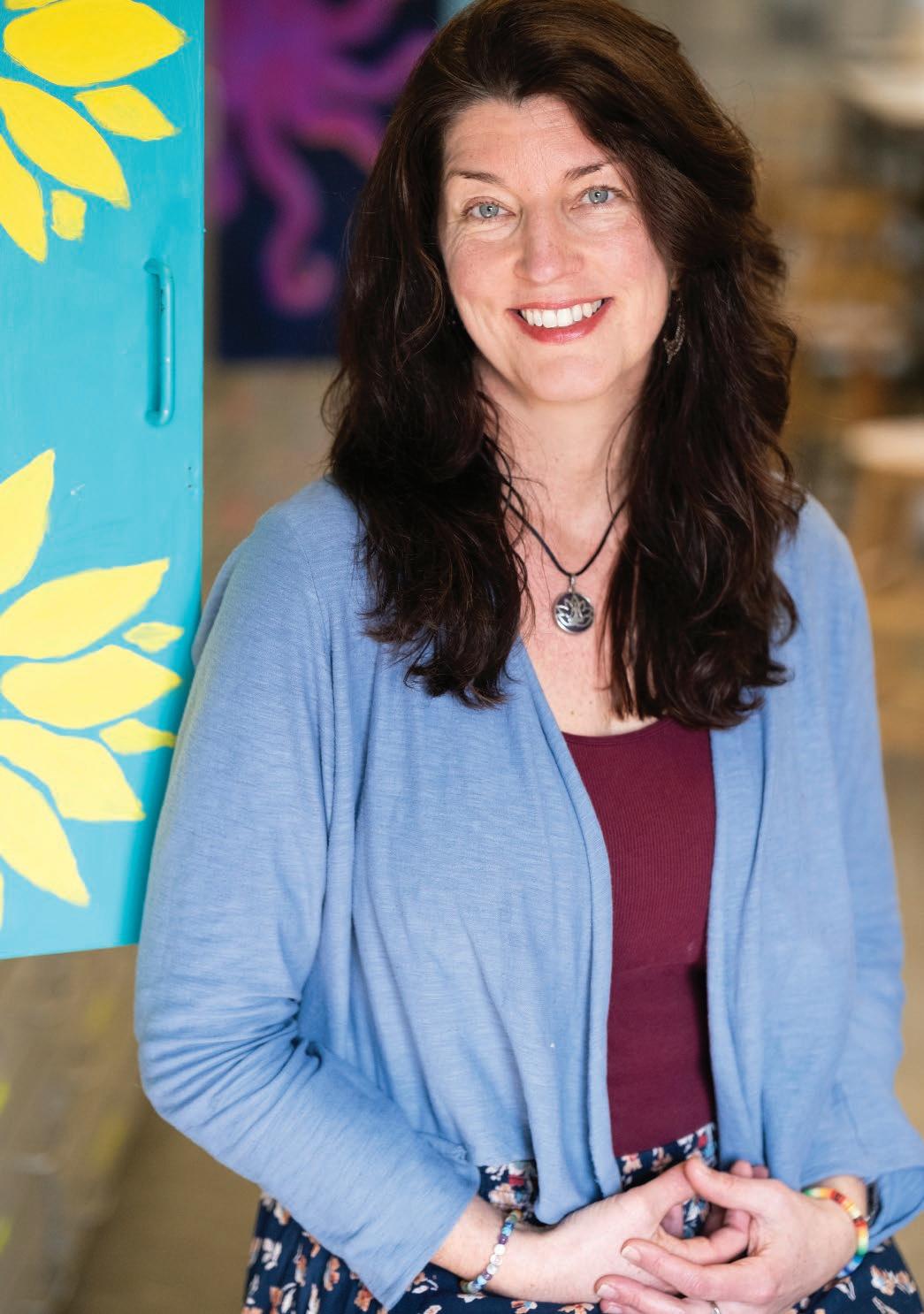
Zhang ’24. Each performance required hours of patience, practice and collaboration.
Beyond the studio and stage, the department creates opportunities for cross-curricular experiences, combining art with language and science studies. Students in the science department’s anatomy classes work in the art studio, drawing the human body to understand anatomical proportions and the musculoskeletal system. Humanities courses offer projects that allow students to demonstrate their learning through a variety of creative options.
Most importantly, at Westminster, the arts are for everyone, regardless of talent or ability. Teachers meet students where they are in their artistic evolution. The journey can lead to a greater sense of well-being. In “Your Brain on Art,” authors Ivy Ross and Susan Magsamen write, “The science of neuroaesthetics offers proof of how our brains and bodies are transformed when we participate in the arts and aesthetic experience. This knowledge can improve our physical and mental health, help us learn and flourish, amplify innovation, and build stronger communities.”
Practicing art in any form — music, singing, dancing, painting, sculpture or crafting — can lead to positive outcomes. But it is not solely the process of creating art that is beneficial; creativity also touches the hearts and minds of people beyond the classroom.
This year, for example, the visual and performing arts students designed and created T-shirts for Dr. Martin Luther King Day and for a fundraiser for Hartford’s Gaylord Wolfpack, a sled hockey team for players with physical limitations. They also partnered with the Chatmandu Project to share their artwork with youngsters at The Children’s Home in Nepal.
In a world that feels increasingly divided, our students’ creativity helps unite our community and connects us to people and places beyond the Hill.
John S. Armour ’76
Emeritus Palos Verdes, Calif.
Elisabeth M. Armstrong P’04, ’06, ’07 Emerita Dallas, Texas
Jeffrey H. Artis ’72 Alpharetta, Ga.
Stephen W. Bailey ’89, P’21 McLean, Va.
Elisabeth Gailun Baird ’98, P’26, ’26 New Canaan, Conn.
William L. Beckford ’89, P’23 Baltimore, Md.
Christopher J. Campbell ’91, P’24 London, U.K.
Renée Lynch Carrel ’84, P’19, ’21 Chair of the Board Boston, Mass.
Lisa Cavazuti ’08 Ex officio New York, N.Y.
John H. Davis P’05
Emeritus Tequesta, Fla.
Harvey C. DeMovick III ’90, P’24, ’26 Westerly, R.I.
S. Colin Dowling P’24, ’27 Indian River Shores, Fla.
William C. Egan III ’64, P’92, ’95, ’00, ’02 Emeritus Jackson, Wyo.
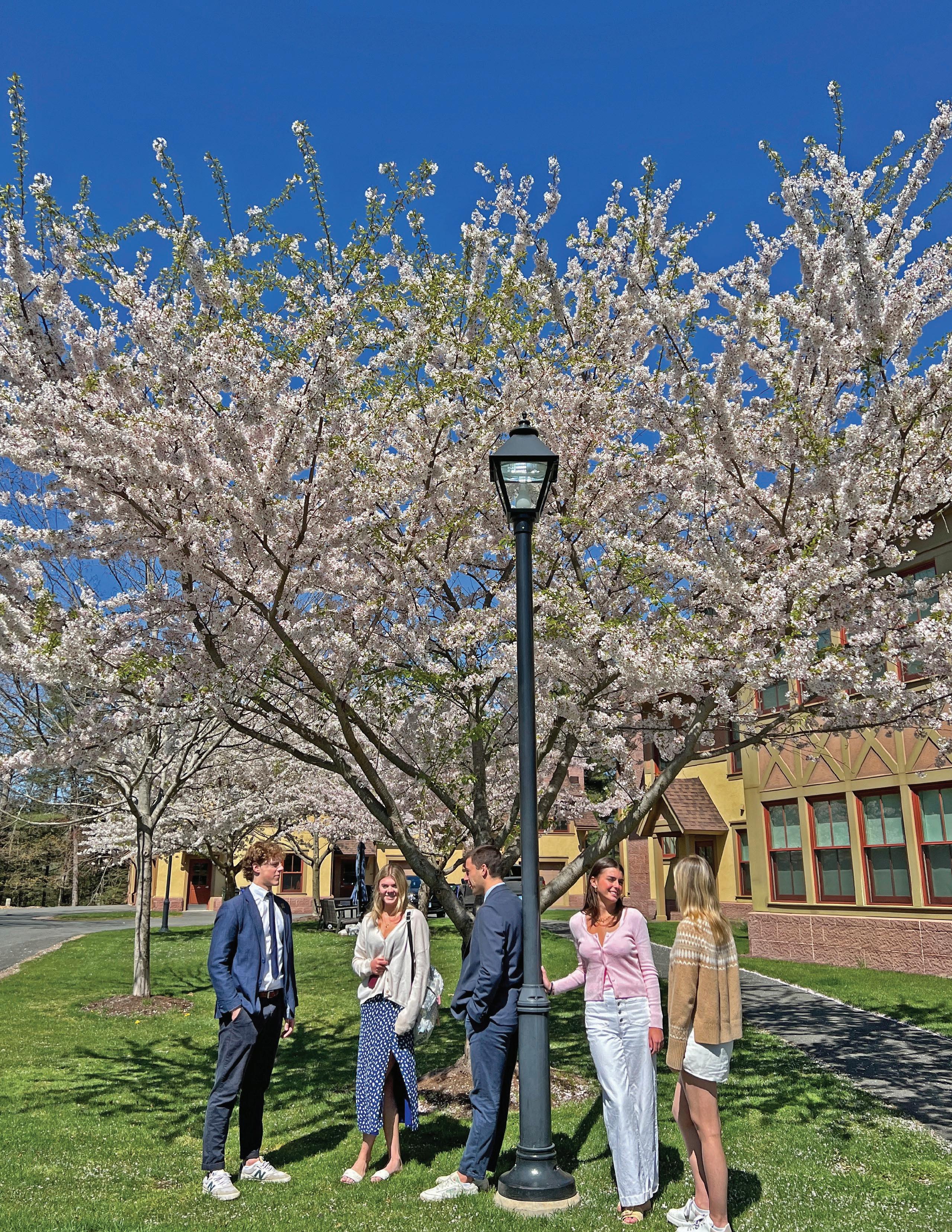
Contact Information:
Admissions: (860) 408-3060
Head of School: (860) 408-3012 Advancement: (860) 408-3722
Joseph L. Gitterman III ’55, P’86, ’86, ’90, GP’24 Emeritus Washington Depot, Conn.
Eunice J. Han ’84, P’21 Harrison, N.Y.
Powell W. Holly III ’82 Fredericksburg, Va.
Martin R. Irani ’83 Encino, Calif.
Katherine B. Kelter ’14 Bozeman, Mont.
David W. Kistler ’87, P’22 Tiburon, Calif.
Shannon Lanzone P’25 Lafayette, Calif.
Philip Lauderdale ’02 Greenwich, Conn.
Bryan R. Martin ’86 Larchmont, N.Y.
Suzanne N. Melan ’90 Ex officio Dunwoody, Ga.
T. Treadway Mink Jr. ’77, P’11 Emeritus Greenville, S.C.
Ian M. Morton ’87, P’22 West Hartford, Vt.
Moyahoena Ogilvie ’86 Emerita Bloomfield, Conn.
Mary Minns Peck ’90 Denver, Colo.
C. Bradford Raymond ’85, P’19, ’20, ’24, ’24 Emeritus New York, N.Y.
Elizabeth Grant Schroeder ’84, P’10, ’14 Ex officio Dayton, Ohio.
Gary L. Simpson P’24 Water Mill, N.Y.
Helen Lin Sun P’24 Wanchai, Hong Kong
Samuel Thorne ’46, P’74, ’76 Emeritus Bedford, Mass.
Kirsten Sichler Webb ’98 Greenwich, Conn.
Elaine White Ex officio Simsbury, Conn.
Sara L. Whiteley ’91 West Chatham, Mass.
Benjamin D. Williams IV ’81 Absarokee, Mont.
Benjamin W. Wurts P’22, ’24 Ex officio
Stanfordville, N.Y.
Julie B. Wurts P’22, ’24 Ex officio
Stanfordville, N.Y.
Director of Marketing and Communications Jeff Kennard
Photography Seshu Badrinath, Wendy Carlson and Henry Flaton ’25
Design
John Johnson Art Direction & Design Riverton, Conn.
www.Westminster-School.org
